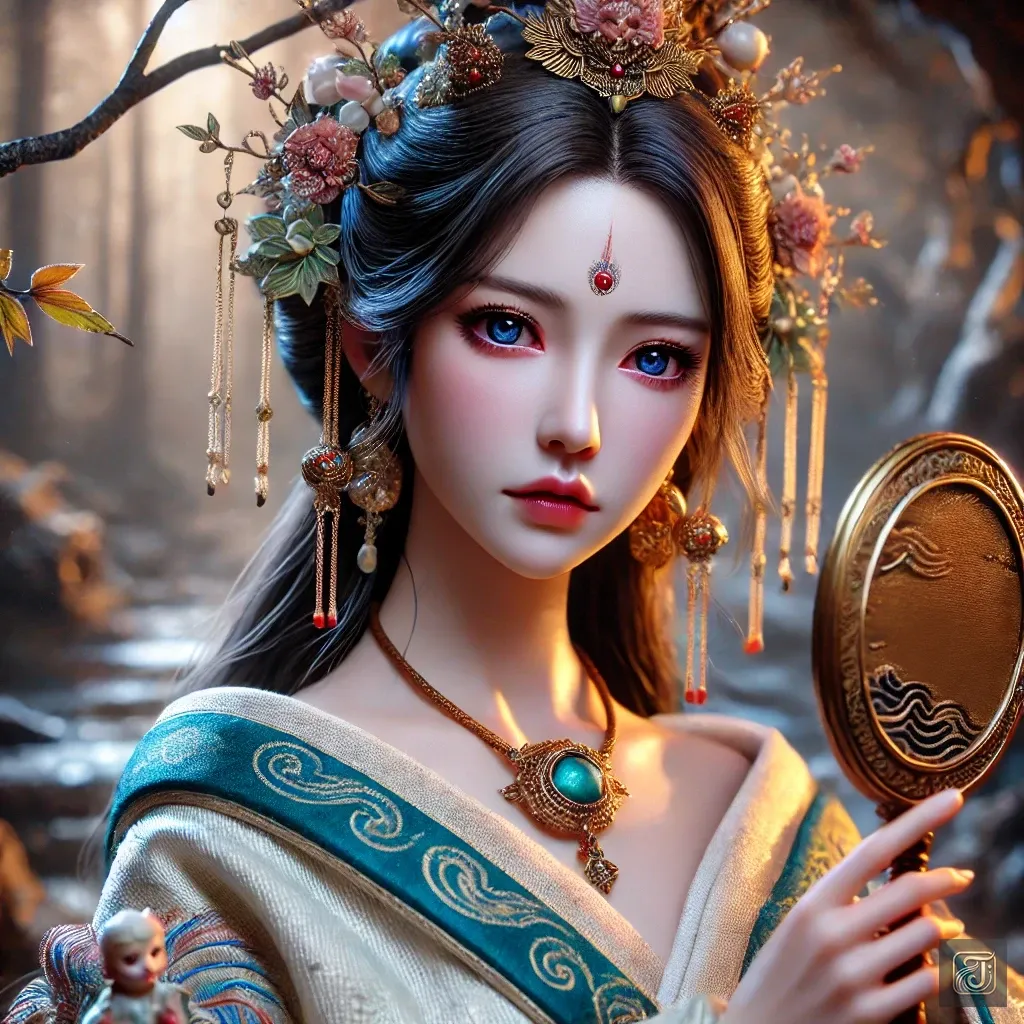
Prologue: Himiko, the Queen Who Led the Wa Kingdom
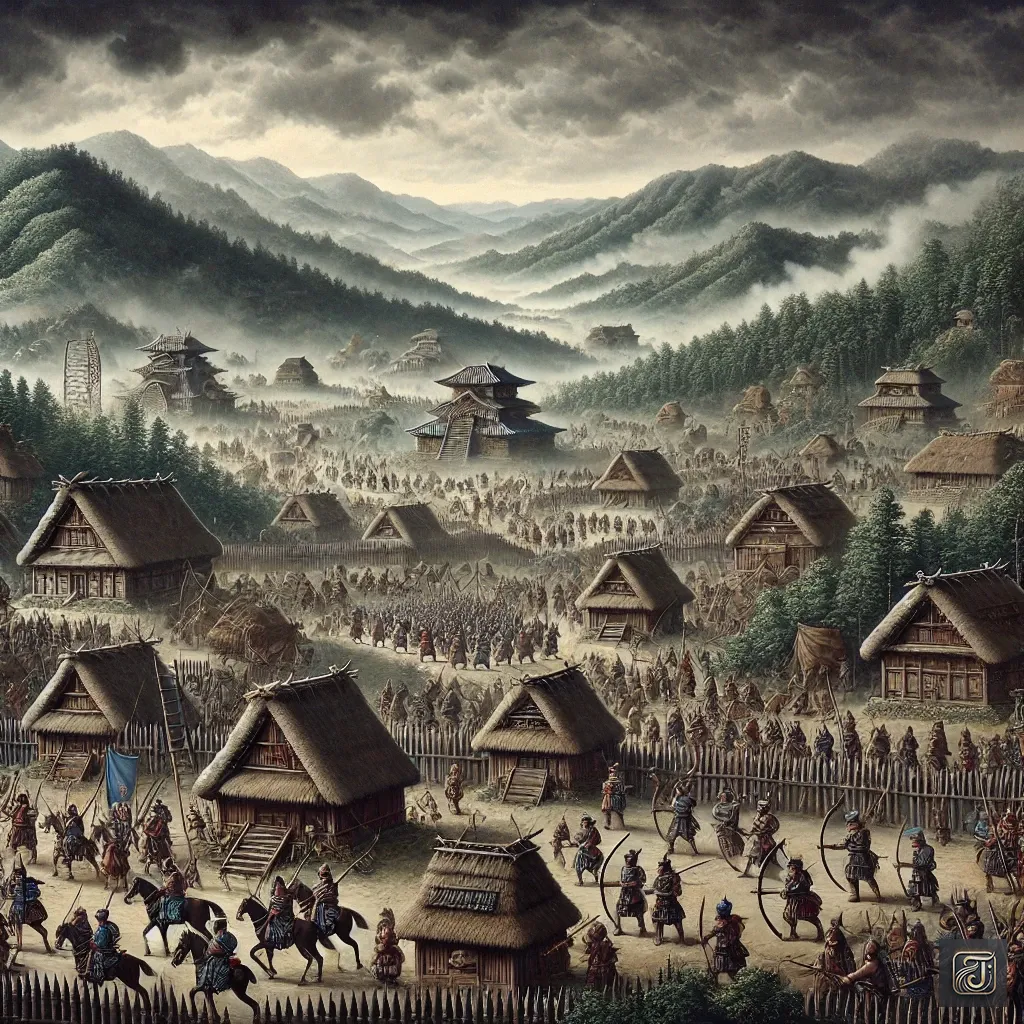
In the 3rd century, ancient Japan, known as Wa, was a land divided into over 30 small countries, engulfed in constant strife during a period known as the “Great Wa Disturbance.”
Amid this chaos, a shamaness with the power to hear the voices of the gods emerged—Himiko.
She became the queen of Yamatai, a prominent kingdom of the time, and brought an end to the conflicts by divining the will of the gods.
Rather than engaging directly in politics, Himiko entrusted the practical administration of the kingdom to her younger brother, ensuring stability throughout her reign.
She also fostered diplomatic ties with the powerful Wei dynasty of mainland China, earning the title “Queen of Wa, Friendly to Wei,” and laying the foundation for peaceful relations with neighboring countries.
Himiko’s reign brought peace and hope to a people long tormented by conflict.
This story delves into how she guided her nation and how her legacy was passed down through generations.
Chapter 1: Himiko’s Childhood (Late 2nd Century to Early 3rd Century)
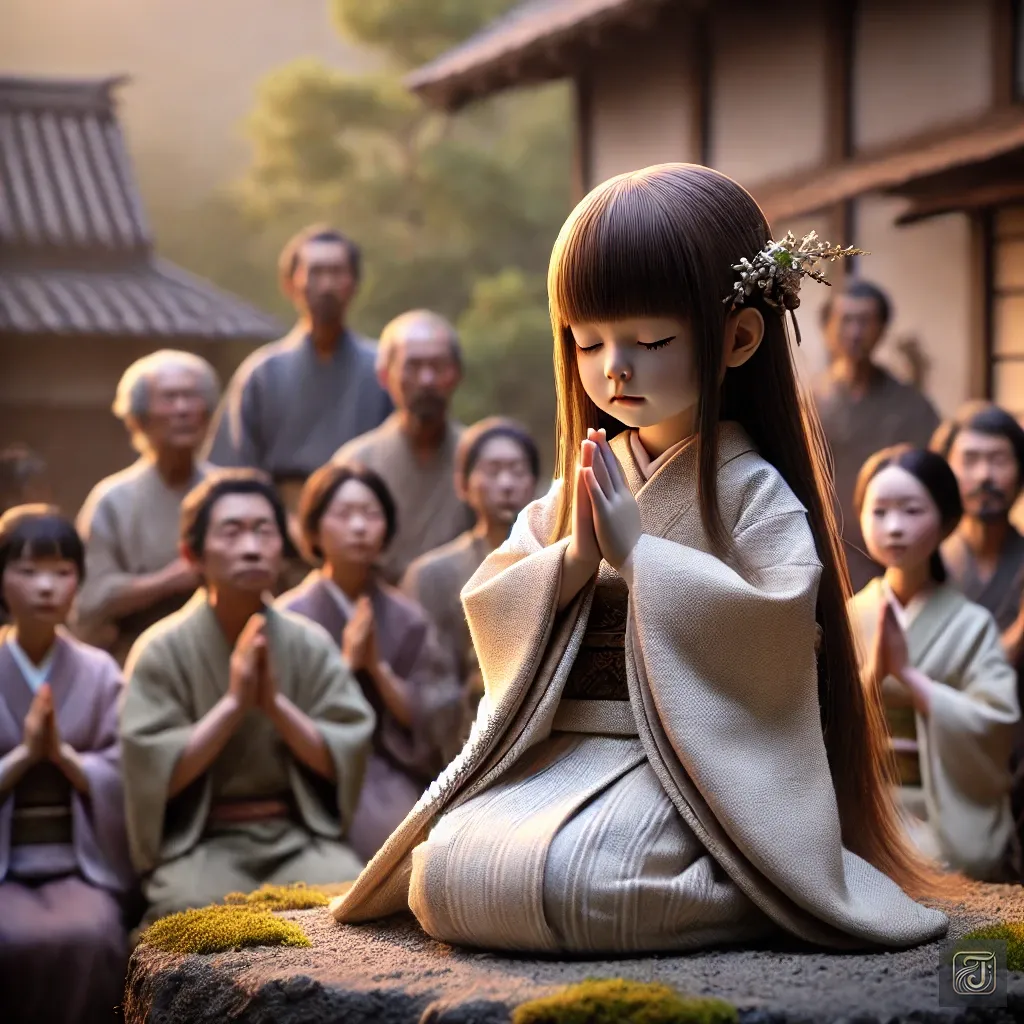
Under the watchful eyes of the villagers, a small girl sat quietly on a large rock,
Her eyes closed in deep prayer.
Her name was Himiko.
It was said that whenever she sensed something, miracles would occur in the village.
One day, an elderly shaman approached Himiko and spoke to her in a calm, gentle voice.
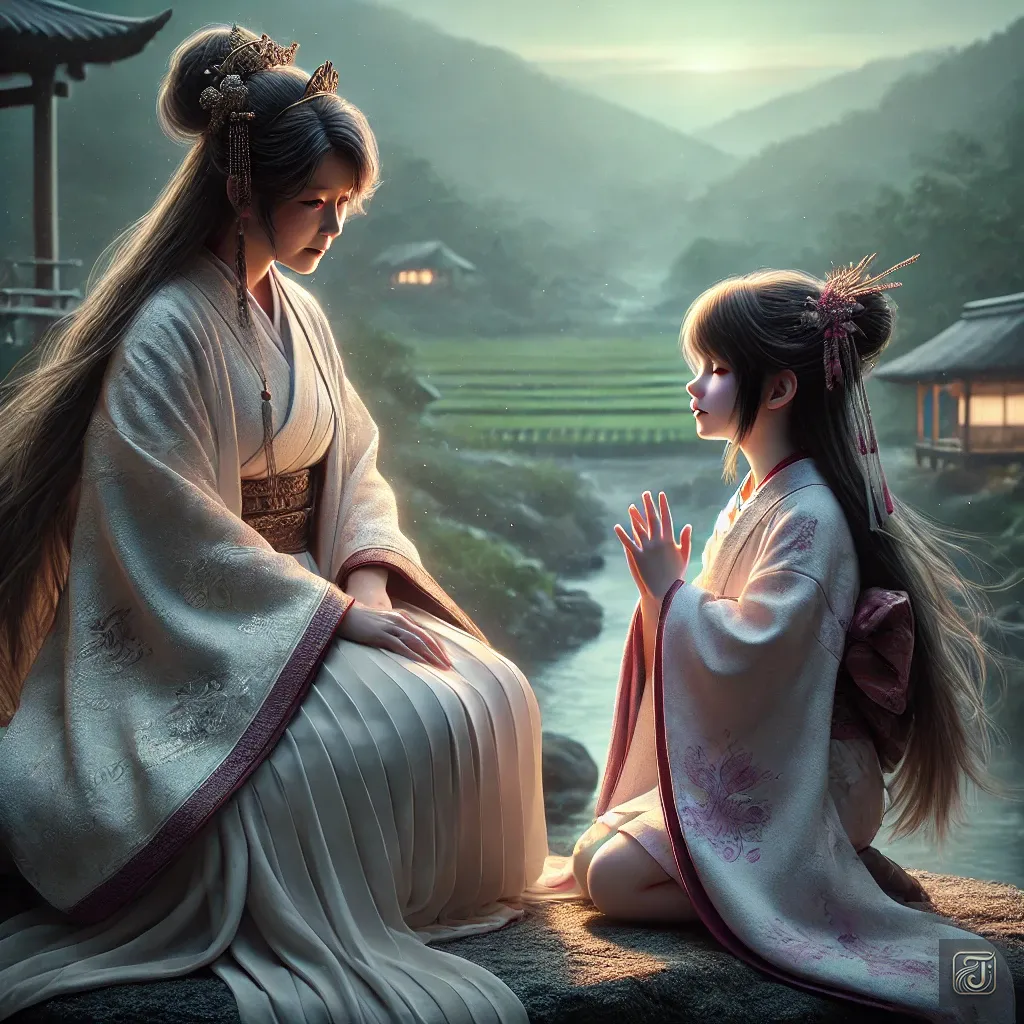
Elderly shaman:
“Himiko, can you hear the voice of the gods?”
Himiko:
“Yes. The gods say they will bring rain to the village.”
“By tomorrow morning, the rice fields will be filled with water.”
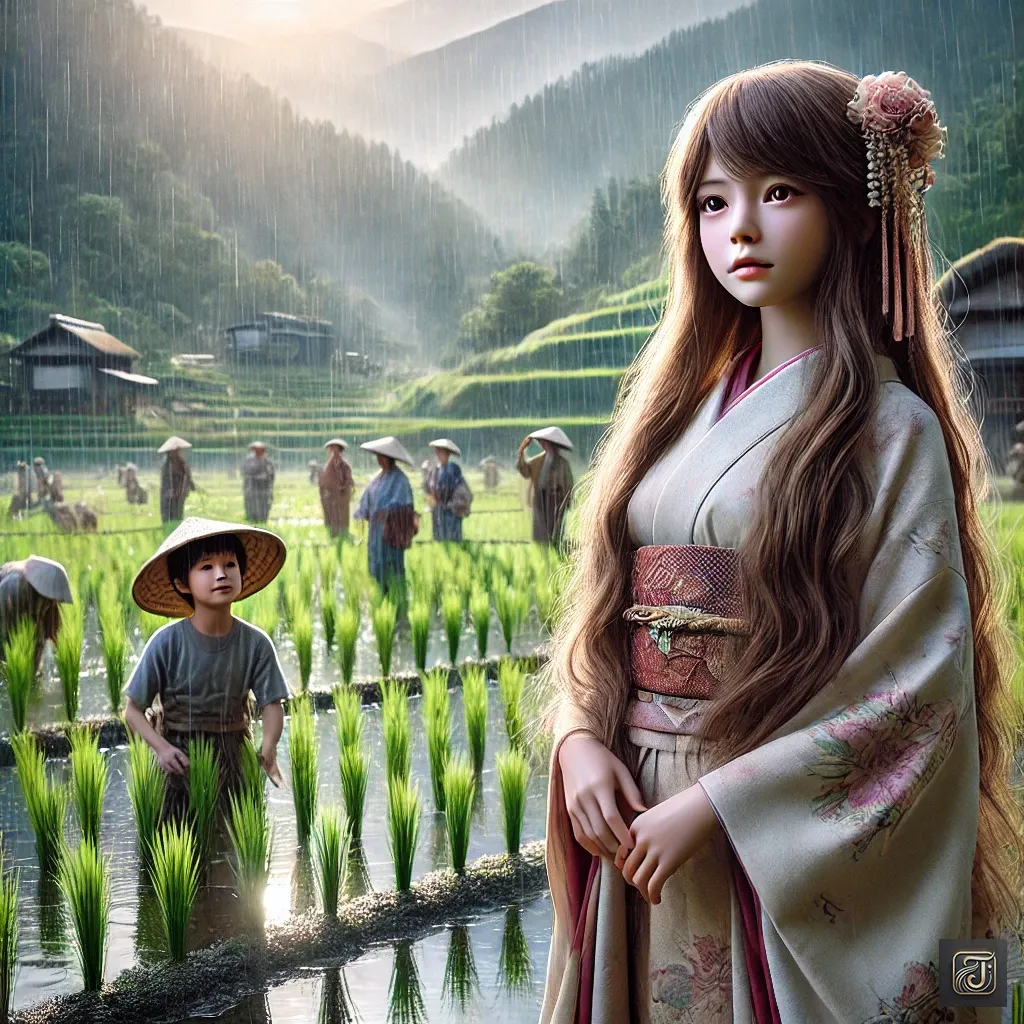
The next morning, rain truly began to pour, soaking the parched rice fields.
The villagers came to revere Himiko as a “child chosen by the gods.”
However, Himiko avoided interaction with others, choosing solitude instead.
Only her younger brother stayed by her side, quietly understanding the loneliness she bore.
Summary As a child, Himiko was a mysterious girl revered by the villagers for her ability to hear the gods’ voices, yet she had a solitary nature.
Her younger brother was her only source of emotional support.
Chapter 2: When the Voice of the Gods Speaks

The villagers gazed up at the night sky.
Dark clouds hung heavy, and lightning sharply tore through the air.
That summer, the village had been suffering from an unrelenting drought.
The rice fields had dried up, the wells had run dry, and food supplies in the homes were nearing depletion.
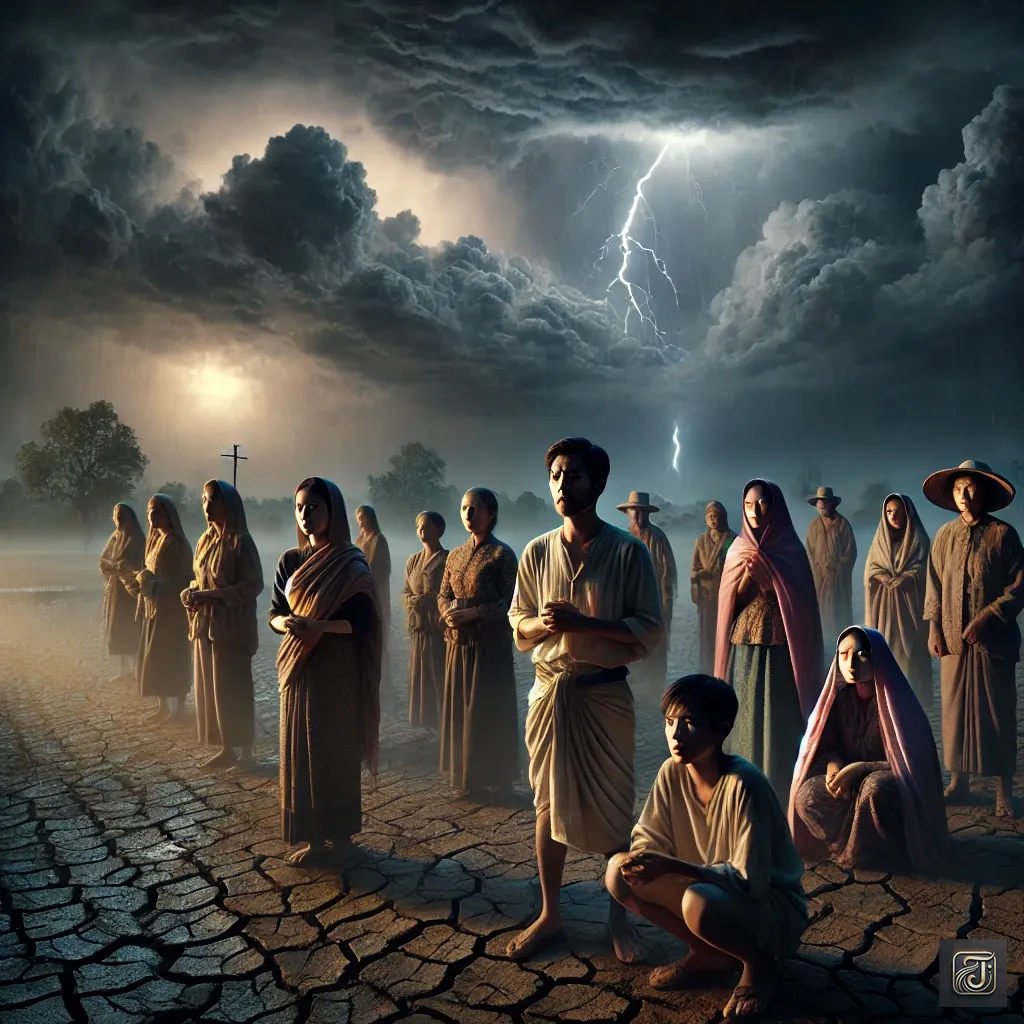
Villagers:
“At this rate, our village will perish…”
The village elders, desperate for help, decided to seek out Himiko, who was rumored to hear the voice of the gods.
They found the young Himiko meditating quietly on the rocky outskirts of the village.
One of the elders bowed deeply and spoke.
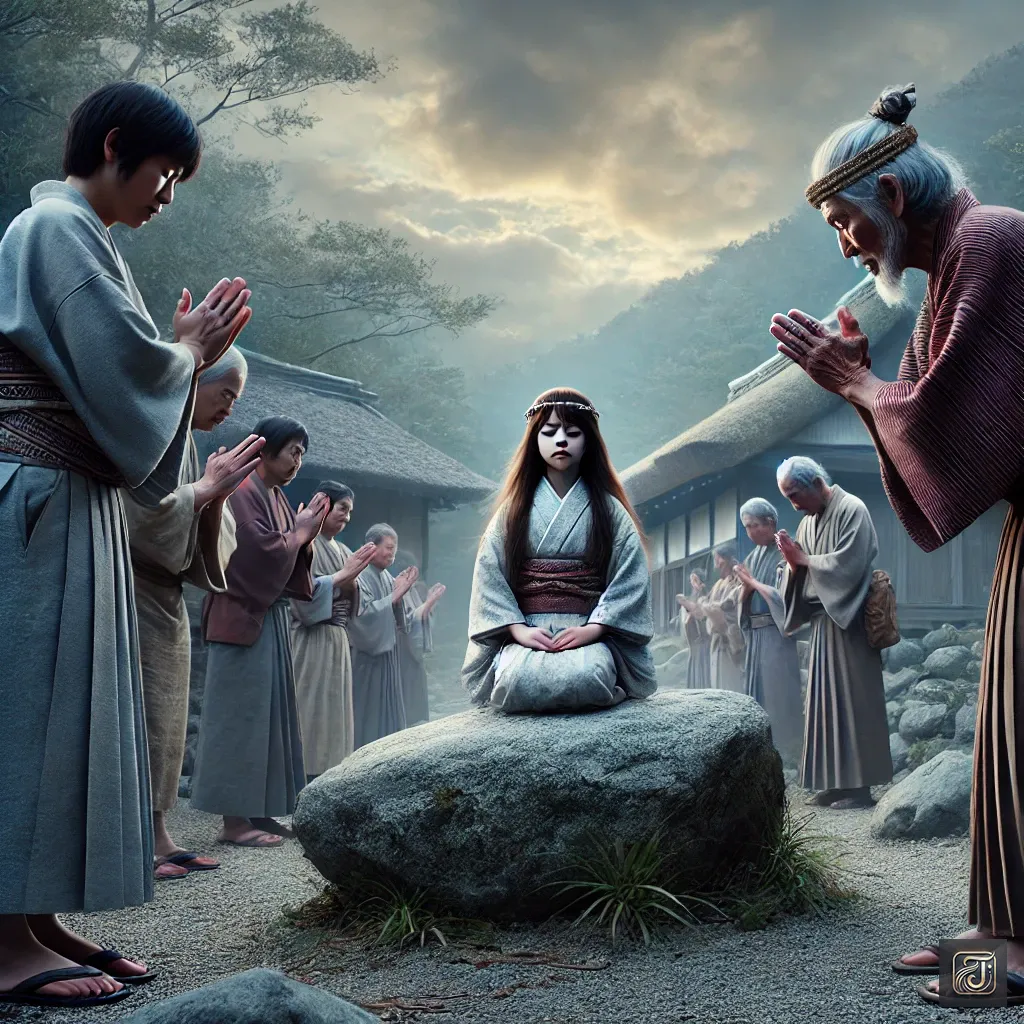
One of the elders:
“Lady Himiko, please, hear the gods for us. Could you ask them to show us a way to save our village?”
Himiko quietly nodded, her eyes still closed, and replied in a soft voice.
Himiko:
“The gods are angry.”
“It is because conflict has grown in this land, and the people have forgotten application.”
Summary Himiko conveyed the gods’ message to save the village from its crisis, earning the trust of the elders.
The entire village came to revere her as a being chosen by the gods.
Chapter 3: Proof of Divine Power
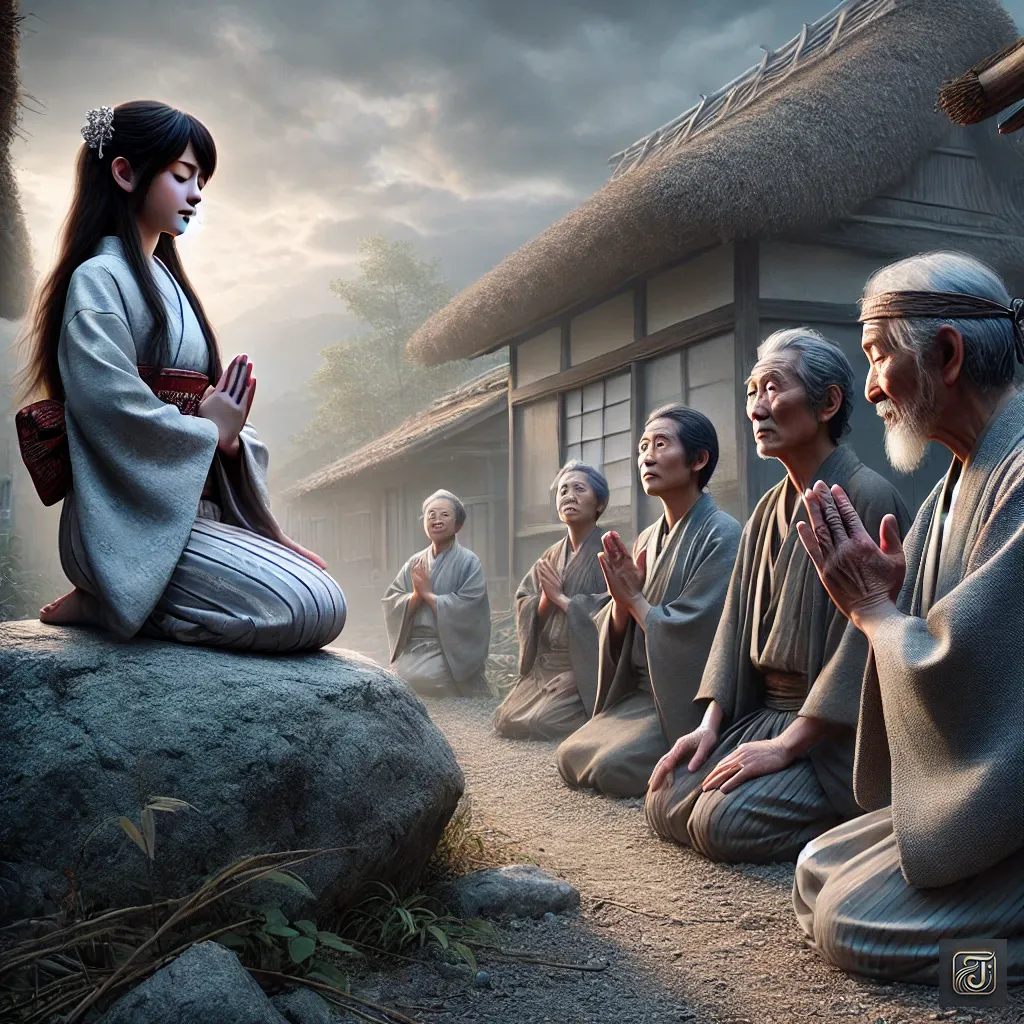
The villagers held their breath in anticipation.
Though bewildered, the elders listened intently to Himiko’s words.
One of the elders:
“Then, what must we do?”
Himiko slowly stood up and pointed toward the mountains.
Himiko:
“Tomorrow morning, have all the villagers gather at the mountain’s summit and offer prayers to the gods.”
“And then, give a portion of your harvest to those in need.”
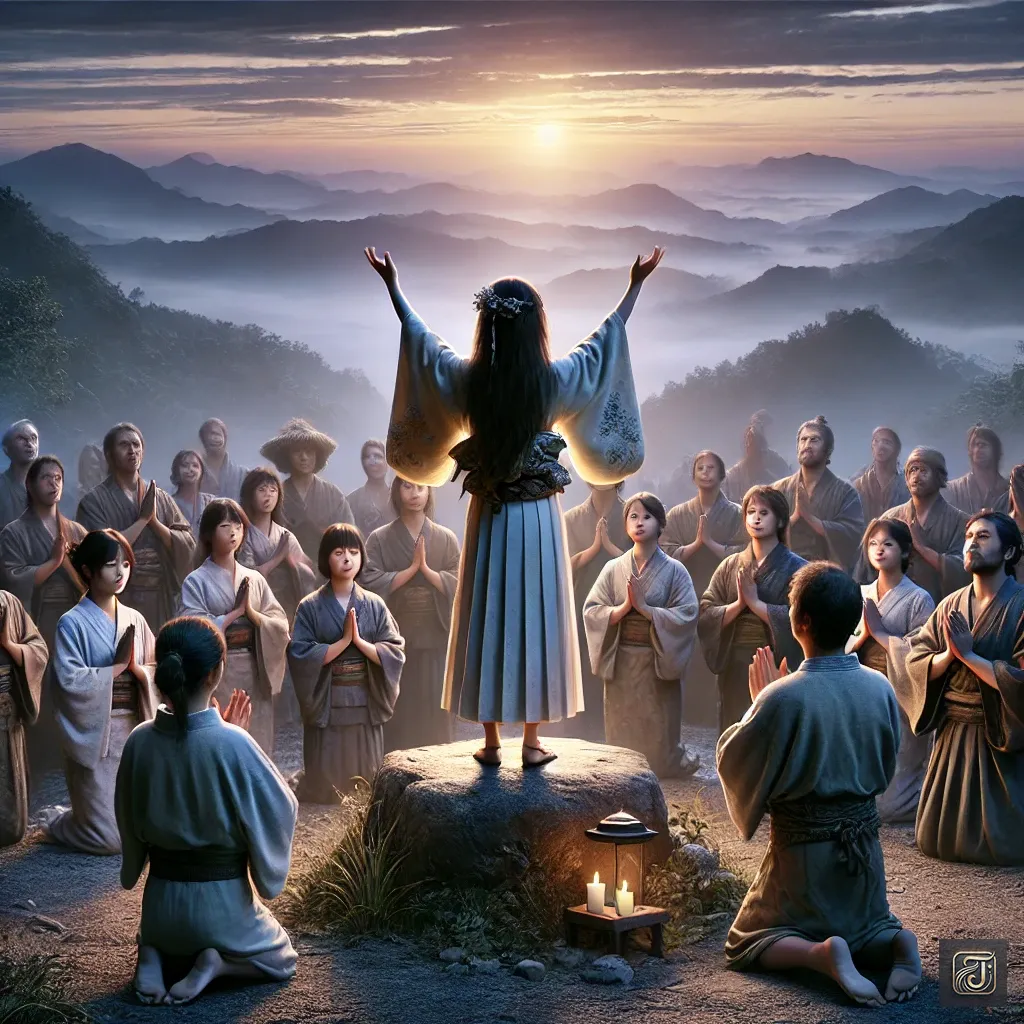
Though skeptical, the villagers gathered at the mountain’s summit the next morning.
Himiko stood atop a large stone, raised her hands to the sky, and recited words of prayer.
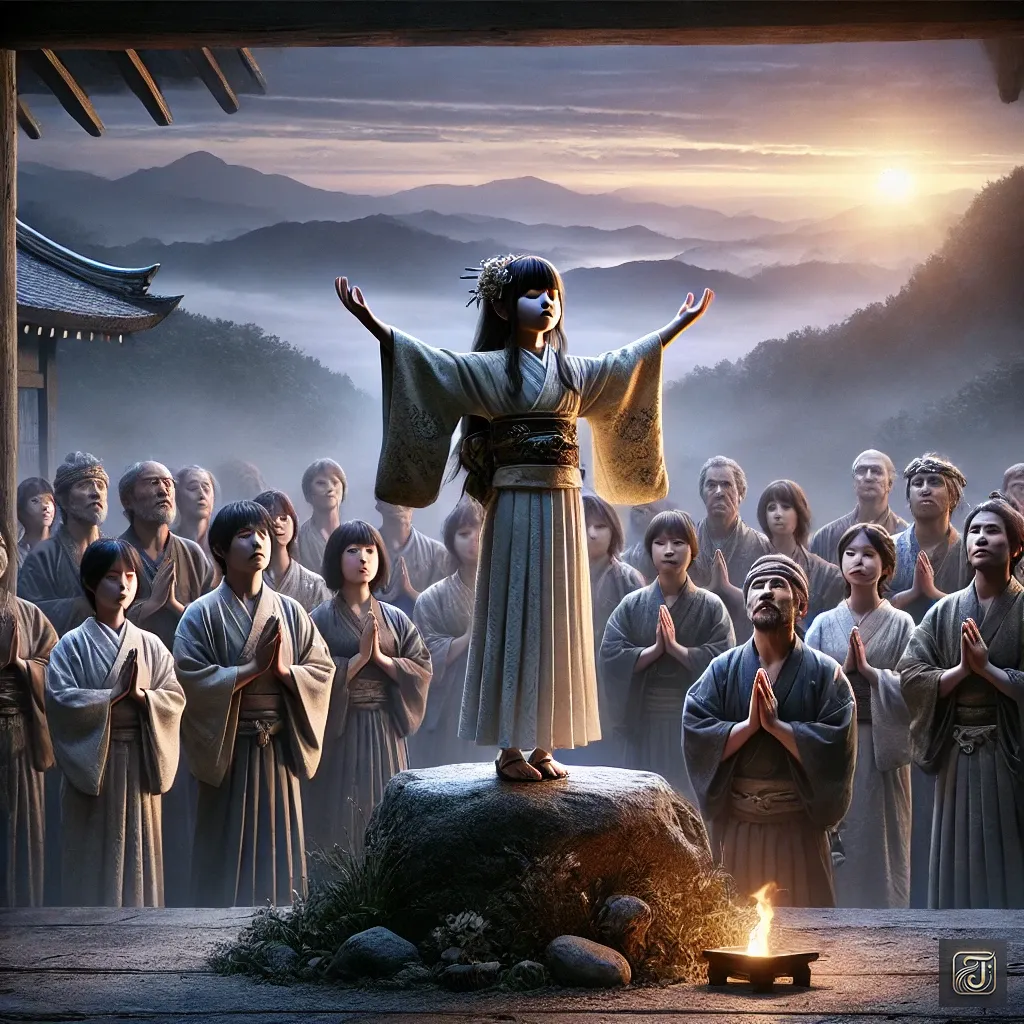
Her voice carried on the wind, echoing across the surroundings.
At that moment, something extraordinary happened.
The sky suddenly darkened, thunder roared, and raindrops began to fall.
The villagers were astonished and soon erupted in cheers as a heavy rain poured down.
The once-parched rice fields were filled with water, and the village wells began to flow again.
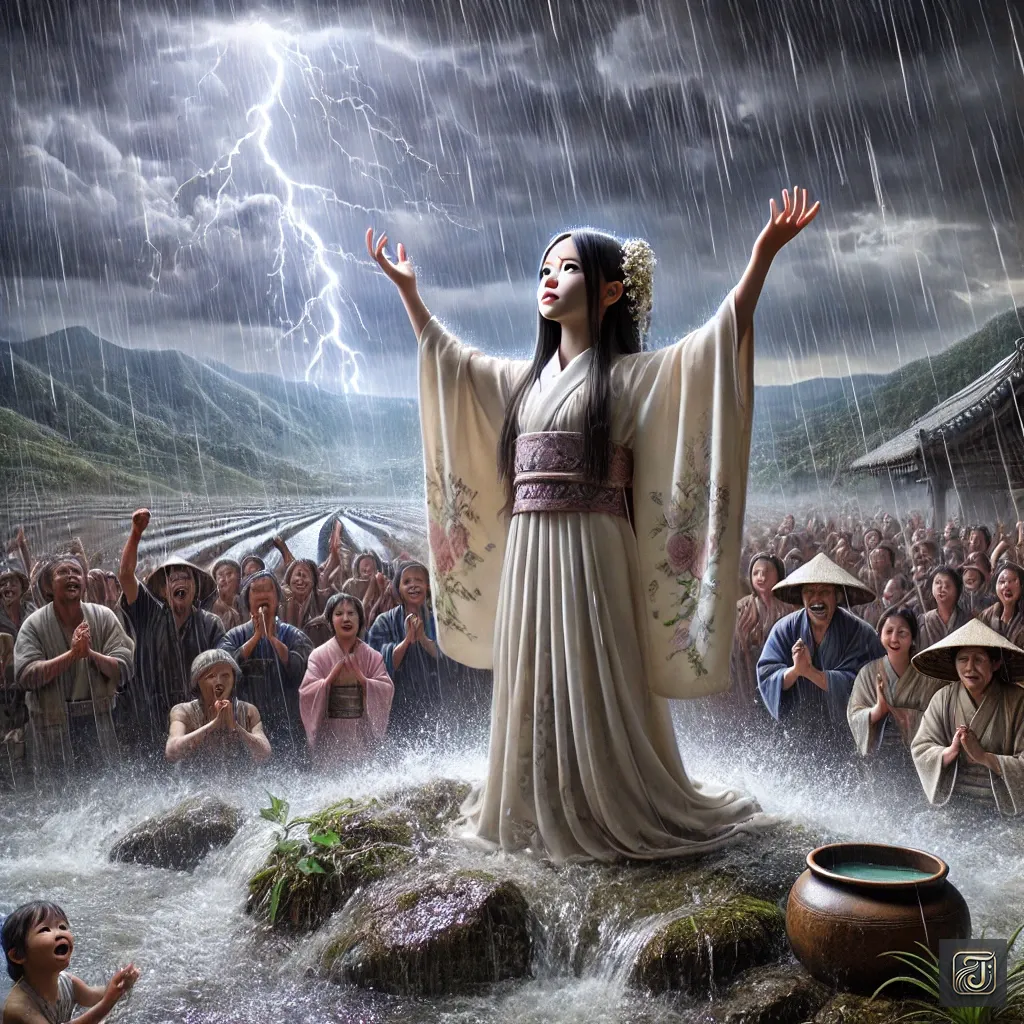
Villagers:
“It’s Lady Himiko’s power!”
The villagers knelt on the spot, worshiping her as a messenger of the gods.
From then on, tales of Himiko hearing the voice of the gods, predicting natural phenomena, and saving the village spread throughout the land of Yamatai.
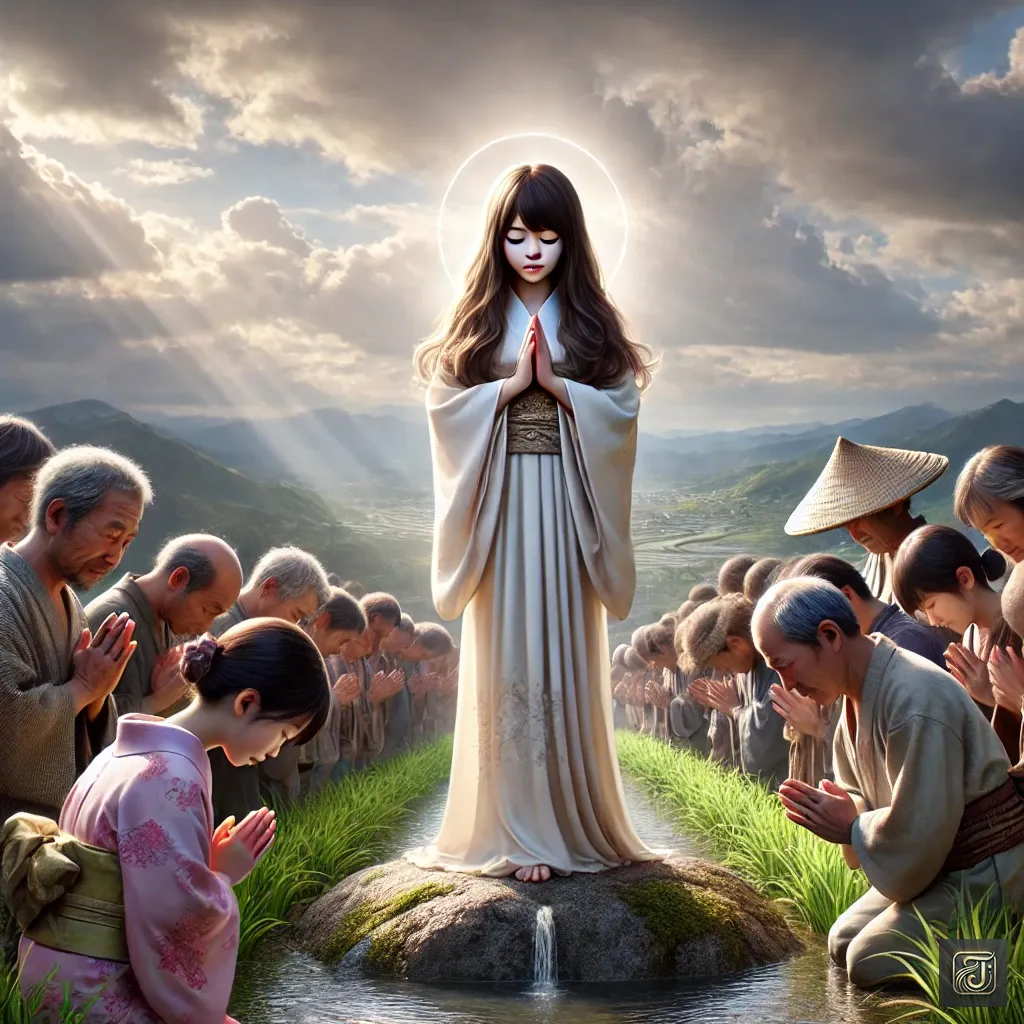
Himiko continued to pray silently, allowing no one to approach her.
The villagers were filled with awe at the sight of her.
Her very presence became a bridge connecting the gods and the people.
Summary By conveying the voice of the gods and miraculously bringing rain, Himiko earned the villagers’ trust.
Her power and name soon became renowned throughout the entire land of Yamatai.
Chapter 4: The Chaos of the Wa Kingdom (Early 3rd Century)
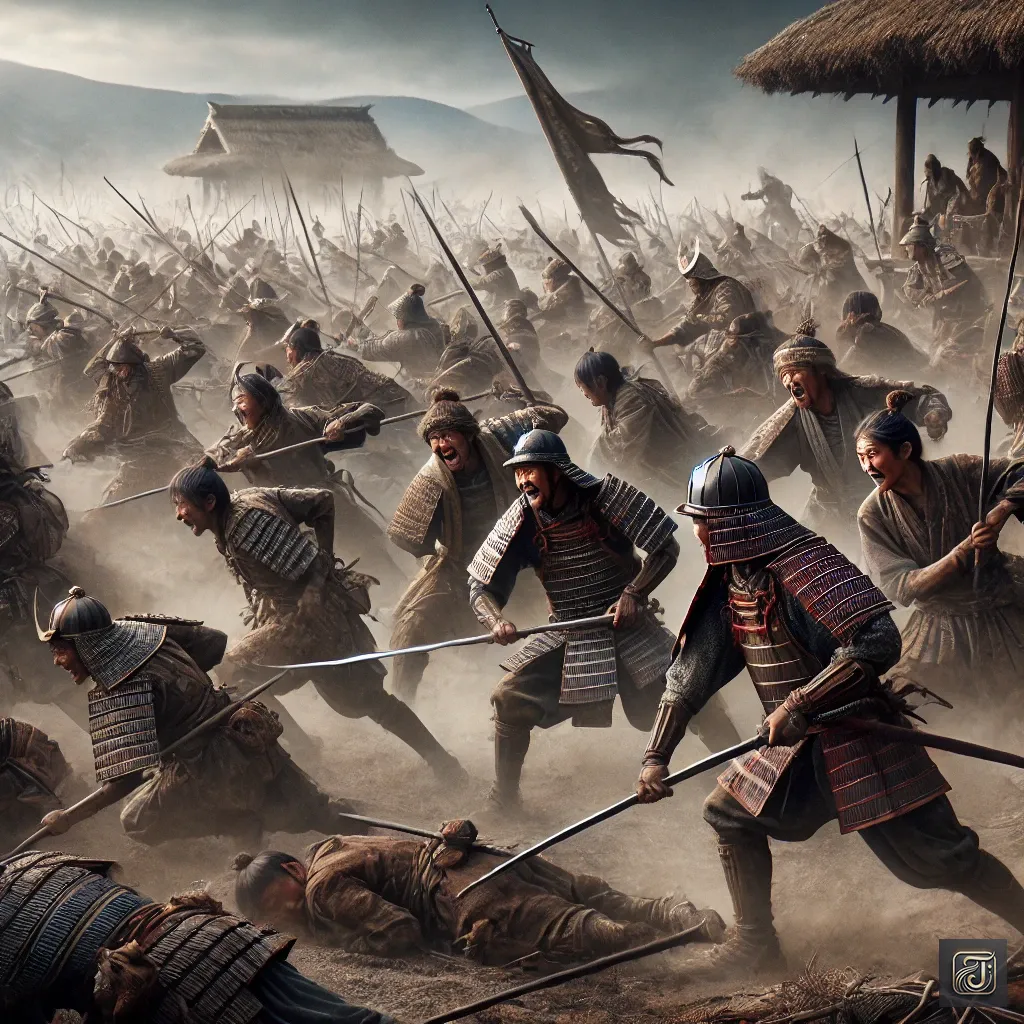
Time passed, and the Wa Kingdom was plunged into chaos.
The land was divided among numerous small states, each vying to protect its own territory, leading to constant conflicts in a period known as the “Great Wa Disturbance.”
The prolonged civil strife caused lawlessness and instability to spread.
One day, intense fighting erupted in a village near Yamatai.
Two small states clashed over territorial disputes, and the sight of soldiers wielding weapons and shedding blood filled the land.
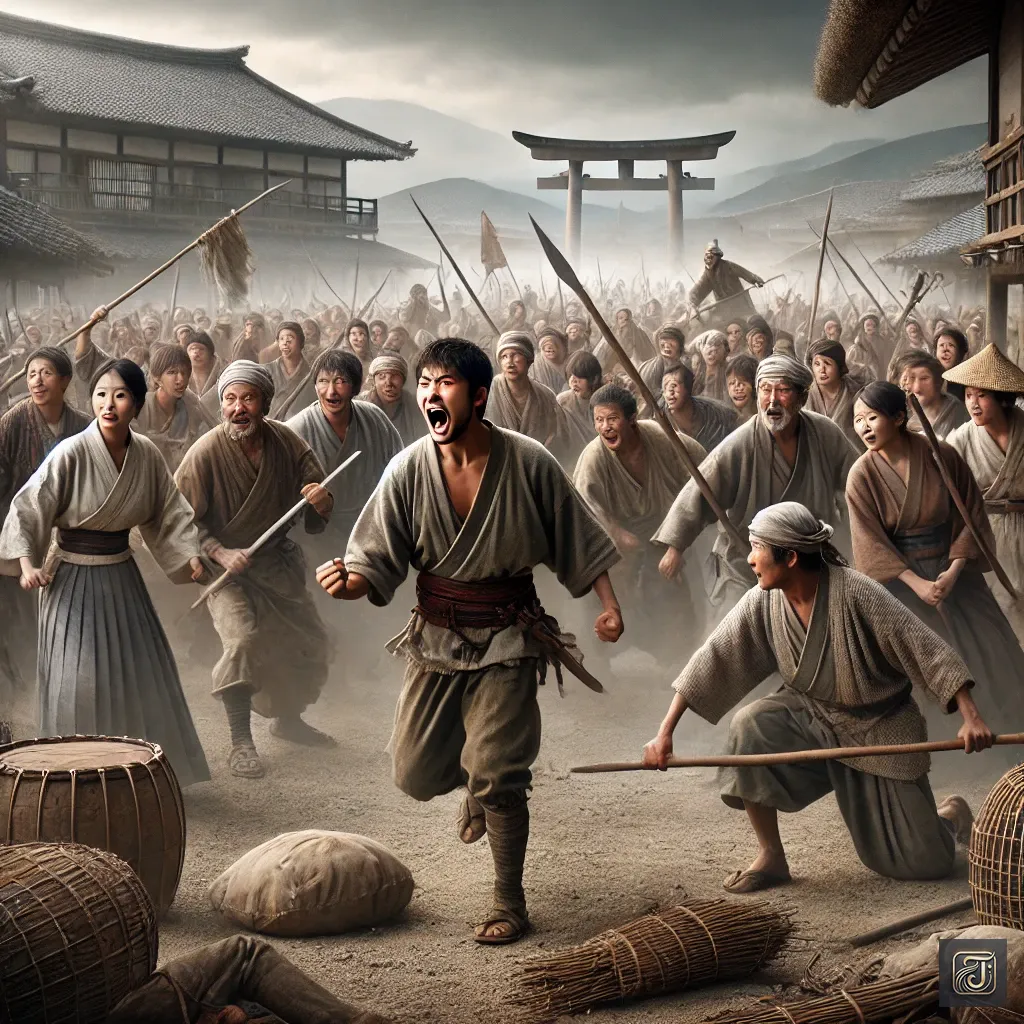
Villager :
“The enemy is coming! Everyone, grab your weapons!”
At the center of the village, a young man’s shout sent the villagers scrambling into action.
The men grabbed bows and spears, while the women and children fled into the mountains in search of hiding places.
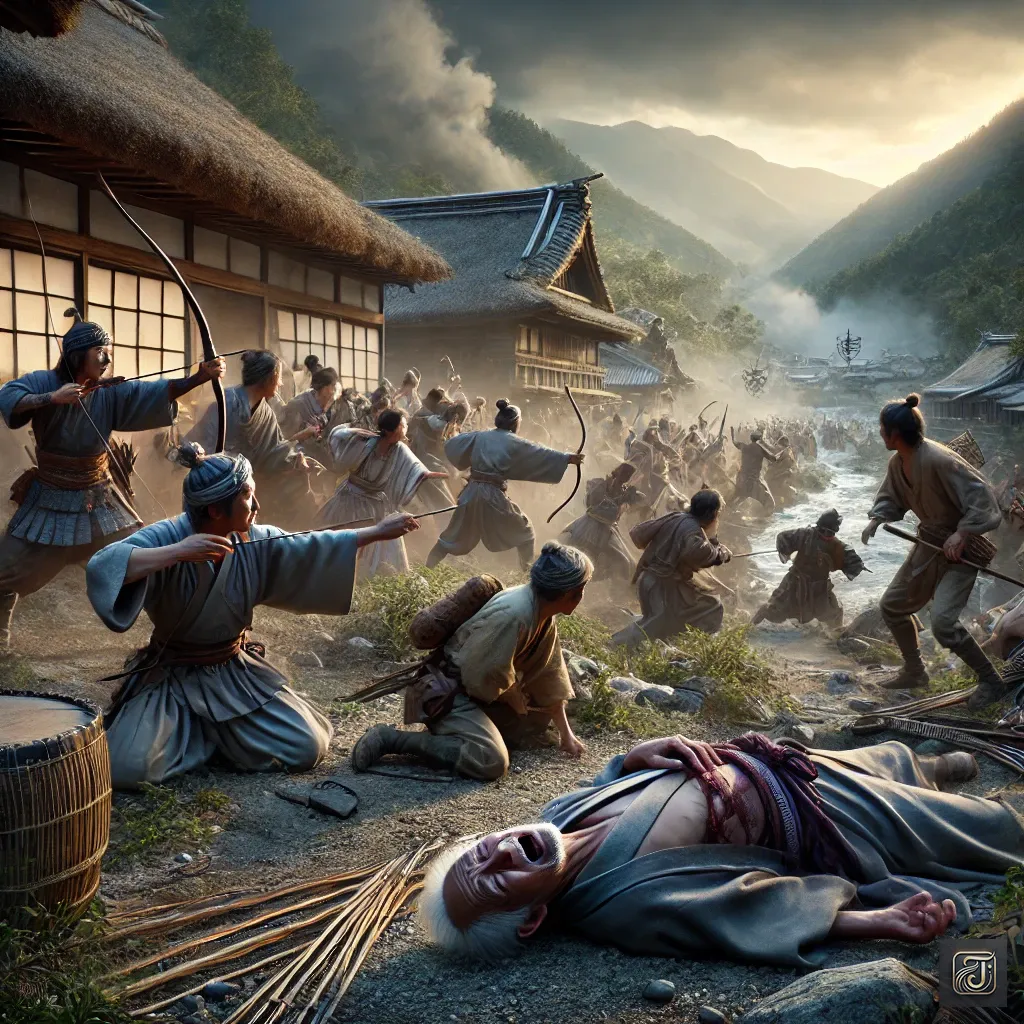
Villager:
“It’s over! We can’t defeat them!”
A wounded old man collapsed to the ground, looking up at the sky as he cried out.
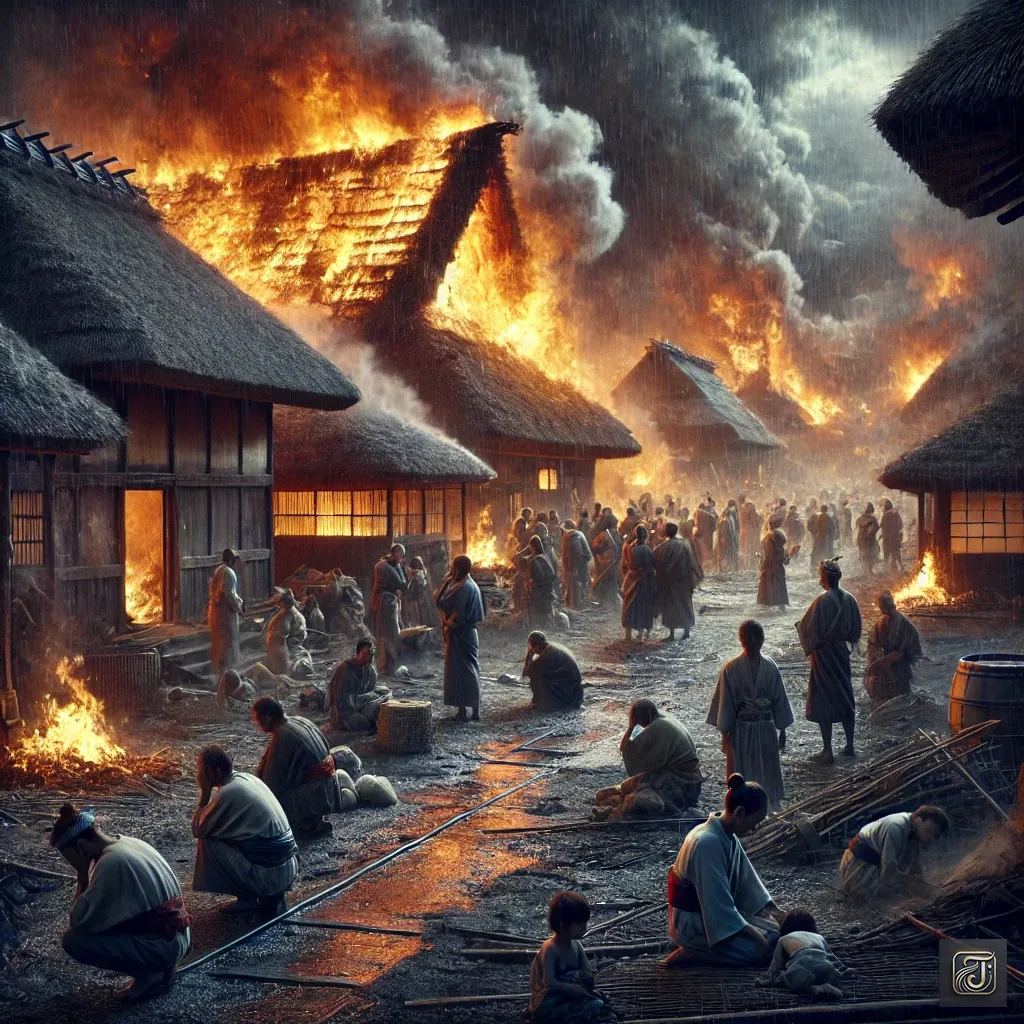
As the enemy forces set the village ablaze and the houses went up in flames,
The survivors huddled together, speaking through their tears.
Villagers:
“If this continues, our way of life will be completely destroyed.”
“Now that the king is gone, what will become of this land?”
“Someone must put an end to the fighting.”
Chapter 5: The Council of Elders
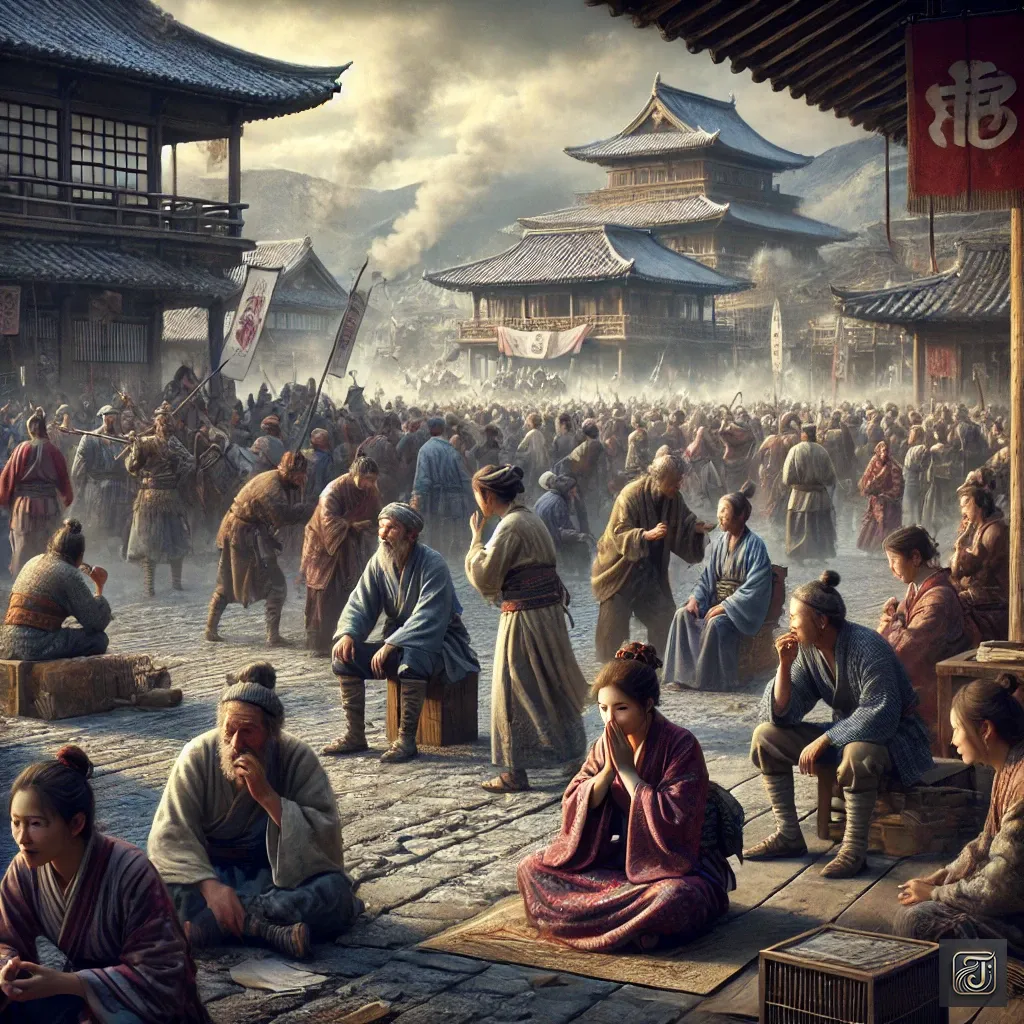
In the square of Yamatai, unease was etched on the faces of the people,
And rumors buzzed through the air.
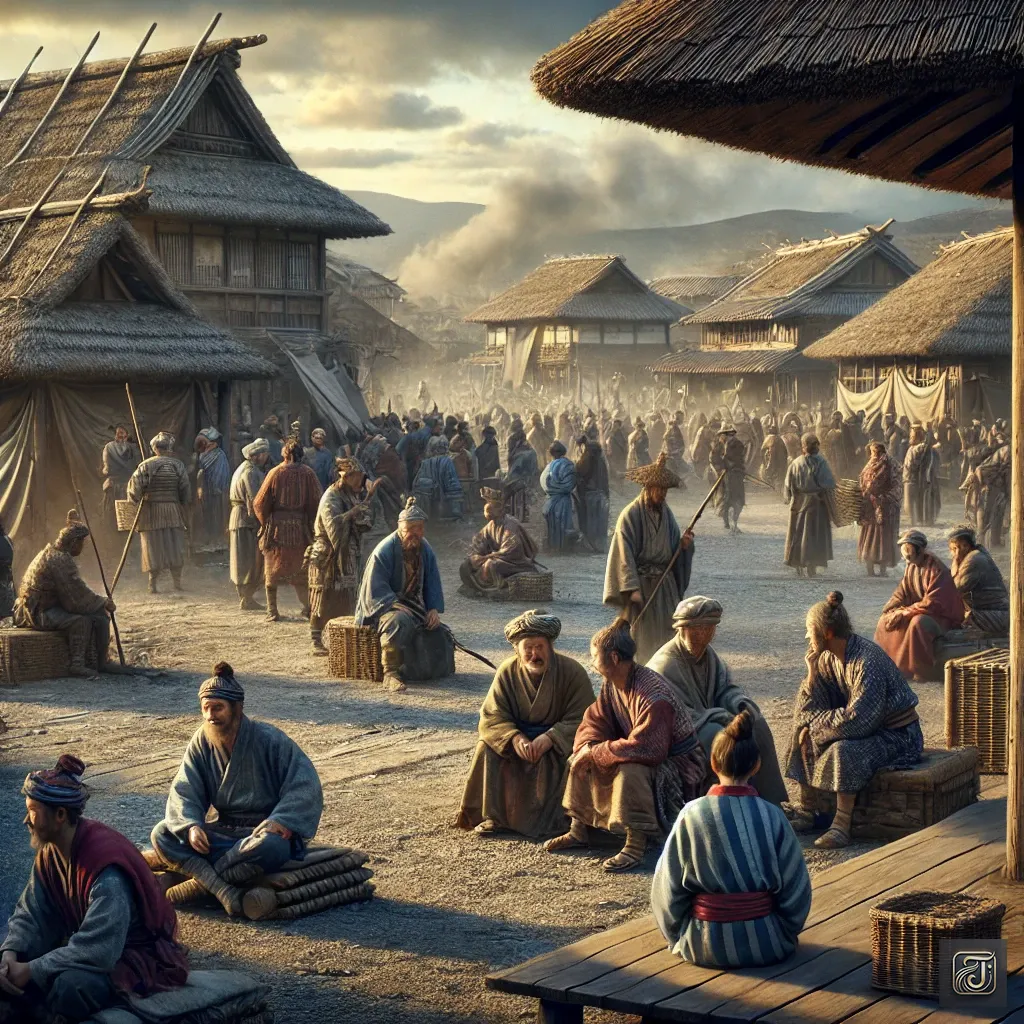
Villagers:
“Yesterday, there was another battle in the northern kingdom.”
“I heard many lives were lost.”
“Ever since the king passed away, it’s been nothing but chaos everywhere. What can we do?”
An elderly woman sitting in the corner of the village sighed as she spoke to a young man nearby.
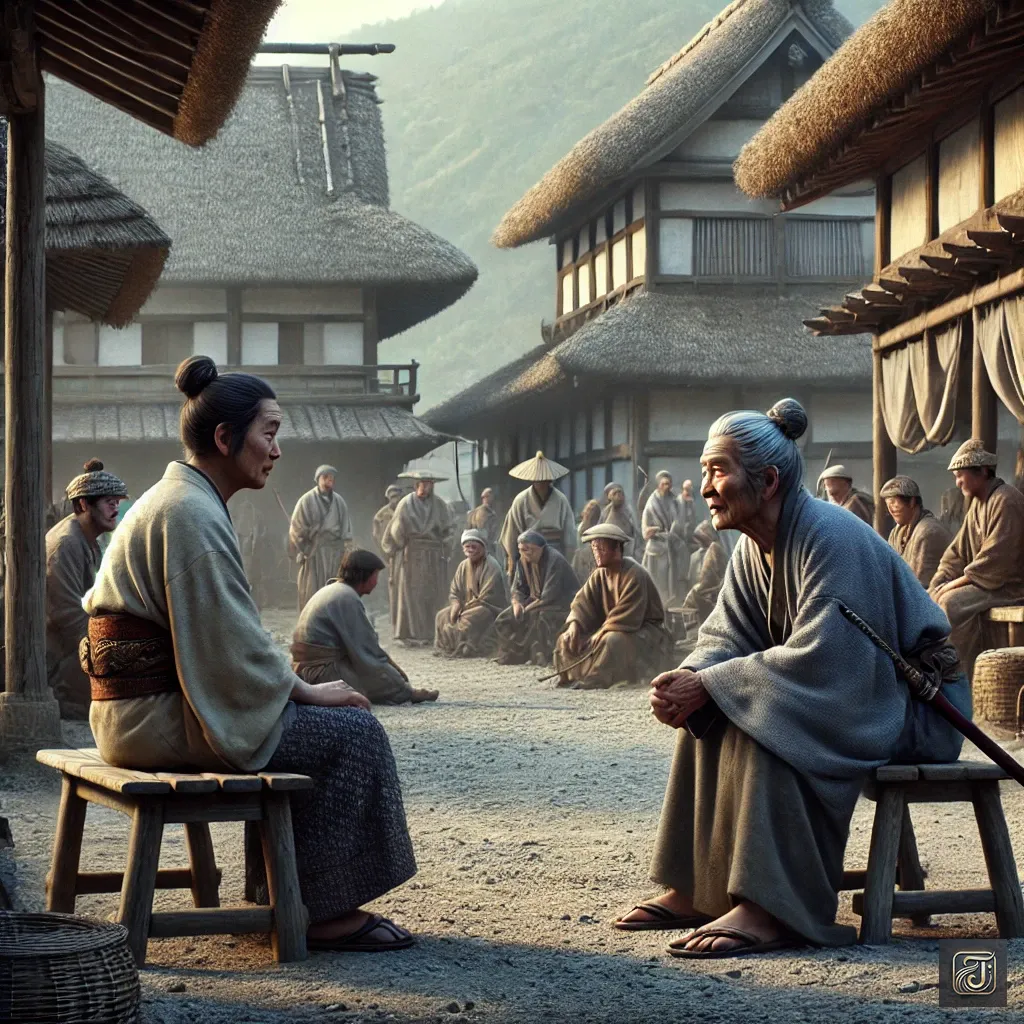
Villagers:
“How much longer can this go on?”
“With no king, it may only be a matter of time before Yamatai is dragged into the fighting as well.”
The clashes between soldiers and the turmoil in the villages began to ripple across the entire land.
There was no sign of the conflicts subsiding, and a deep sense of despair spread among the people.
After the king’s death, the Wa Kingdom entered a period ruled by successive “male kings.”
Although the land had never been fully unified, the rule of these male kings occasionally brought brief periods of peace.
However, that peace never lasted long.
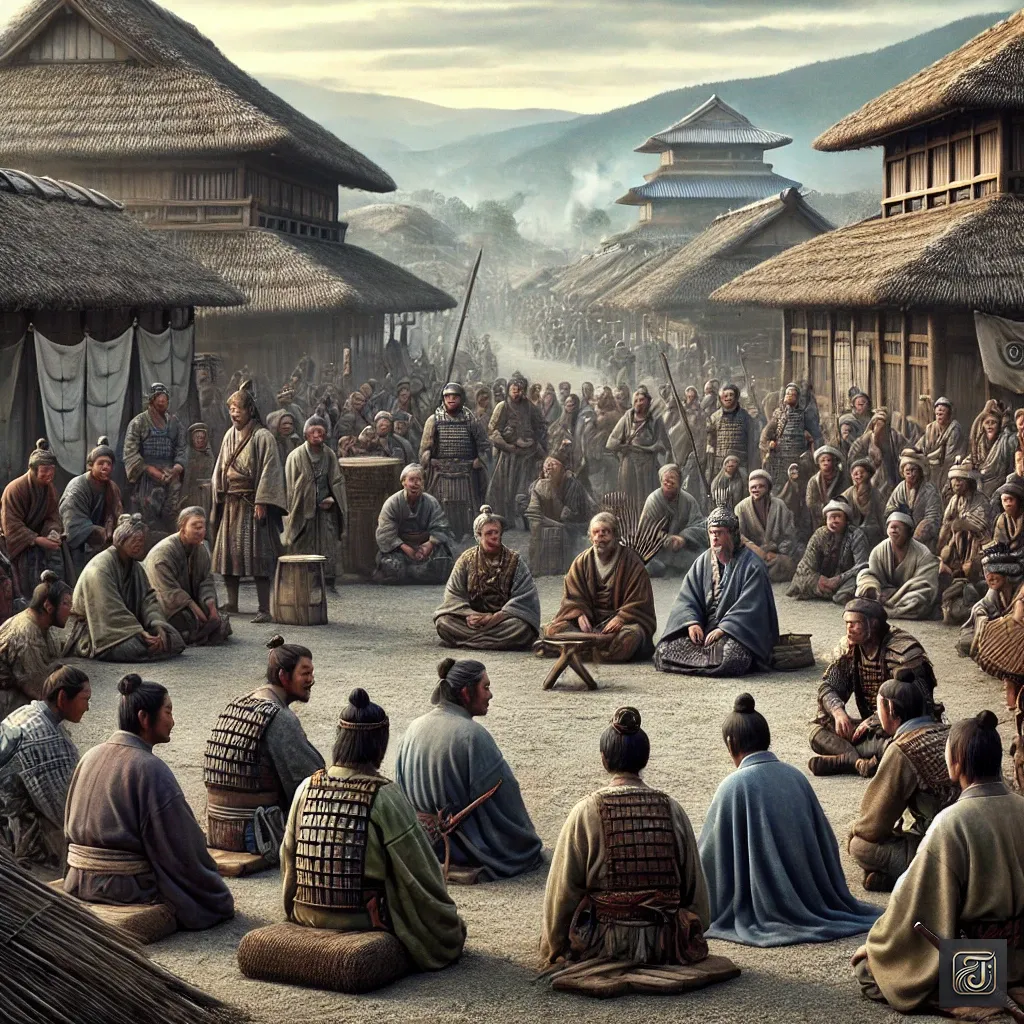
The elders resolved to take action to break the cycle of chaos.
Summary
Even in Yamatai, the turmoil spreading throughout the Wa Kingdom began to take its toll.
The people increasingly felt the need for a new ruler to restore peace.
Chapter 6: The Death of Yamatai’s King and the Chaos That Followed
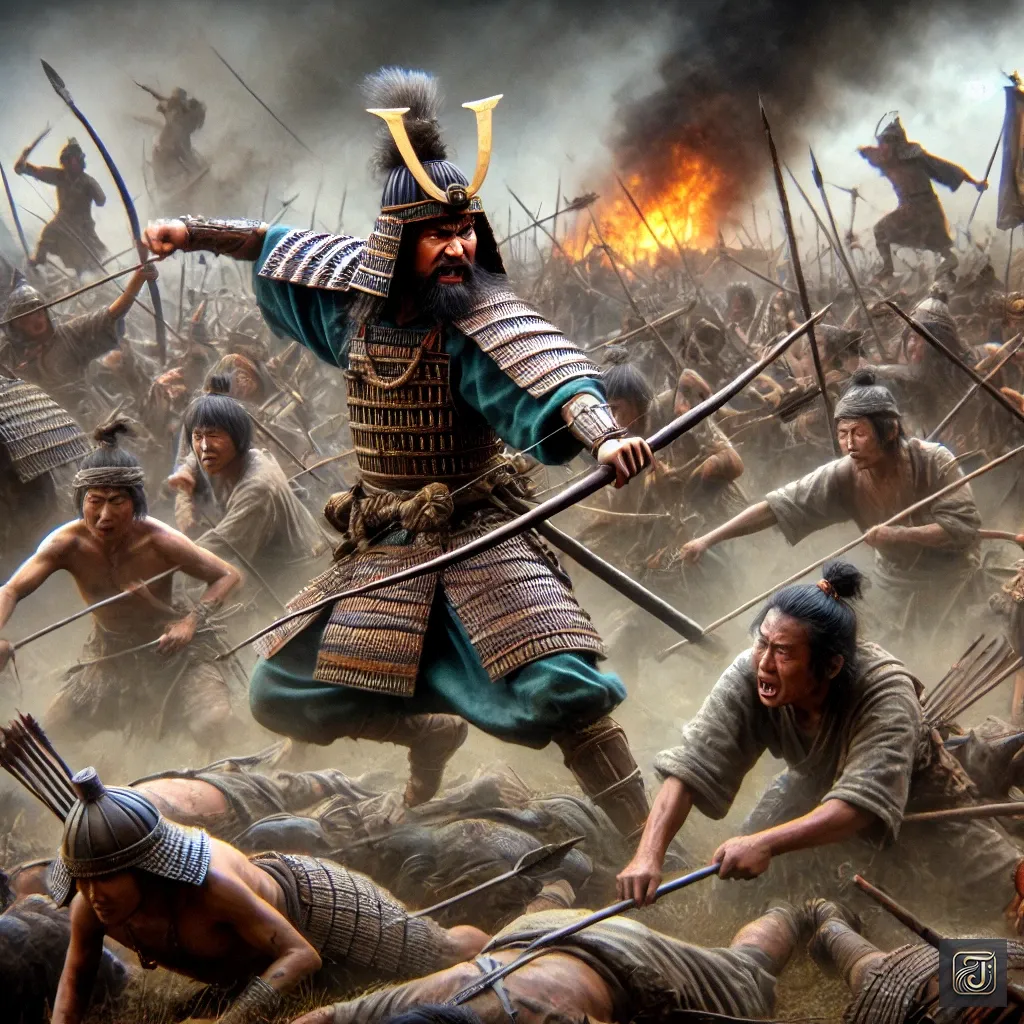
The king of Yamatai, like the rulers of other nations, lost his life amidst the ongoing conflicts.
On that fateful day, the king’s forces were surrounded by the neighboring nation’s army, and fierce battles erupted.
Amidst the whirling spears and flying arrows, the king fought valiantly on the front lines.
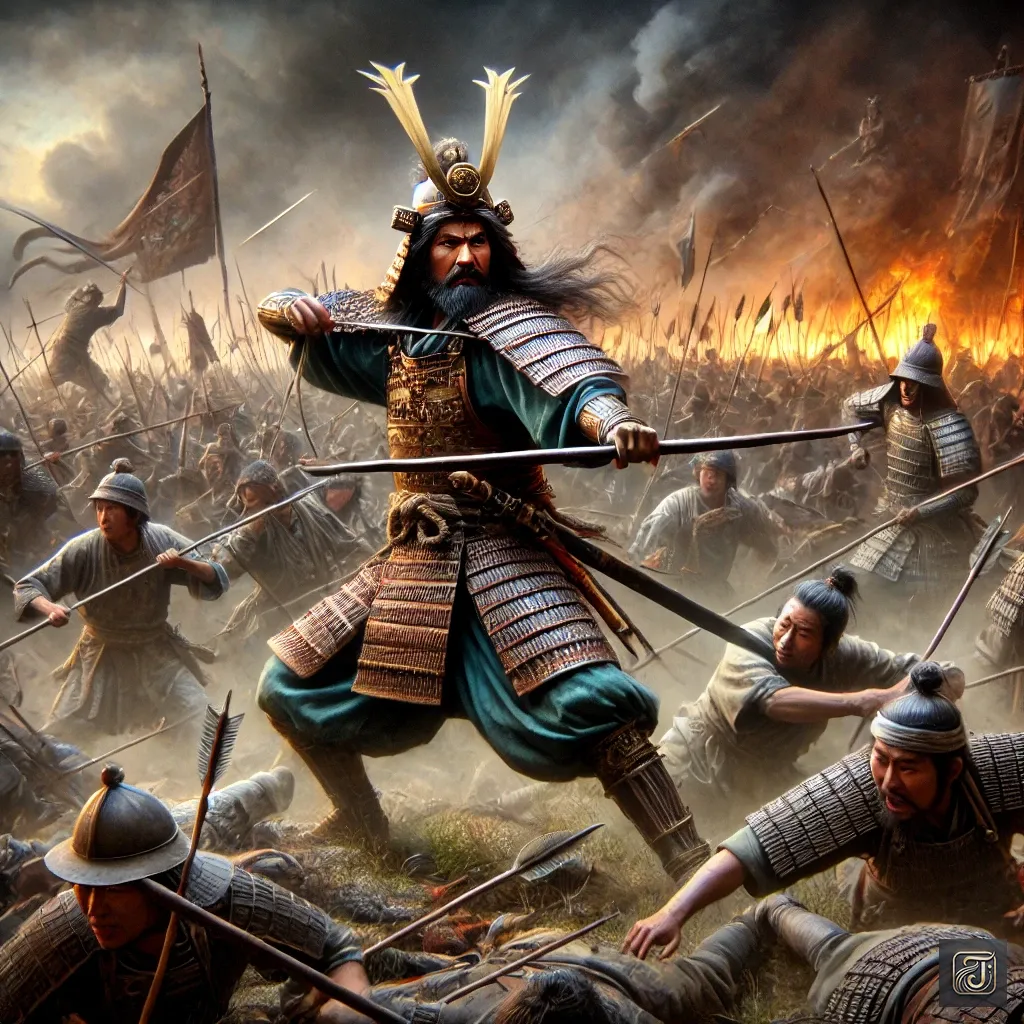
King:
“We must protect this land, or Yamatai will fall!”
The king shouted as he raised his sword high, striking down enemy after enemy.
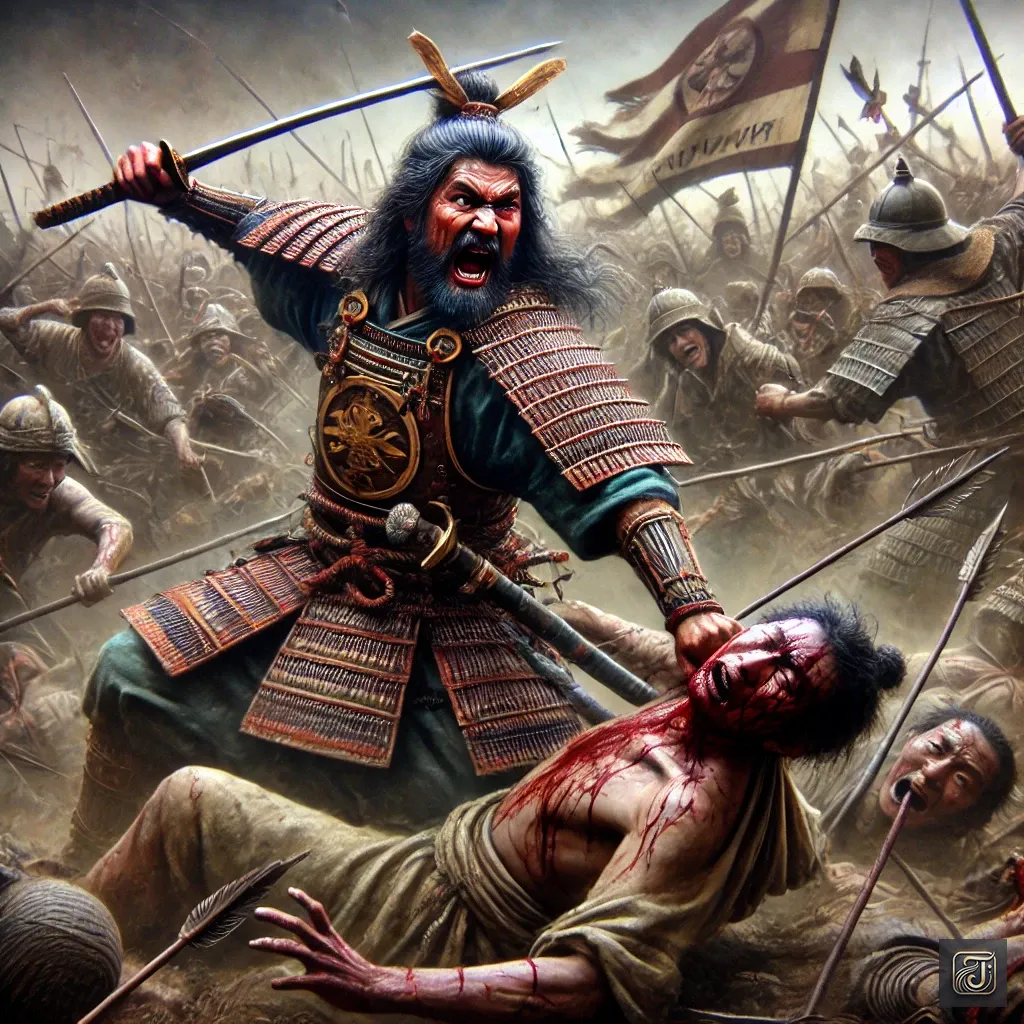
However, overwhelmed by the sheer number of enemies, he was eventually cornered and suffered a fatal wound.

King:
“Is this where it all ends…?”
The king collapsed to the ground, his blood-stained hands trembling as he mustered his last strength to speak to his men.
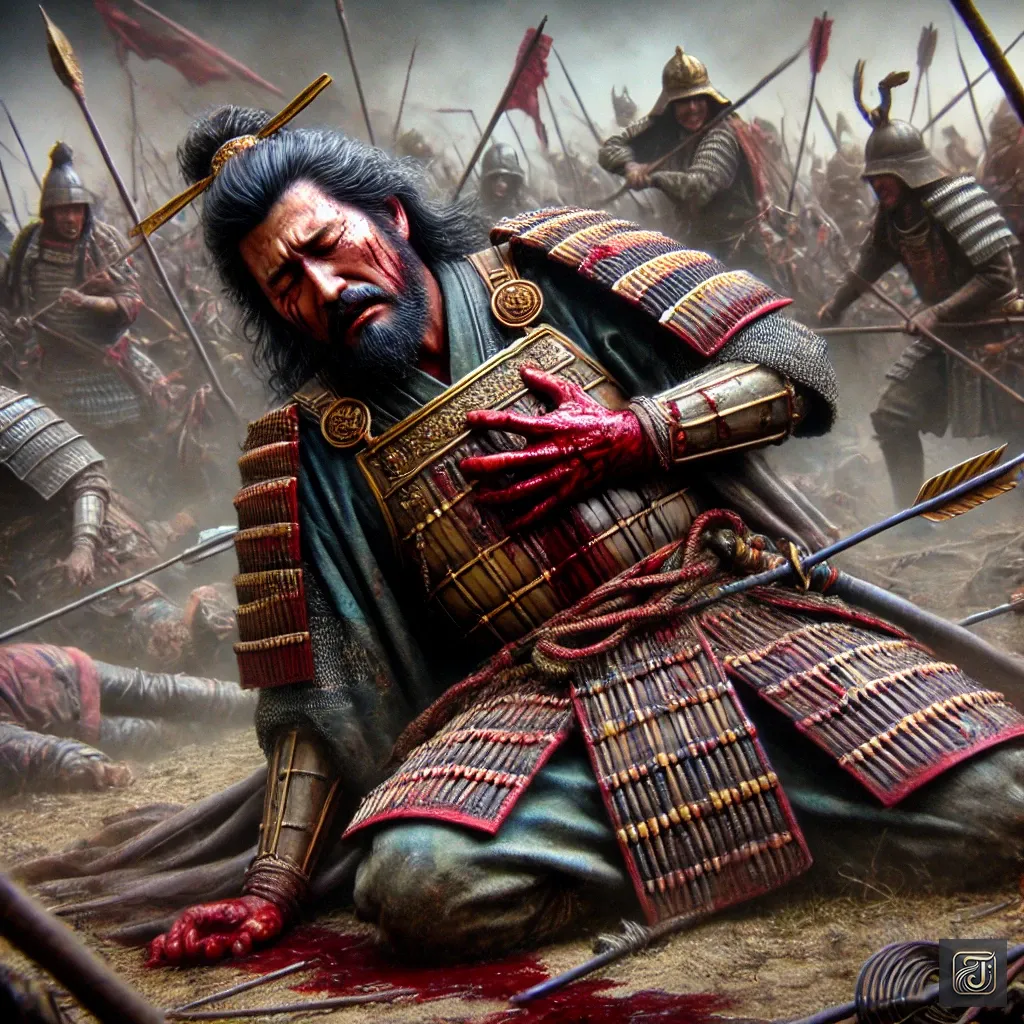
King:
“Protect… the kingdom…”
With those final words, the king’s eyes closed forever.
When news of the king’s death reached the village, the people were thrown into even greater turmoil.
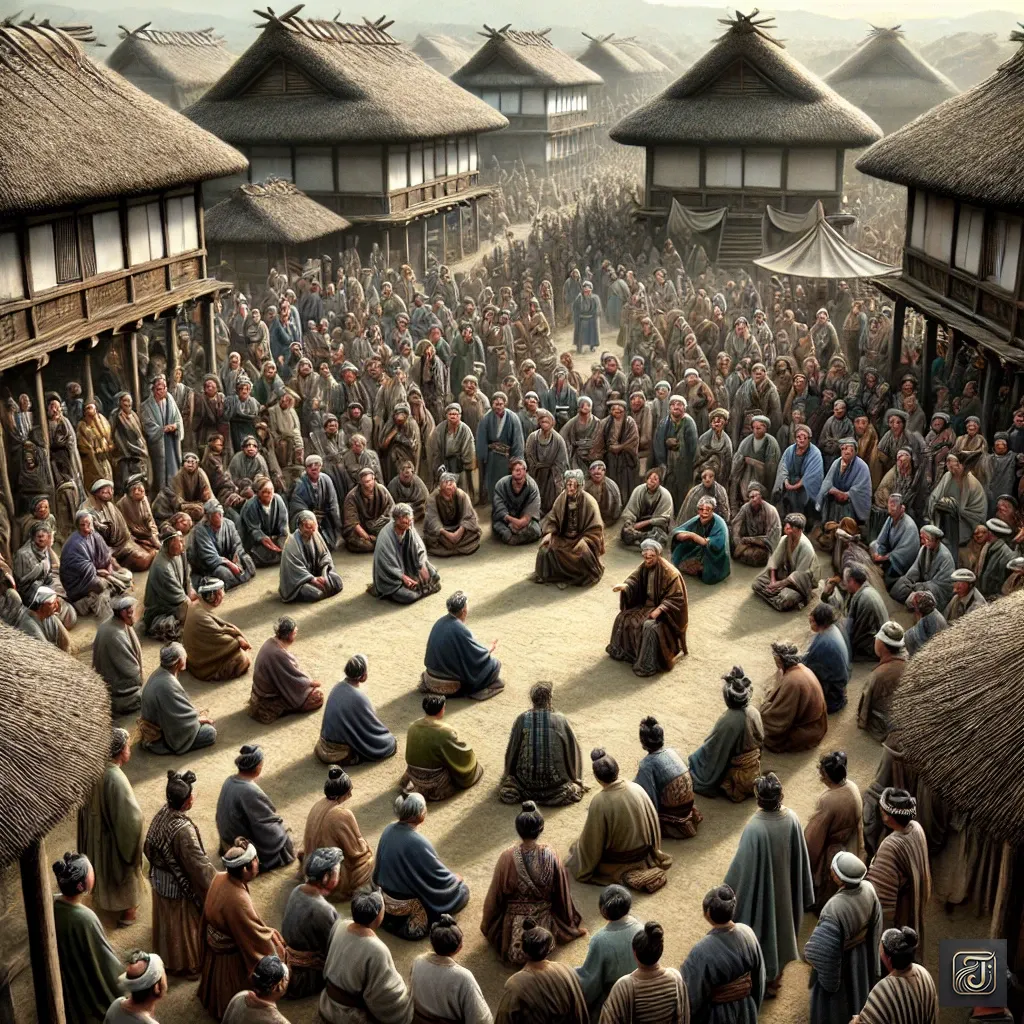
One of the elders:
“The king is dead? What will happen to us now?”
“We must choose a new ruler!”
“If we don’t, we’ll be swallowed up by other nations!”
Amid the panicked villagers, the elders gathered to discuss a course of action.
Seated at the center of the square, one elder, with a stern expression, began to speak.
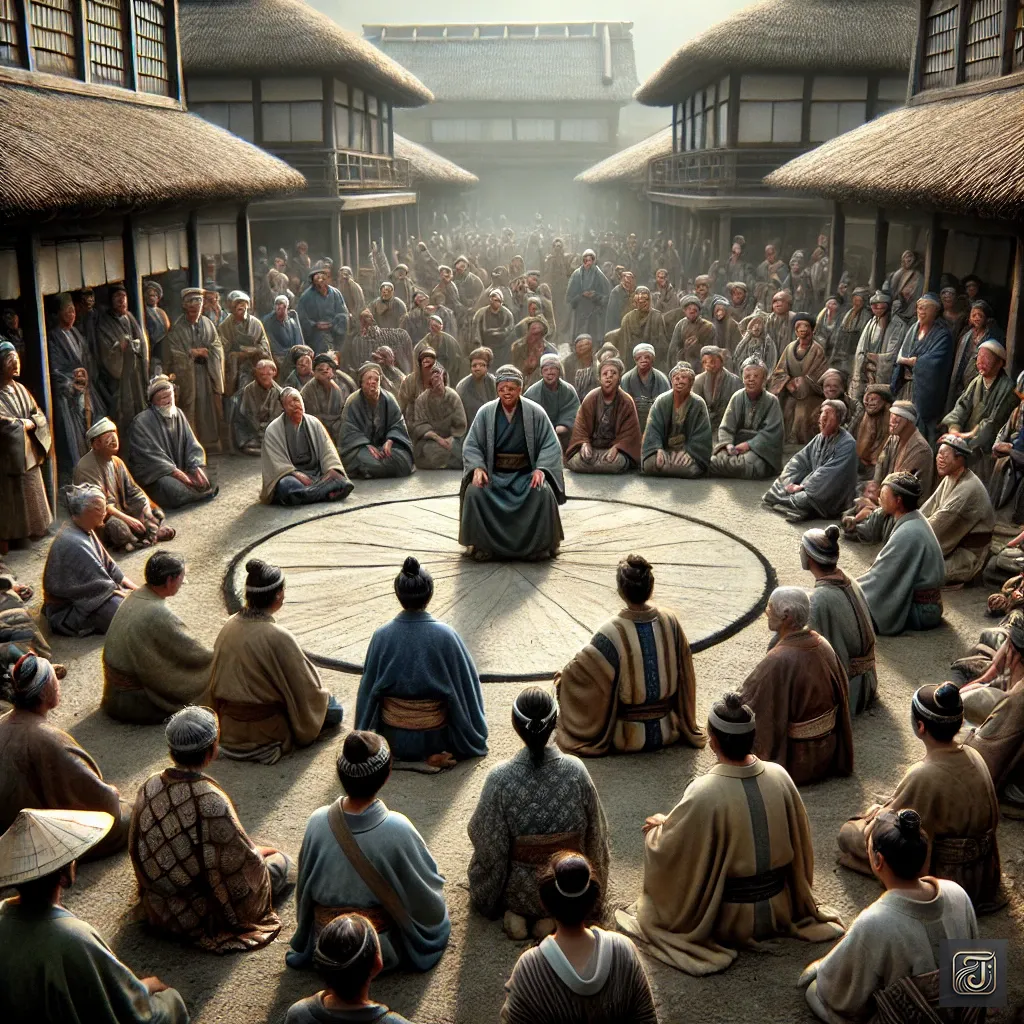
Elders:
“We need a new ruler.”
“But how do we put an end to this chaos?”
“No, another male king will lead us down the same path. The conflicts will persist.”
“Not only will they persist, but they may even worsen.”
“Then, who is truly fit to be king?”
One of the elder members, aged and wise, spoke up quietly with a proposal.
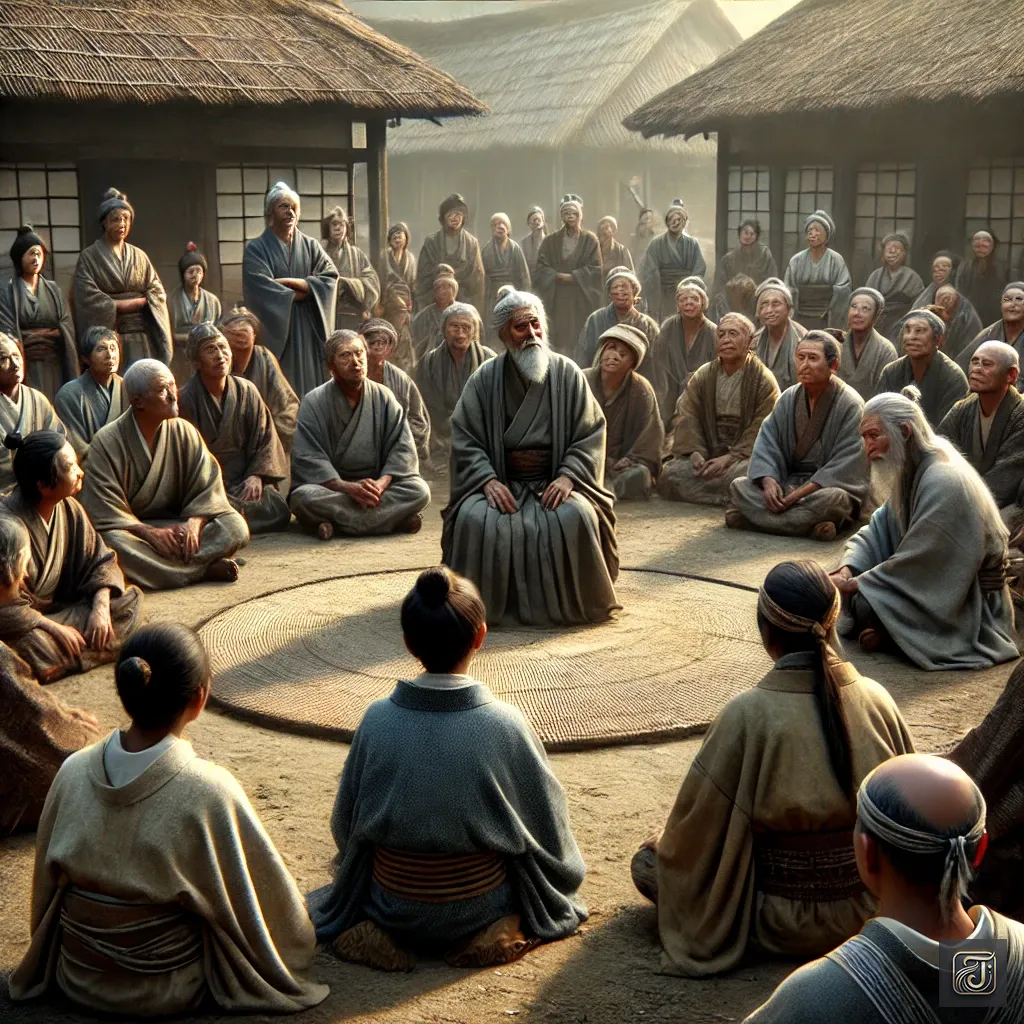
One of the elders:
“Then, what if we choose someone who can hear the voice of the gods as our ruler?”
The other elders exchanged glances, their expressions a mix of curiosity and hesitation.

Elders:
“The voice of the gods? Do you really think such a person exists?”
“She does.”
“Himiko.”
“We have Himiko.”
“That girl could govern the land by conveying the will of the gods.”
Summary
With the death of Yamatai’s king, the nation plunged once more into chaos.
To overcome this crisis, the elders proposed appointing Himiko, who could hear the will of the gods, as the new ruler.
Chapter 7: The Chosen One in an Age of Turmoil (Mid-3rd Century)
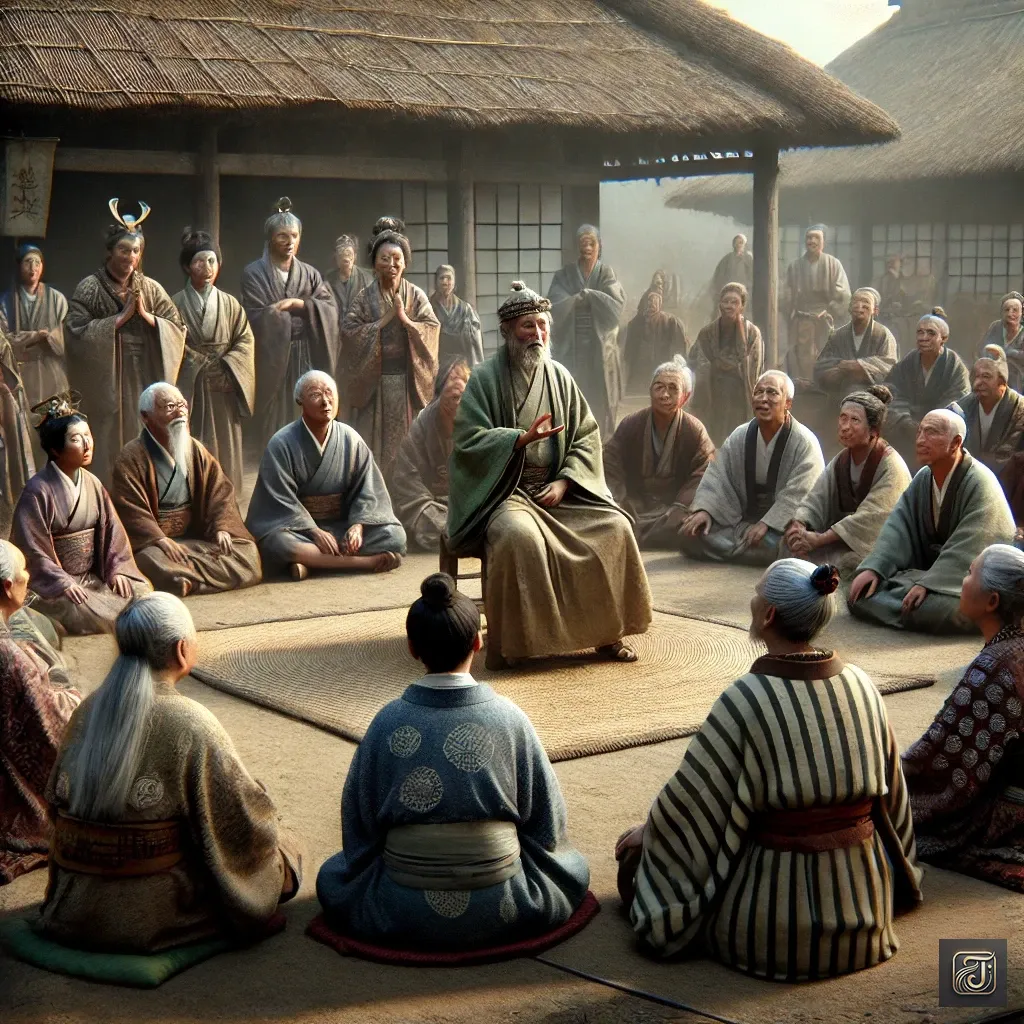
Those present fell silent for a moment.
Himiko, the shaman who lived in solitude on the outskirts of the village, was rarely involved in the lives of others.
Yet, rumors persisted that she possessed a special, extraordinary power.
Elders:
“Indeed… that girl possesses a mysterious power.”
“But making a woman king?”
“I’ve never heard of such a thing!”
Another elder spoke up quietly.
One of the elders:
“Look at our current situation.”
“Perhaps it is time for us to abandon the conventions we’ve clung to until now.”
“If we keep doing the same things, the same outcomes will repeat themselves.”
“Himiko, who hears the voice of the gods, might be able to bring an end to this conflict.”
The objections grew fewer, and gradually, the proposal gained acceptance.
Summary
Himiko was chosen as queen, taking on the role of a shaman to convey the will of the gods and guide the nation.
Her younger brother also resolved to support her by managing the practical affairs of governance.
Chapter 8: The Brother’s Resolve
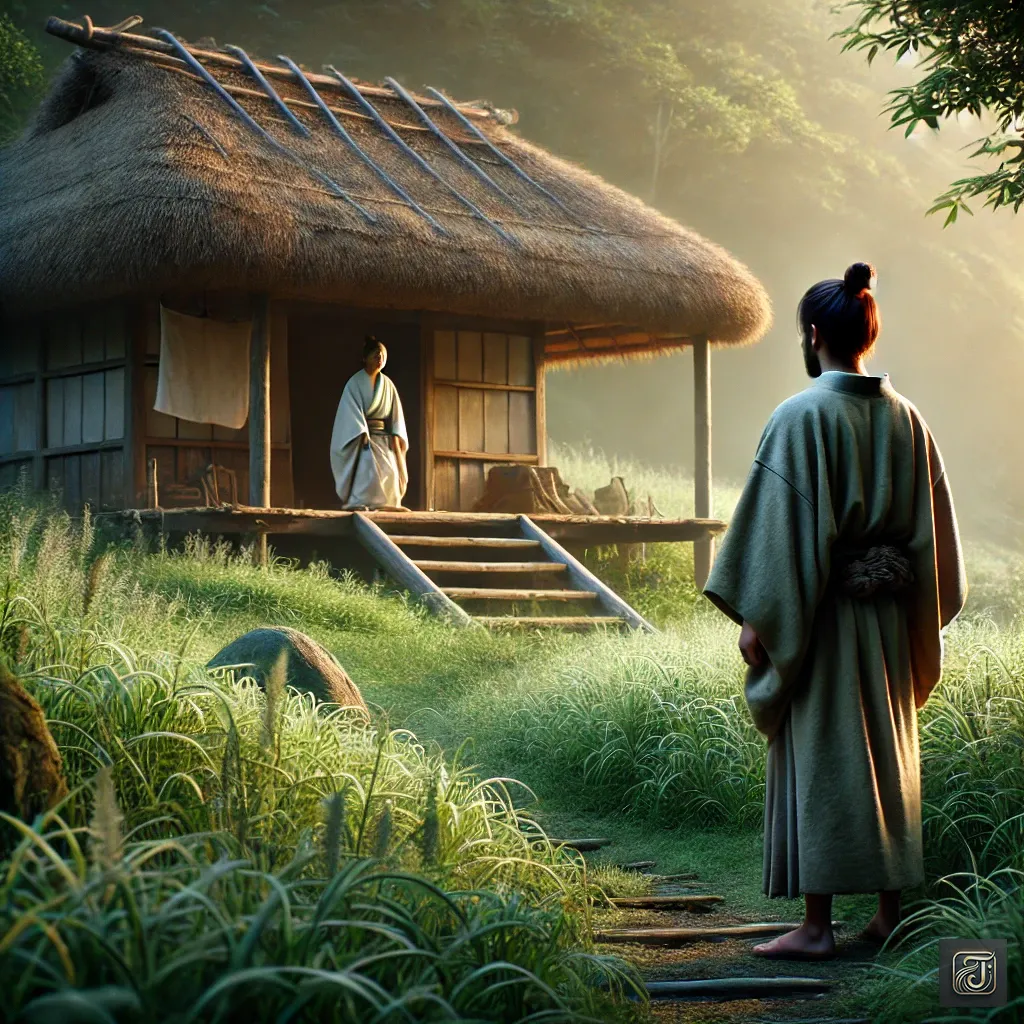
The day it was decided that Himiko would become queen,
her younger brother, Ata, stood silently in front of her modest hut.
The scent of grass filled the air as he gazed at his sister,
both a shaman with a mysterious power and his beloved sibling.
Letting out a deep sigh, he contemplated the weight of what lay ahead.
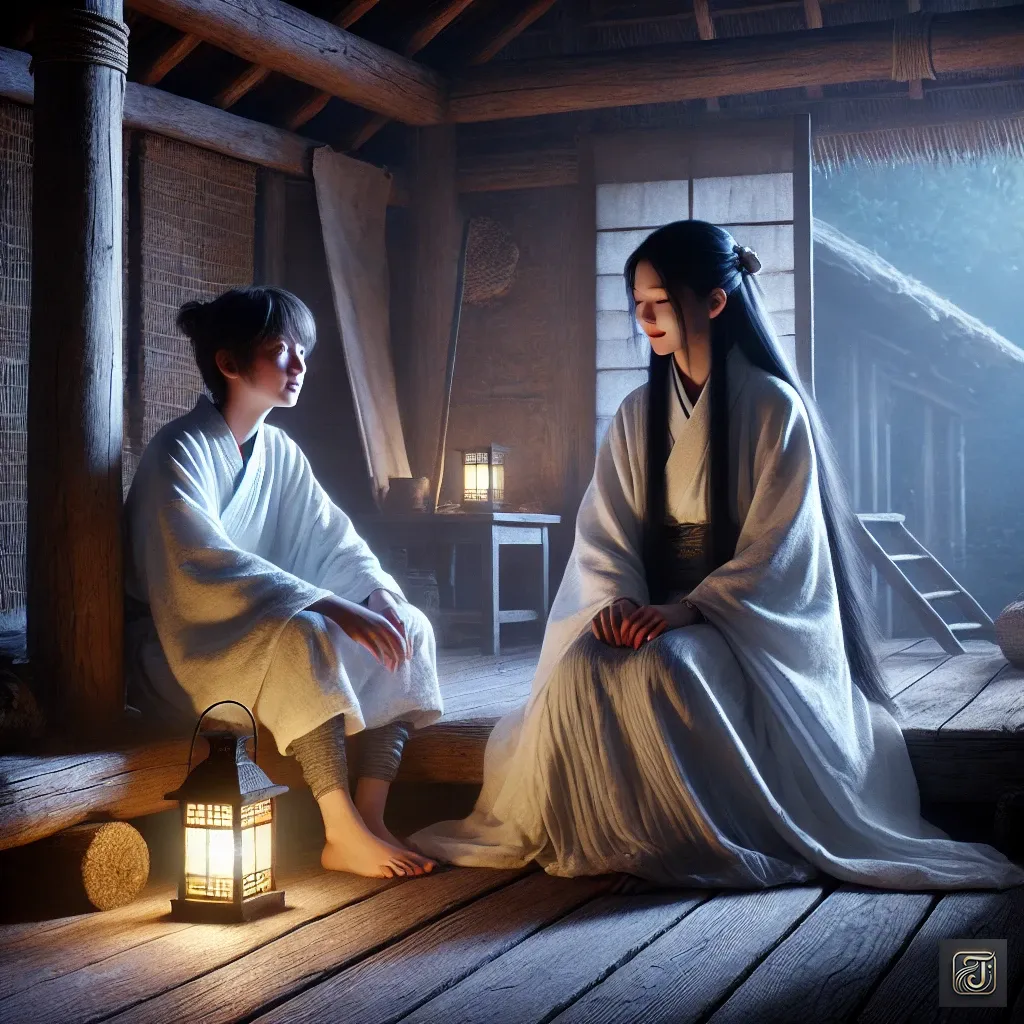
Ata:
“Will Sister truly accept this…?”
Ata murmured under his breath.
From a young age, Ata had always understood just how extraordinary Himiko was.
He had witnessed countless times how the villagers approached her with reverence, bringing their prayers and requests, awed by her mysterious presence.
But he also knew all too well how her unique power had condemned her to a life of solitude.
One night, when they were alone, Ata turned to his sister and asked her a question.
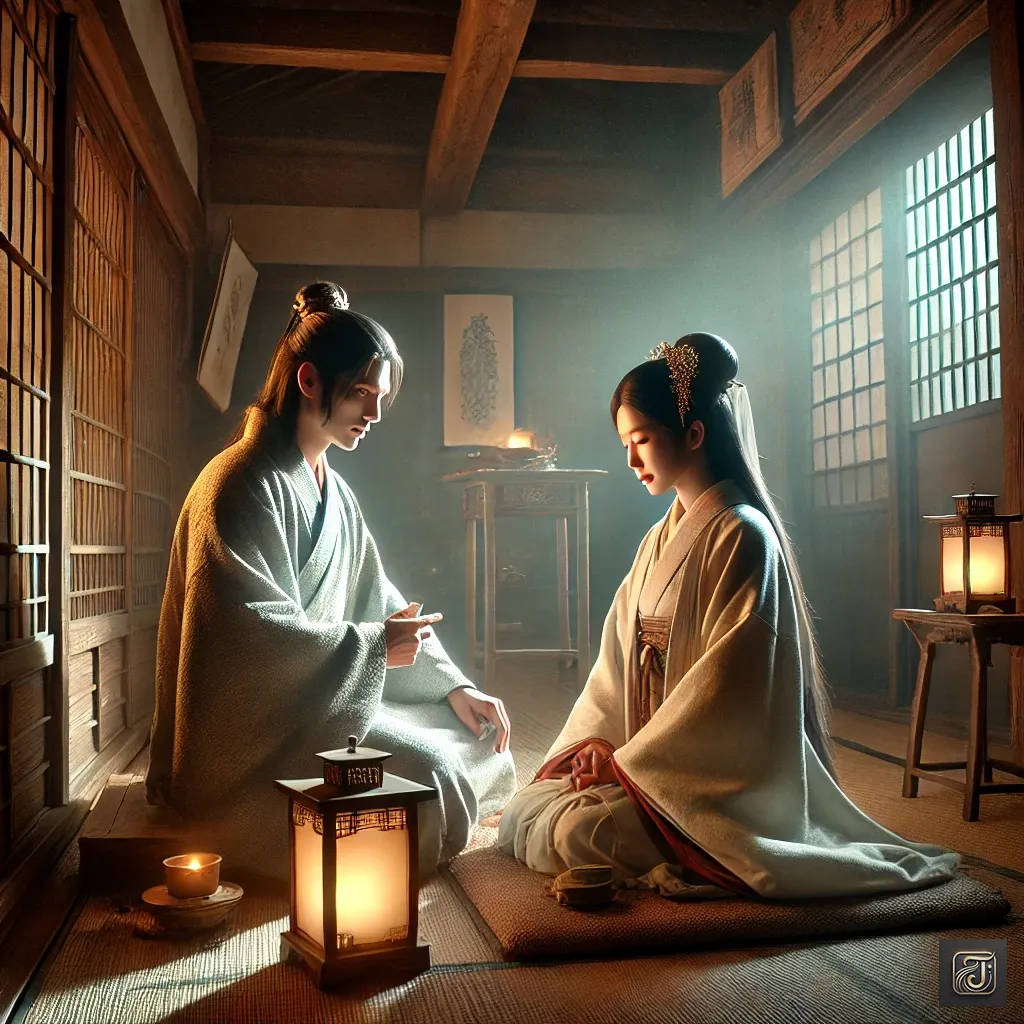
Ata:
“Do you truly hear the voice of the gods, Sister?”
Himiko answered with a gentle smile.
Himiko:
“My dear brother, do you wish to hear it too?”
“But know this— the voice of the gods is not sweet.”
“At times, it is so heavy it can crush a person.”
At those words, Ata found himself unable to say anything more.
All he could feel was a burning resolve deep in his heart—a desire to protect his sister’s quiet and solitary existence at all costs.
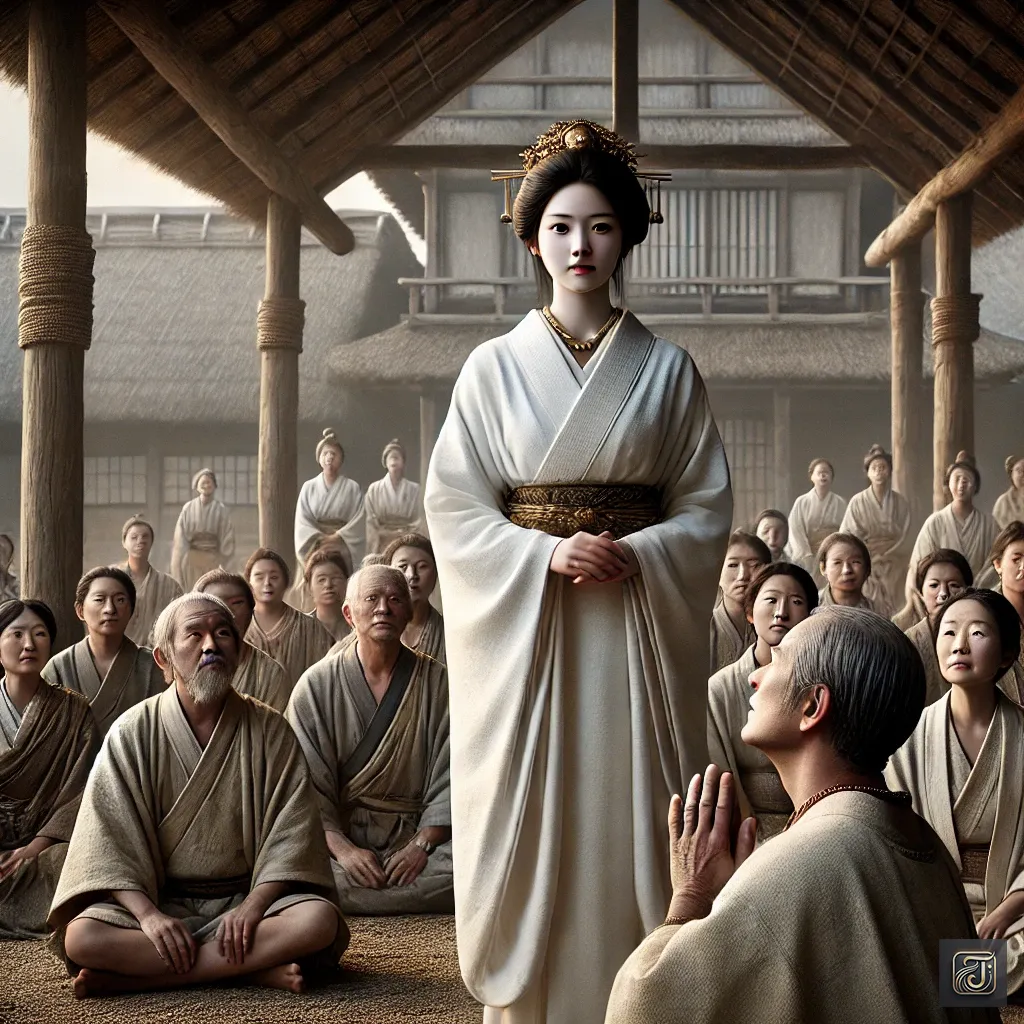
The Resolve Before the Ascension
On the day the elders pleaded with Himiko to lead the nation as queen, Ata stood by her side.
When, after a long silence, she quietly said,
“I will follow the will of the gods,” a storm of conflicting emotions swirled within Ata’s chest.
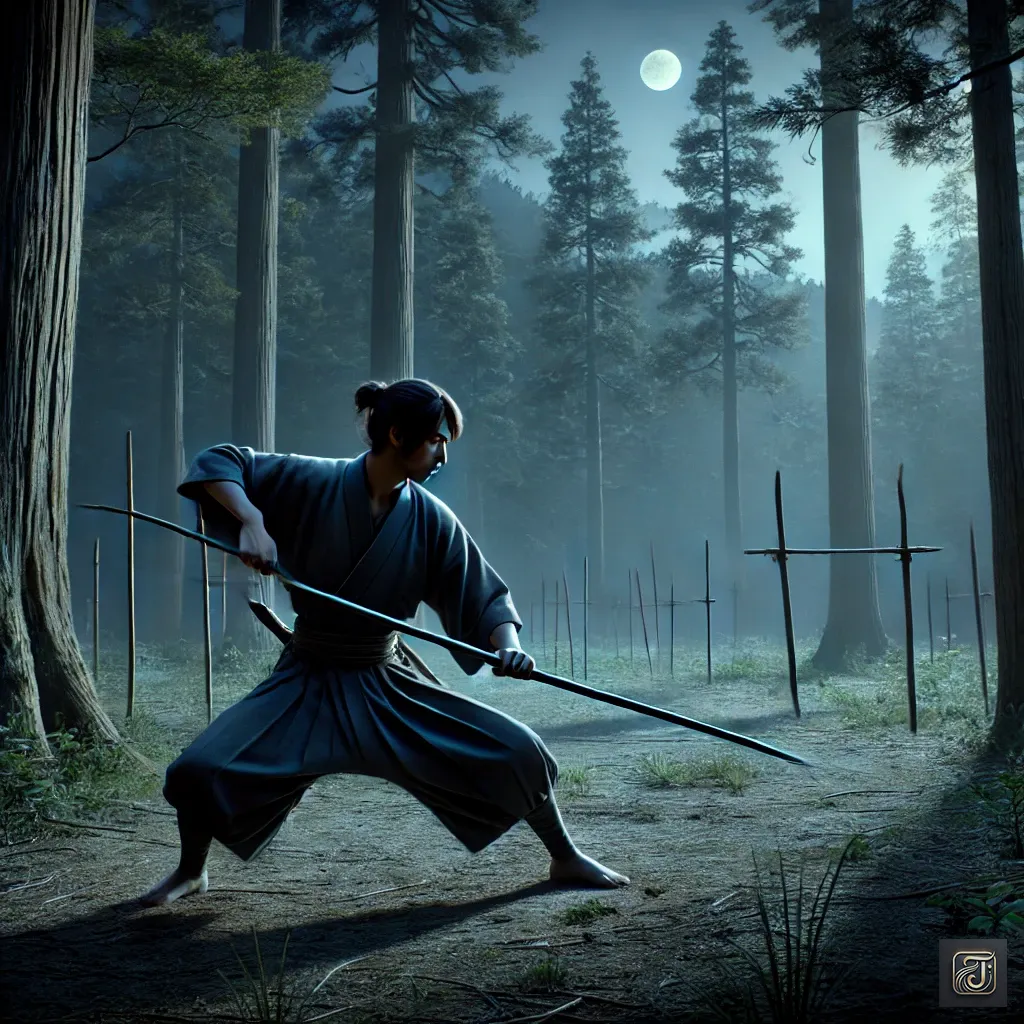
Ata:
“I will support her, no matter what.”
That night, Ata stood alone in the mountain clearing, practicing with his spear.
For him, martial training was not just about honing his skills—it was also a time to clear his mind and organize his thoughts.

Ata:
“I will stand in front of the queen. My sister must focus solely on interpreting the will of the gods. That is my duty.”
There were days when Ata was consumed by anxiety and frustration over his own shortcomings.
Even so, his unwavering loyalty to his sister became his anchor.
Ata:
“My sister is alone. No one can truly understand the burden she carries.”
One day, a group of village children unexpectedly approached him.
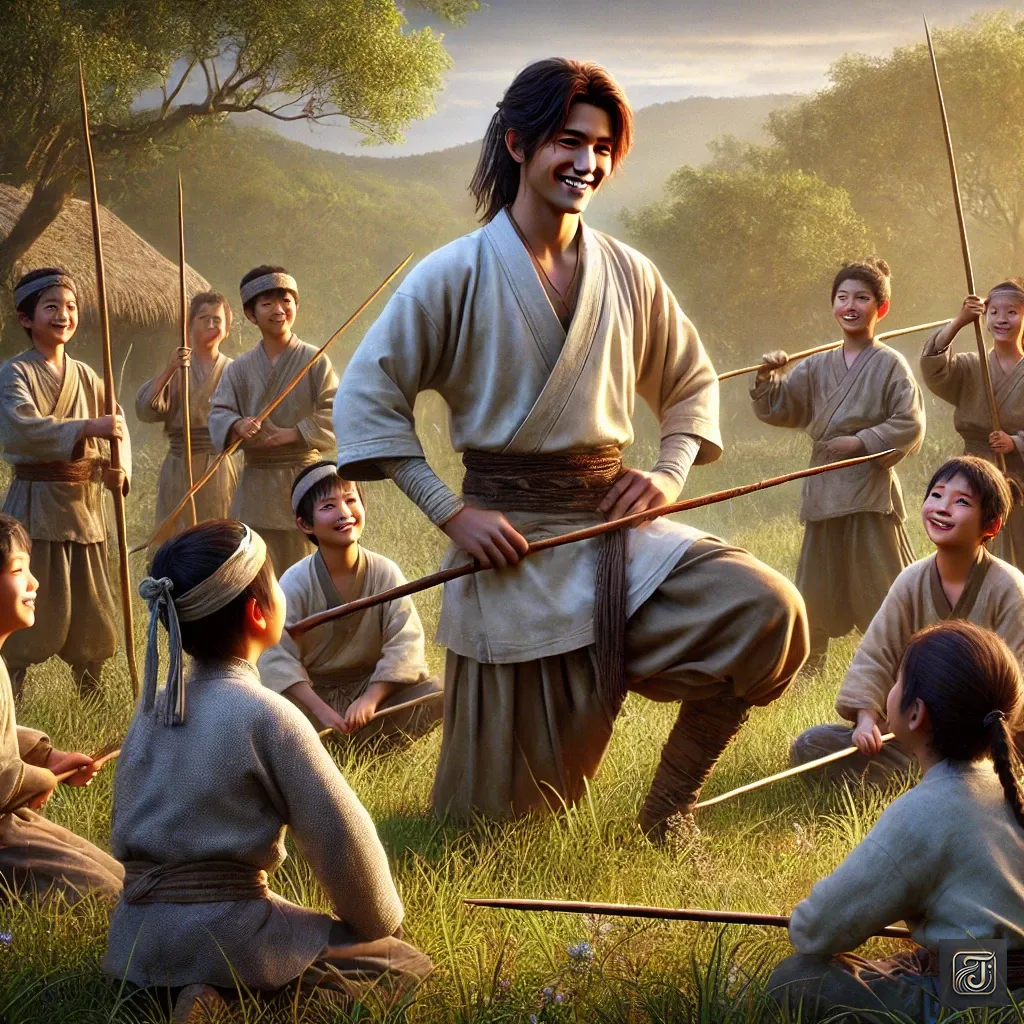
Children:
“Lord Ata, please teach us how to use the spear!”
Ata:
“Very well.”
“Show me your stances first.”
Surrounded by the children, Ata began to see a part of his purpose.
If his sister was to guide the people’s faith, then he must stand firmly on the ground and act to protect that faith.
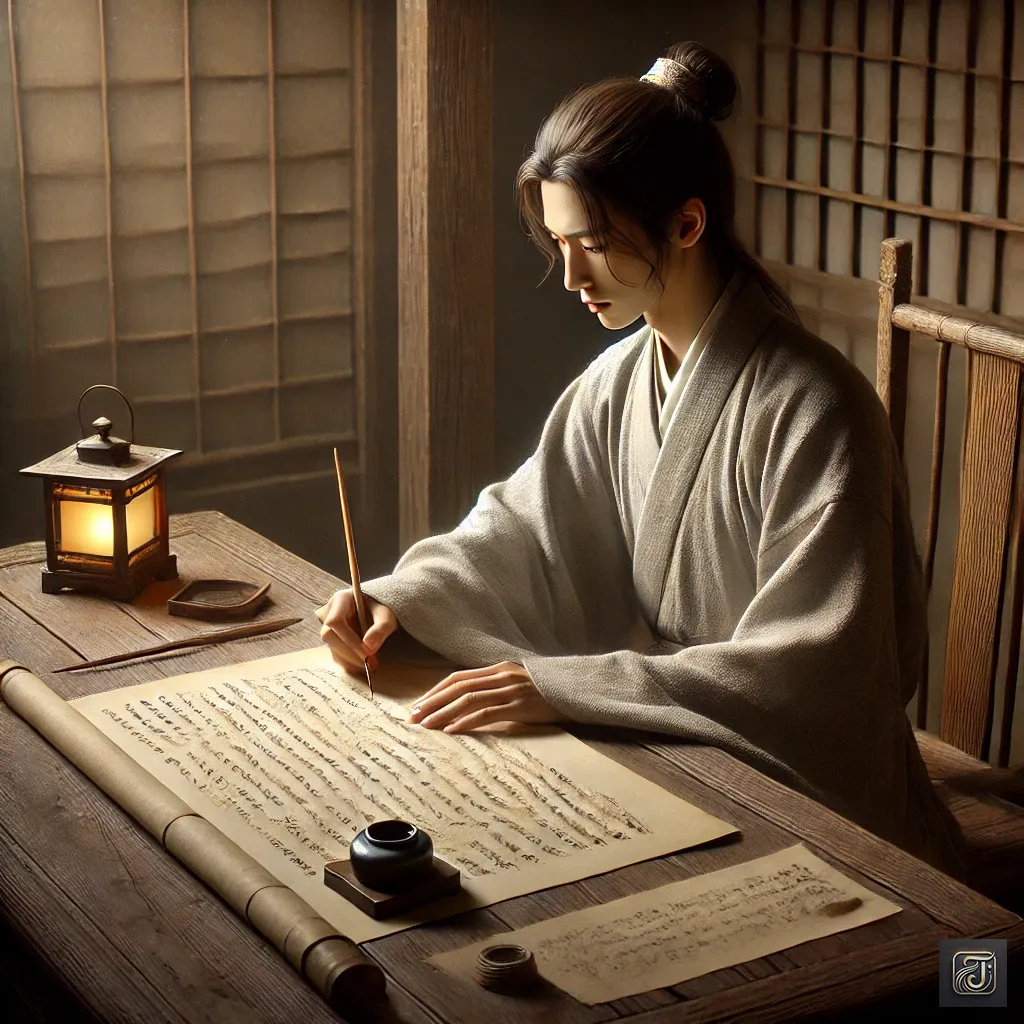
A Letter to Sister
A few weeks after his sister’s ascension, Ata delivered a letter to her.
Inside, his resolve was carefully written.
The Letter’s Content:
”To My Dearest Sister,
I am deeply proud that you have become the queen, the one chosen to convey the voice of the gods.”
“However, I cannot begin to fathom the immense weight of that responsibility.”
“And when I think of the solitude you must endure as you bear it, my heart aches.”
“That is why I cannot allow you to carry this burden alone.”
“Please, rely on me.”
“I will share your load, and together, we will shoulder its weight.”
“I vow to stand by your side and be your unwavering support as we guide our people.”
Your brother, Ata”
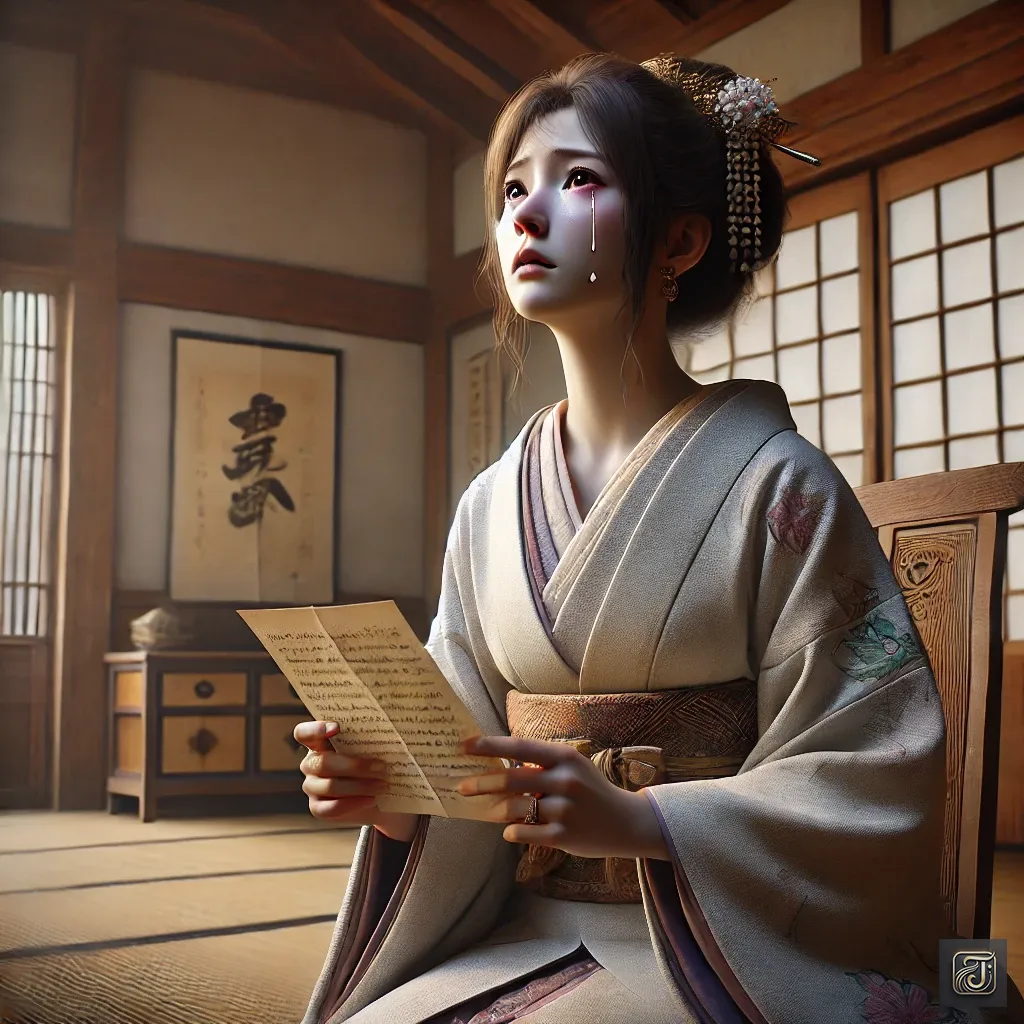
After reading the letter, Himiko quietly closed her eyes, a single tear sliding down her cheek.
Her brother’s kindness and determination strengthened her heart.
She looked up toward the heavens and offered a prayer of gratitude to the gods.
Himiko:
“I give thanks to the gods for blessing me with such a brother.”
From that day forward, their bond grew even stronger, and together, they became unwavering pillars, supporting each other as they led Yamatai forward.
Summary
Ata, understanding Himiko’s solitude, resolved to support her through his role in managing the kingdom’s affairs.
His unwavering support became the strength that enabled Himiko to fulfill her divine mission.
Chapter 9: Convincing Himiko
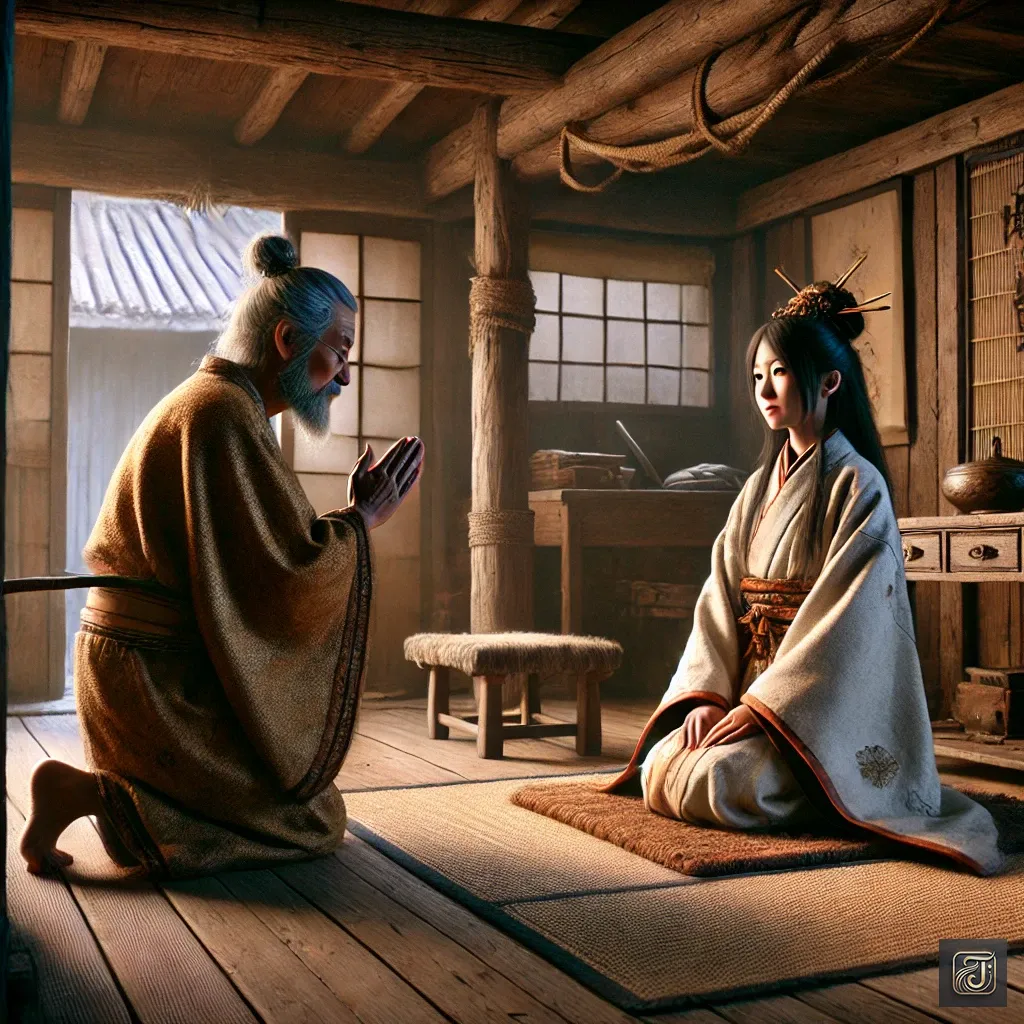
A few days later, the elders visited Himiko’s humble home.
Seated quietly inside, Himiko looked up as one of the elders bowed deeply before her.
The elder:
“Lady Himiko, we have a request for you, to bring peace to the Wa Kingdom.”
Himiko:
“For me?”
Himiko asked, her soft voice calm yet curious.
The elder met her gaze, speaking with earnest conviction.
The elder:
“Your power is known to all the villagers.”
“Please, become the queen of Yamatai and guide this land to peace.”
Himiko lowered her eyes and fell into a long silence.
The idea of standing before others and taking on the responsibility of governance was an unfamiliar and daunting prospect for her.
At that moment, her younger brother, Ata, quietly stepped closer and whispered gently,
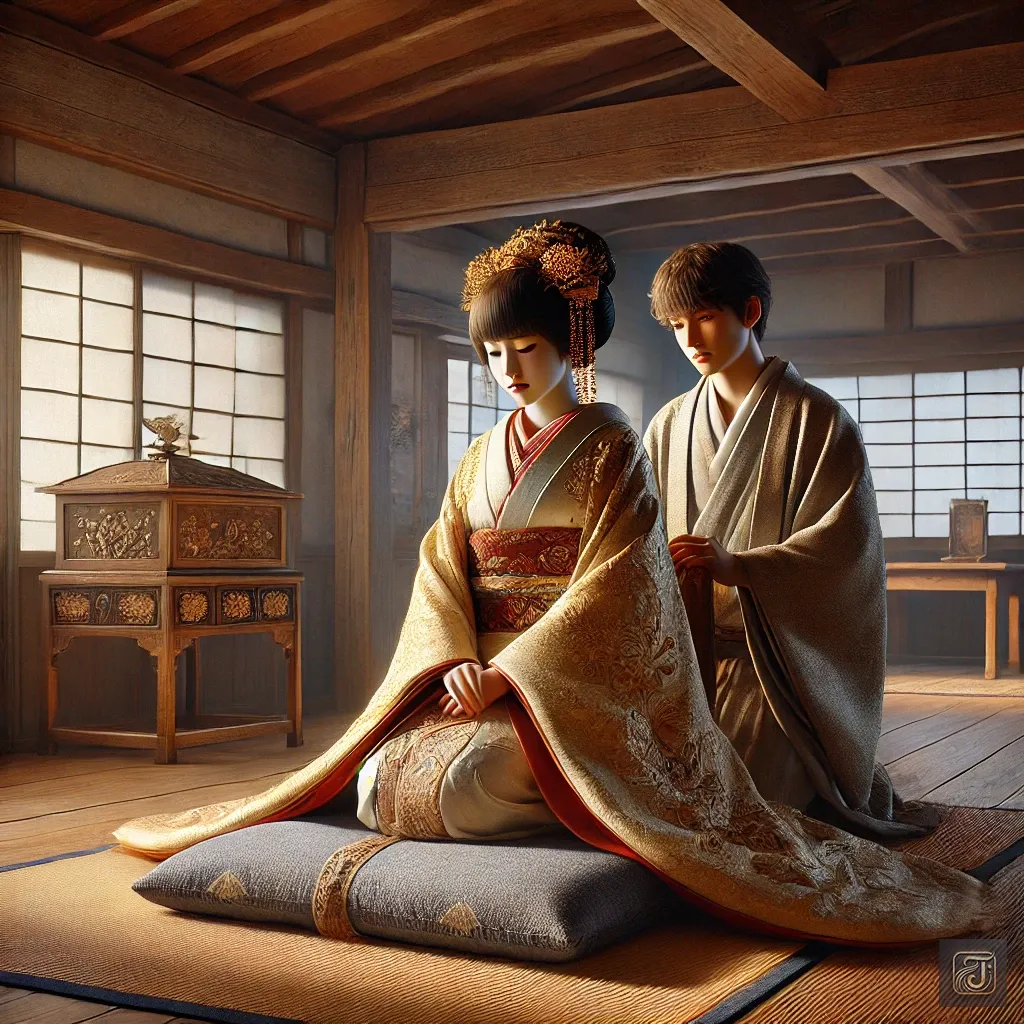
Ata:
“Sister, with your ability to hear the voice of the gods, you can lead this nation toward the right path.”
“For that, I will be your support.”I will take on all the practical duties and assist you in every way I can.”
“Please, lend your strength to this country.”
Himiko closed her eyes and offered a silent prayer. After a moment, she spoke softly but firmly.
Himiko:
“The gods have told me to lead.”
“I will follow their will and serve as a shaman, conveying their divine intent to protect this land.”
“But I wish to remain a shaman who conveys the gods’ will.”
“Brother, if you promise to aid me, I will take on the duties of a queen.”
Summary
With the elders’ persuasion and her brother’s unwavering support, Himiko resolved to follow the will of the gods and take on the mantle of queen.
Chapter 10: Himiko’s Ascension
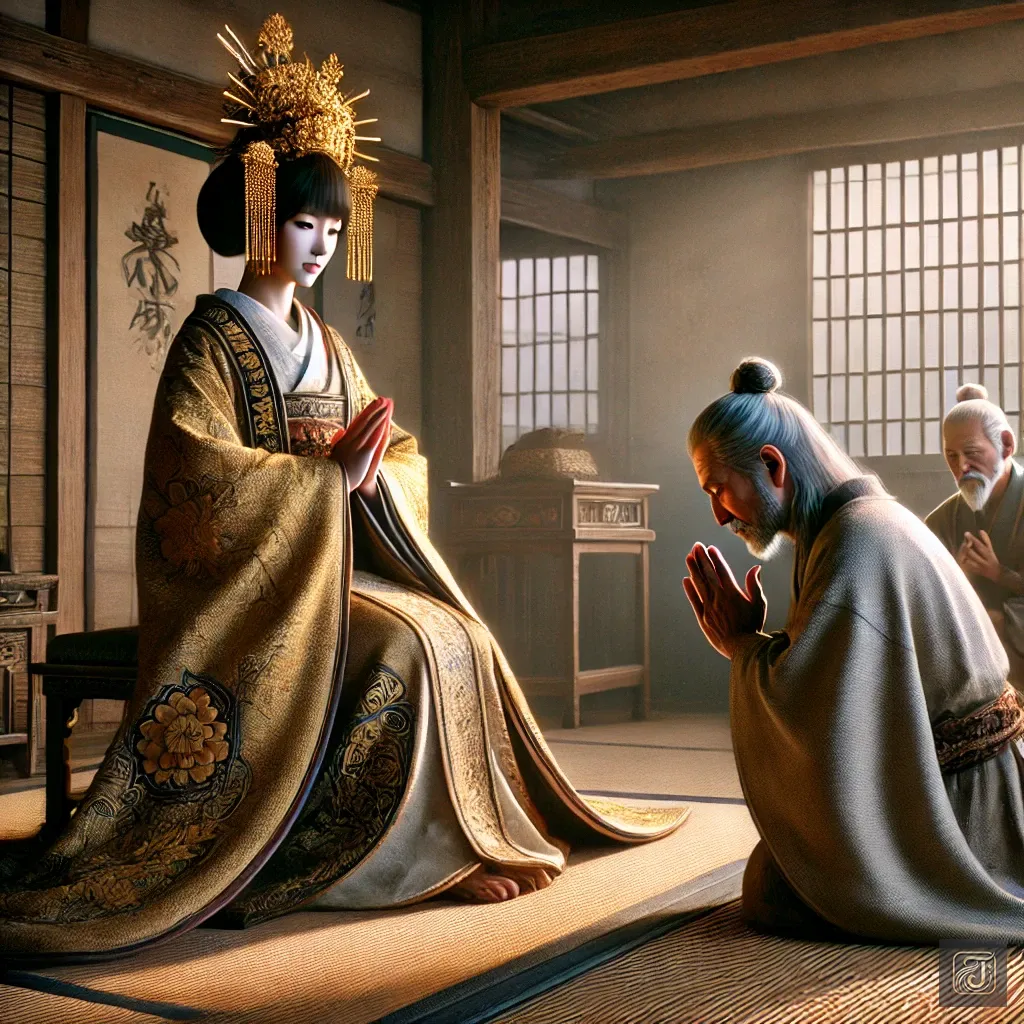
And so, Himiko became the queen of Yamatai.
She refrained from direct involvement in political affairs,
instead serving as a spiritual leader who interpreted the will of the gods to unify the nation.
Meanwhile, her younger brother took on the practical duties of governance,
ensuring the smooth administration of the kingdom.
On the day of her ascension,
Her brother stood before the gathered villagers in the square and made a solemn declaration.
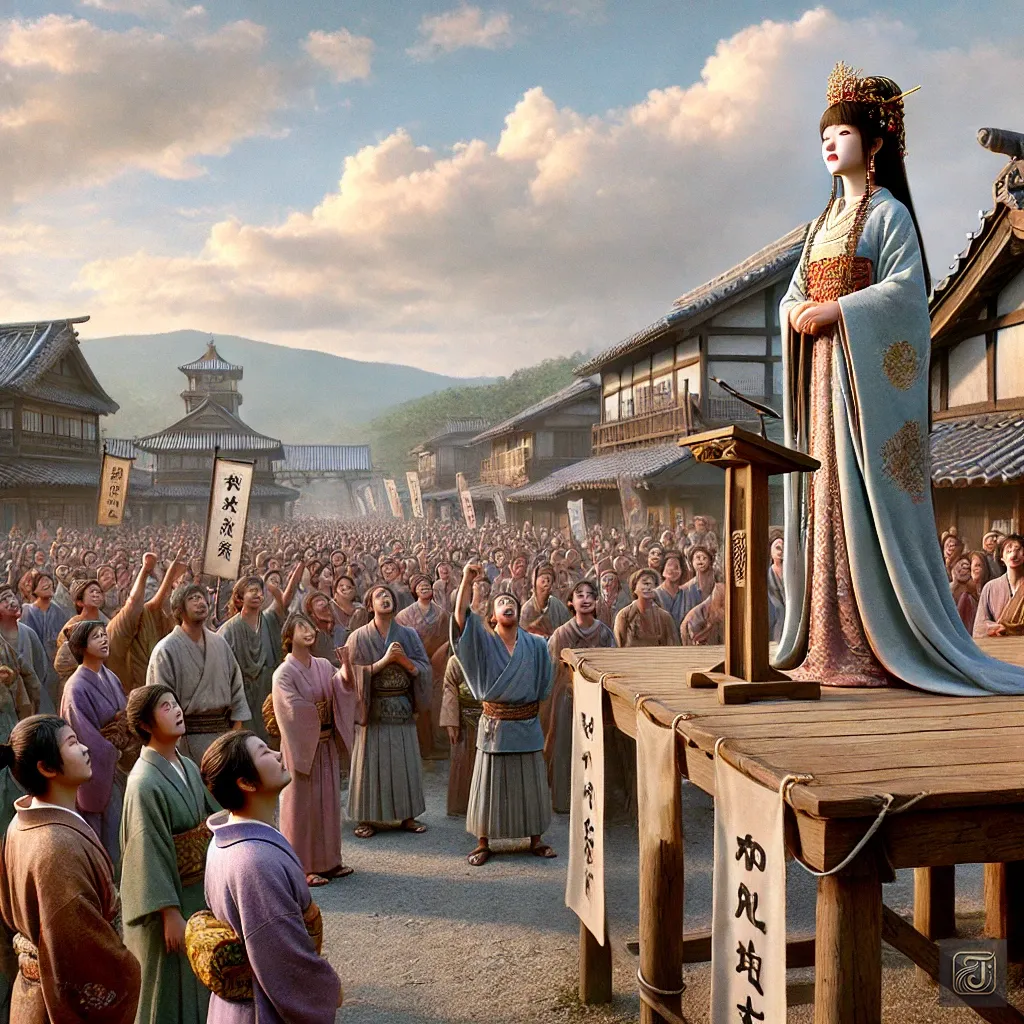
Villegars:
“Himiko has ascended as our queen! Yamatai enters a new era!”
The people erupted in cheers, finding a glimmer of hope in the announcement.
Watching the scene from afar, Himiko quietly looked up to the heavens, speaking to the gods in her heart.
“Please, bring peace to this land.”
This marked the beginning of a new chapter in Himiko’s story.
In an age of turmoil, the shaman chosen by the gods would become the voice of divine will and lead the Wa Kingdom toward unity.
Historical Context: The Great Wa Disturbance and Himiko’s Rise
In the 3rd century, when Himiko rose to power, the Wa Kingdom was engulfed in chaos,
a period referred to as the “Great Wa Disturbance.”
Numerous small states were locked in constant conflict,
threatening the lives of the common people.
To quell this disorder, Himiko, believed to possess the ability to hear the will of the gods,
was chosen as a spiritual leader.
During this era, the Wa Kingdom viewed natural phenomena and disasters as manifestations of the gods’ will, making the presence of shamans like Himiko highly revered.
Summary
Himiko formally ascended as queen and began leading the nation as its spiritual guide.
Her younger brother, Ata, took on the responsibilities of governance, playing a crucial role in ensuring the stability of the kingdom.
Chapter 11: The Envoy to Wei – Paving the Future of the Wa Kingdom
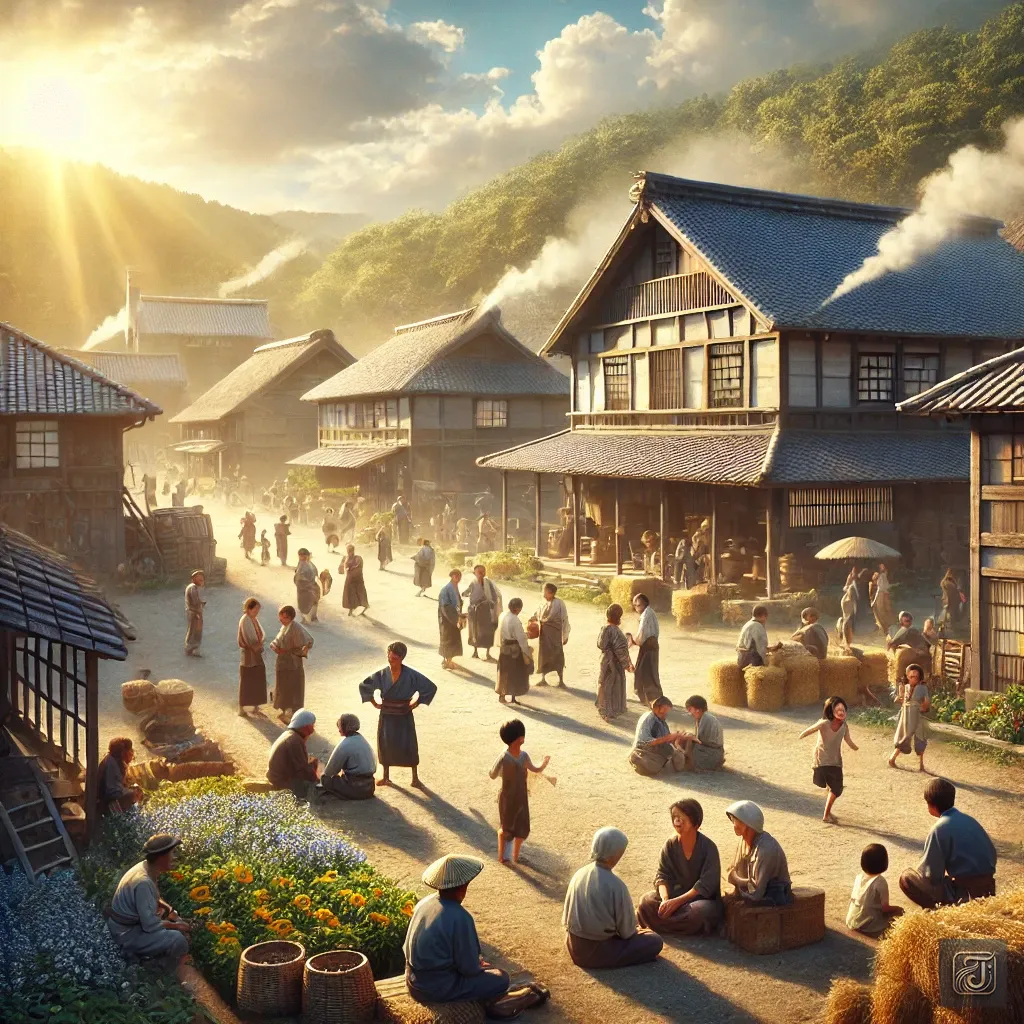
As Himiko began her reign, Yamatai gradually regained peace.
However, to prevent conflicts with neighboring states, it became essential to establish diplomatic ties with Wei, the great power of the Chinese mainland.
The goal was to enhance the Wa Kingdom’s standing by forging friendly relations with Wei and, with the support of this powerful ally, avoid disputes with other nations.
Himiko summoned her brother.
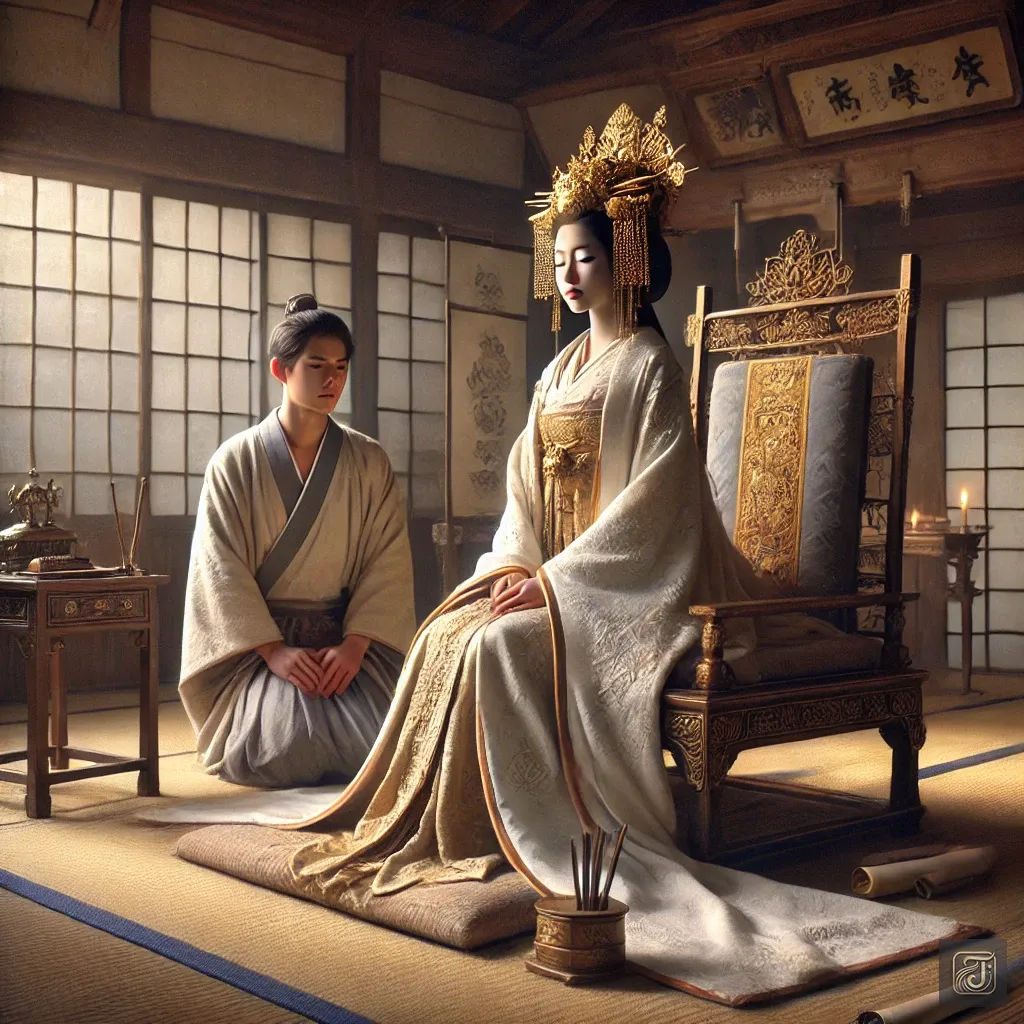
Himiko:
“My brother, I wish to send an envoy to Wei.”
“We must secure their support to bring further stability to this land.”
Ata:
“Wei is a powerful nation.”
“Will sending an envoy alone be enough?”
Himiko:
“The gods have spoken to me.”
“They have instructed me to pay tribute to Wei and entrust the future of the Wa Kingdom to them.”
Historical Context: The Great Wa Disturbance and Himiko’s Rise
In the 3rd century, when Himiko ascended as queen, the Wa Kingdom was engulfed in chaos, a period known as the “Great Wa Disturbance.”
Numerous small states were locked in continuous conflict, threatening the lives of the common people.
To quell the turmoil, Himiko, believed to possess the ability to hear the gods’ will, was chosen as a spiritual leader.
During this era, the people of Wa considered natural phenomena and disasters to be expressions of the gods’ will, which made the role of shamans like Himiko highly revered.
Diplomatic Background with Wei
In China, the Three Kingdoms period was unfolding, with Wei, Wu,
and Shu vying for dominance. Among them, Wei was the most powerful.
Establishing friendly relations with Wei offered Yamatai the following advantages:
・Military Deterrence: Gaining Wei’s backing would protect Yamatai from invasions by other states.
・Economic Development: Importing iron tools and advanced technologies would contribute to domestic stability.
・Increased Authority: Receiving the title “Queen of Wa, Friendly to Wei” would affirm Himiko’s legitimacy as a ruler both domestically and internationally.
Summary
Himiko decided to elevate Yamatai’s international standing through diplomacy with Wei and entrusted her brother with the crucial role of envoy.
Chapter 12: Diplomacy with Wei – The Tense Envoy Mission
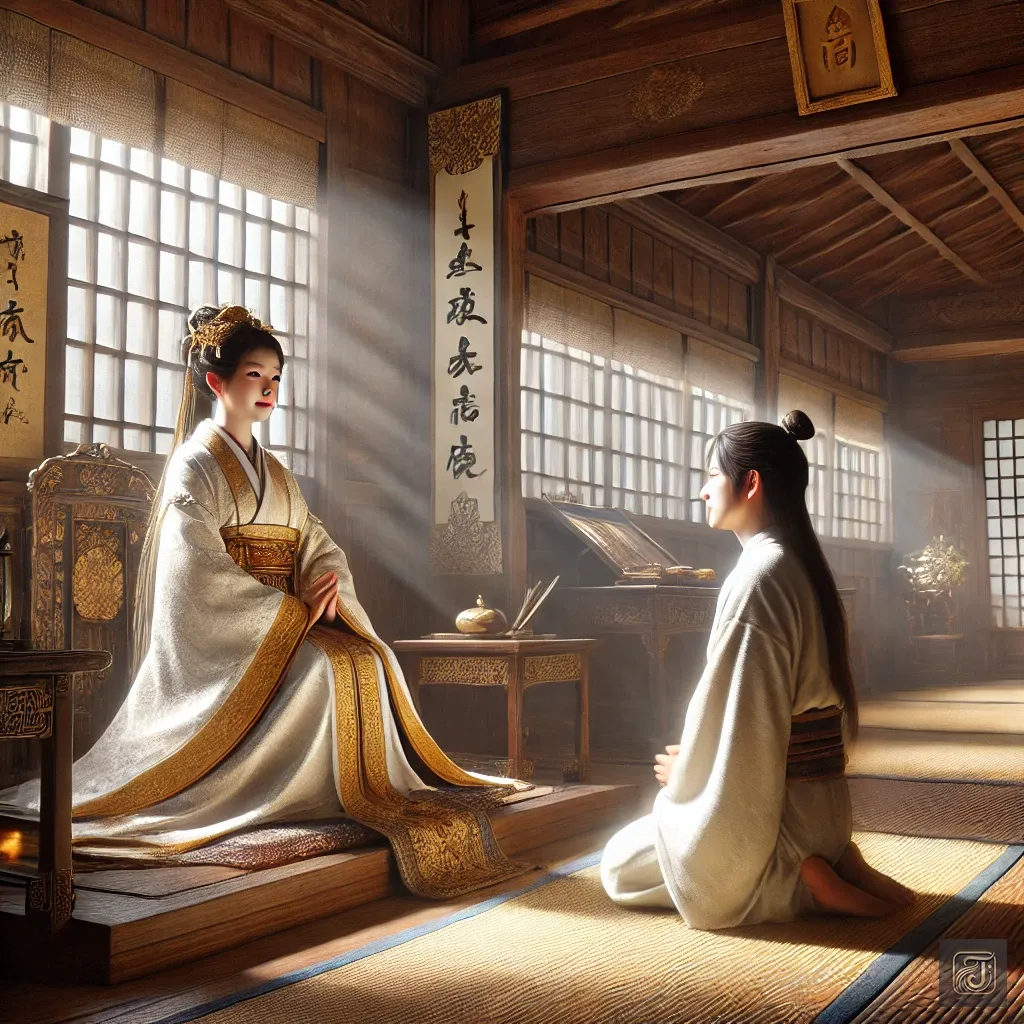
Himiko summoned her brother, Ata, and informed him of her decision to send an envoy to Wei.
Ata:
“We must pay tribute to Wei and secure peace and stability for our nation.”
Ata nodded quietly, accepting the mission with a sense of resolve.
A few days later, the envoy set out, embarking on a long voyage that eventually brought them to the capital of Wei.
Overwhelmed by the grandeur and immense scale of the city, Ata nonetheless maintained a composed demeanor as he conveyed Yamatai’s sincere tribute and intentions.
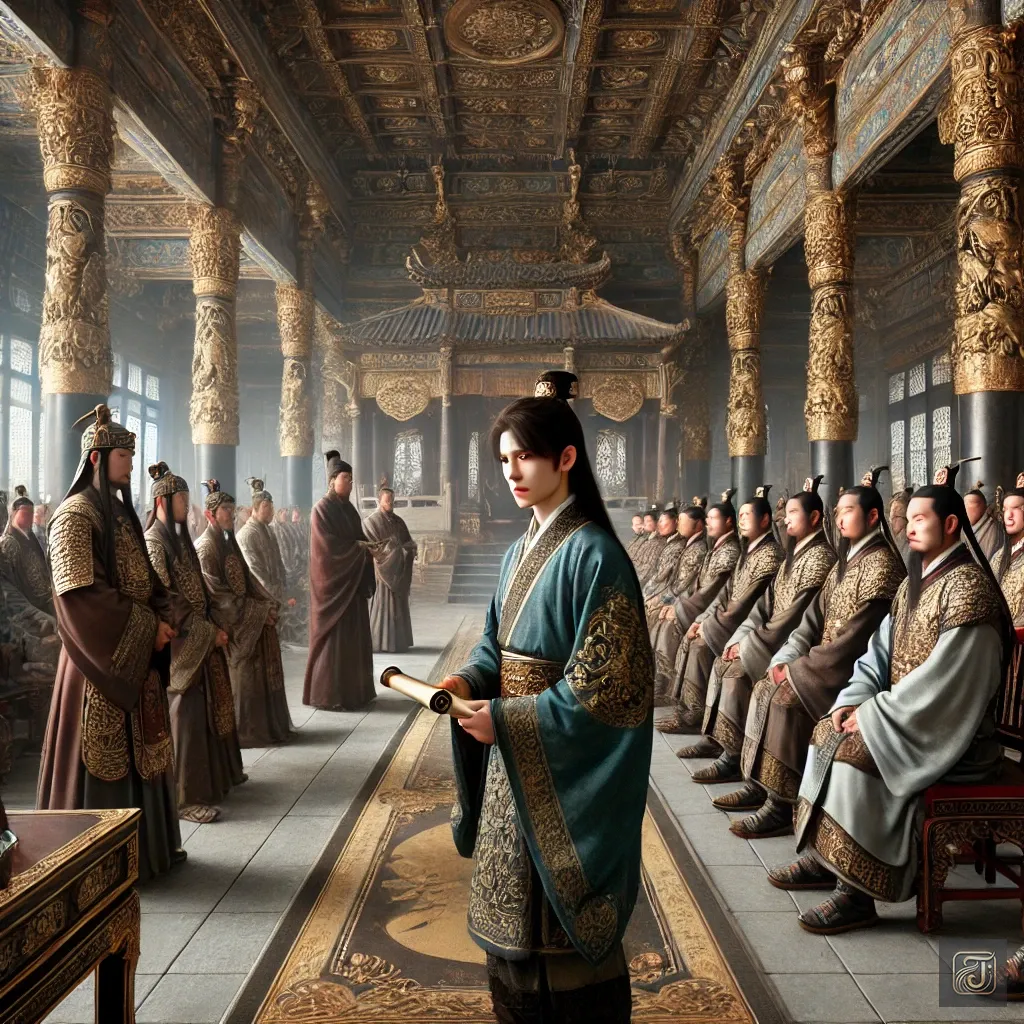
Ata:
“We have come from the Yamatai Kingdom of Wa.”
“Queen Himiko wishes to establish a bond of friendship with His Majesty, the Emperor of Wei.”
The officials of Wei scrutinized the envoy with stern expressions, carefully assessing their intentions.
In the end, permission was granted for an audience with the Emperor.
Summary
Himiko’s brother, Ata, traveled to Wei as an envoy, enduring strict scrutiny while successfully conveying Yamatai’s intent to pay tribute.
Chapter 13: The Audience with the Emperor
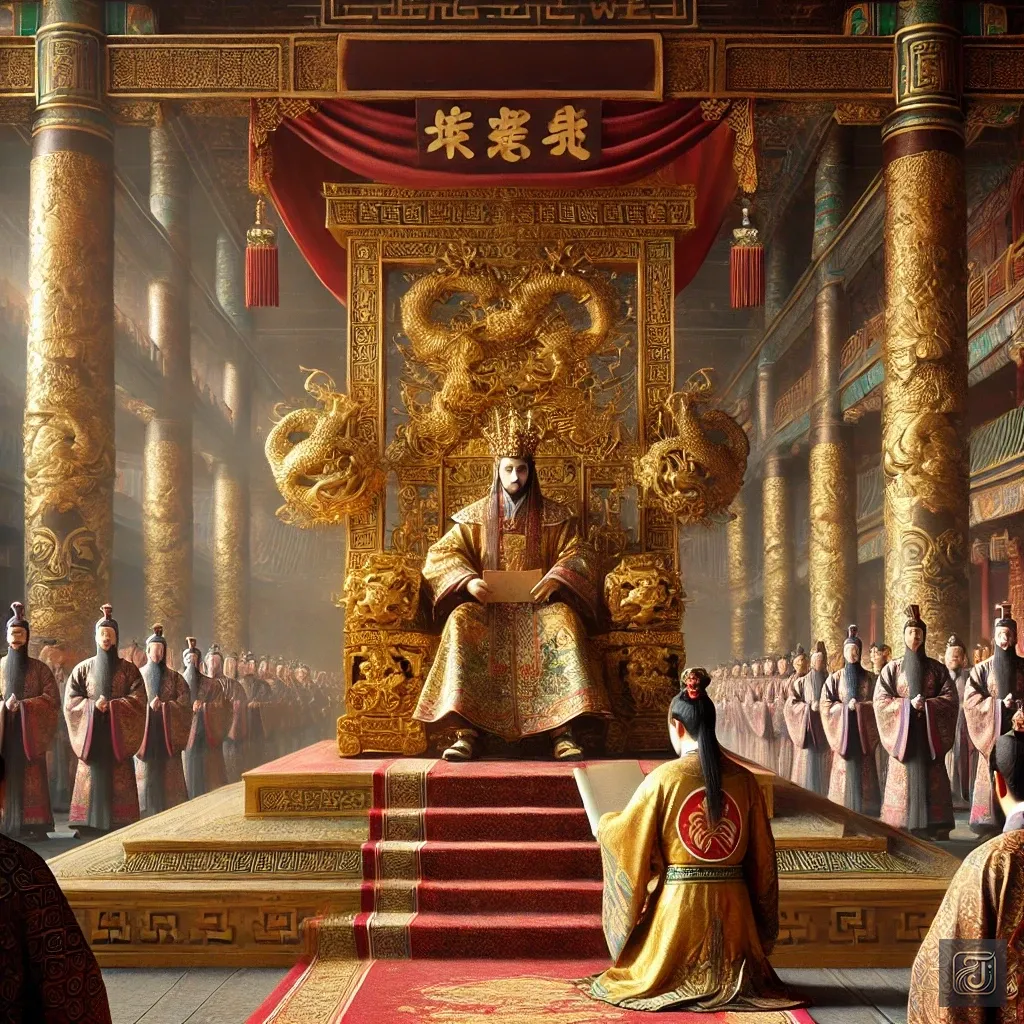
The Emperor of Wei sat on his throne, radiating an aura of authority and grandeur.
The Emperor:
“Envoy from the Yamatai Kingdom, speak. I will hear your words.”
Ata bowed respectfully and delivered Himiko’s message.
Ata:
“Your Majesty, Queen Himiko, guided by divine will, seeks to establish a bond of friendship with Wei and desires peace for her land.”
With these sincere words, Ata presented the tribute offerings.
After a moment of silence, the Emperor gave a quiet but commanding order.
The Emperor:
“Grant them the title. Recognize them as Queen of Wa, Friendly to Wei.”
Everyone in the hall held their breath in astonishment.
When a golden seal and bronze mirrors were bestowed, Ata bowed deeply in gratitude.
Ata:
“On behalf of the Yamatai Kingdom, we express our deepest thanks.”
The Emperor, his expression steady, spoke calmly.
The Emperor:
“Strive to be a nation worthy of this title.”
“Bring an end to your conflicts and lead the Wa Kingdom to peace.”
“We shall observe whether you can fulfill this responsibility.”
Summary
Ata met with the Emperor of Wei and sincerely presented Yamatai’s tribute.
Impressed by his earnestness, the Emperor acknowledged his sincerity and decided to bestow the title of Queen of Wa, Friendly to Wei, upon Himiko.
Chapter 16: The Journey Home
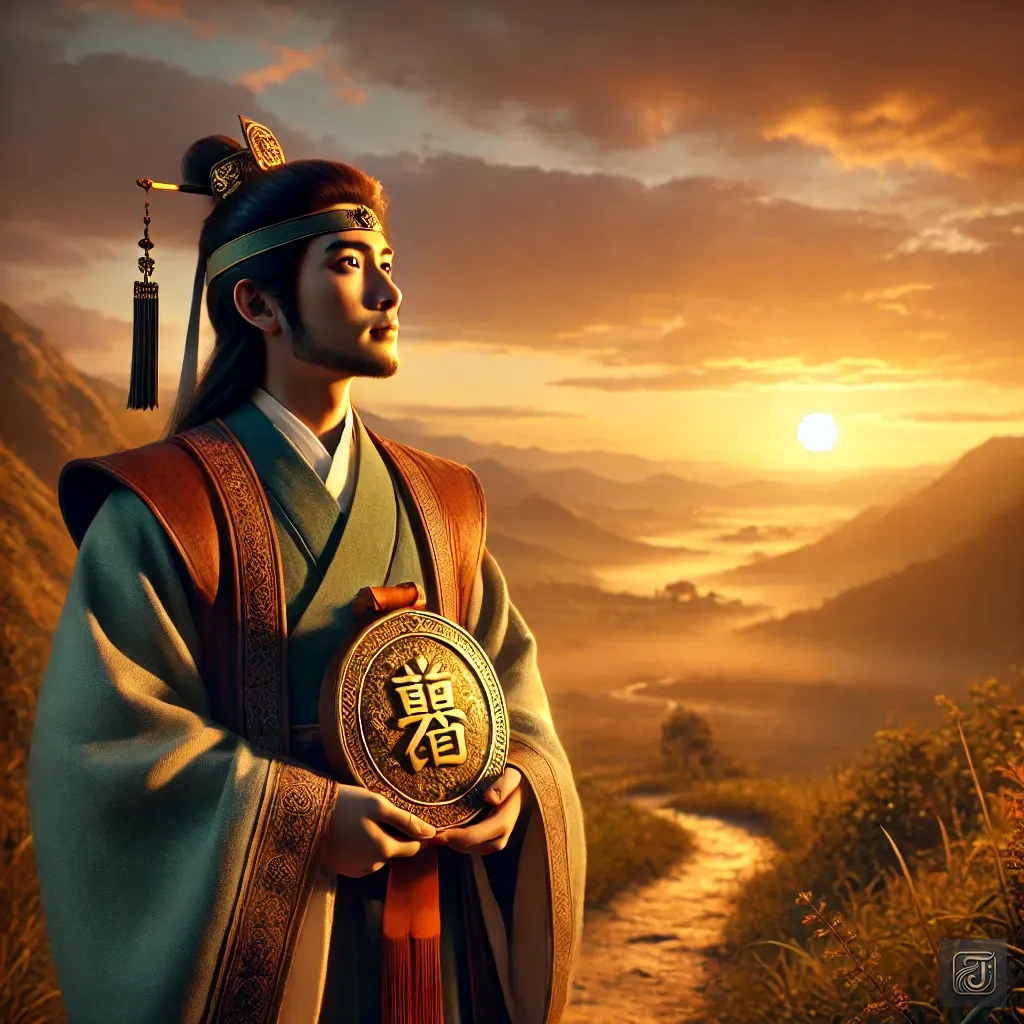
On the journey back to Yamatai, Ata carefully cradled the golden seal and bronze mirrors, gazing up at the sky.
Ata:
“Sister… we have earned Wei’s trust.”
“We must fulfill this great responsibility.”
Upon his return, when the golden seal was presented to the people, cheers erupted across the land of Yamatai.
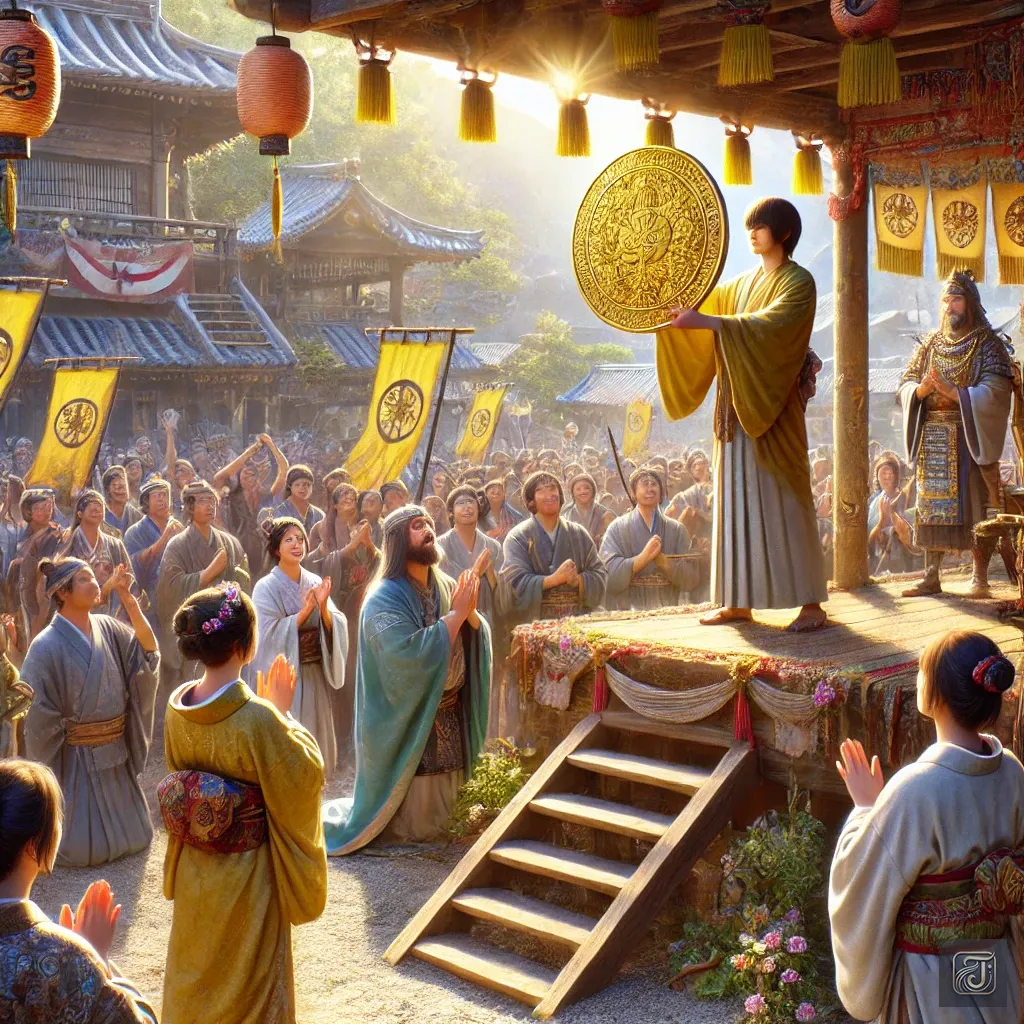
Ata:
“Thanks to Lady Himiko, the Wa Kingdom has been recognized by a great power!”
Ata watched the scene quietly, his gaze falling on Himiko’s back as she offered a prayer.
Ata:
“To preserve this peace, we must continue moving forward, no matter what…”
Himiko accepted the joy with quiet grace, offering her gratitude to the gods.
Tribute to Wei
Himiko sent envoys to Wei, pledging loyalty and friendship to Emperor Ming of Wei.
The envoys carried gifts such as silk fabrics and jewelry, showcasing the Wa Kingdom’s sincerity and goodwill.
Though the voyage was fraught with dangers, Himiko’s resolve and the envoys’ dedication bore fruit. In return, Wei honored Yamatai with the following gifts and titles:
・The Title of “Queen of Wa, Friendly to Wei”: A recognition of Yamatai as the most prominent state within the Wa Kingdom.
・A Golden Seal and Bronze Mirrors: Symbols of Himiko’s authority and legitimacy.
This diplomatic success not only solidified Yamatai’s standing among its neighbors but also elevated Himiko’s status as a ruler supported by both divine will and international recognition.
Summary
Himiko’s brother returned home, having earned the trust of Wei, and reported the success of his mission to the people.
This announcement spread hope throughout Yamatai, signaling a brighter future for the entire kingdom.
Chapter 17: Wei’s Support and the Path to Peace
With the establishment of friendly relations with Wei, Yamatai’s status rose significantly.
The title Queen of Wa, Friendly to Wei, bestowed by the Emperor of Wei, was a testament to Yamatai’s recognition as the most influential state within the Wa Kingdom.
When news of this title spread to neighboring nations, their attitudes toward Yamatai shifted dramatically.
One day, an envoy from a neighboring state visited Yamatai.
Welcomed in the central square, the envoy spoke to Himiko’s brother.
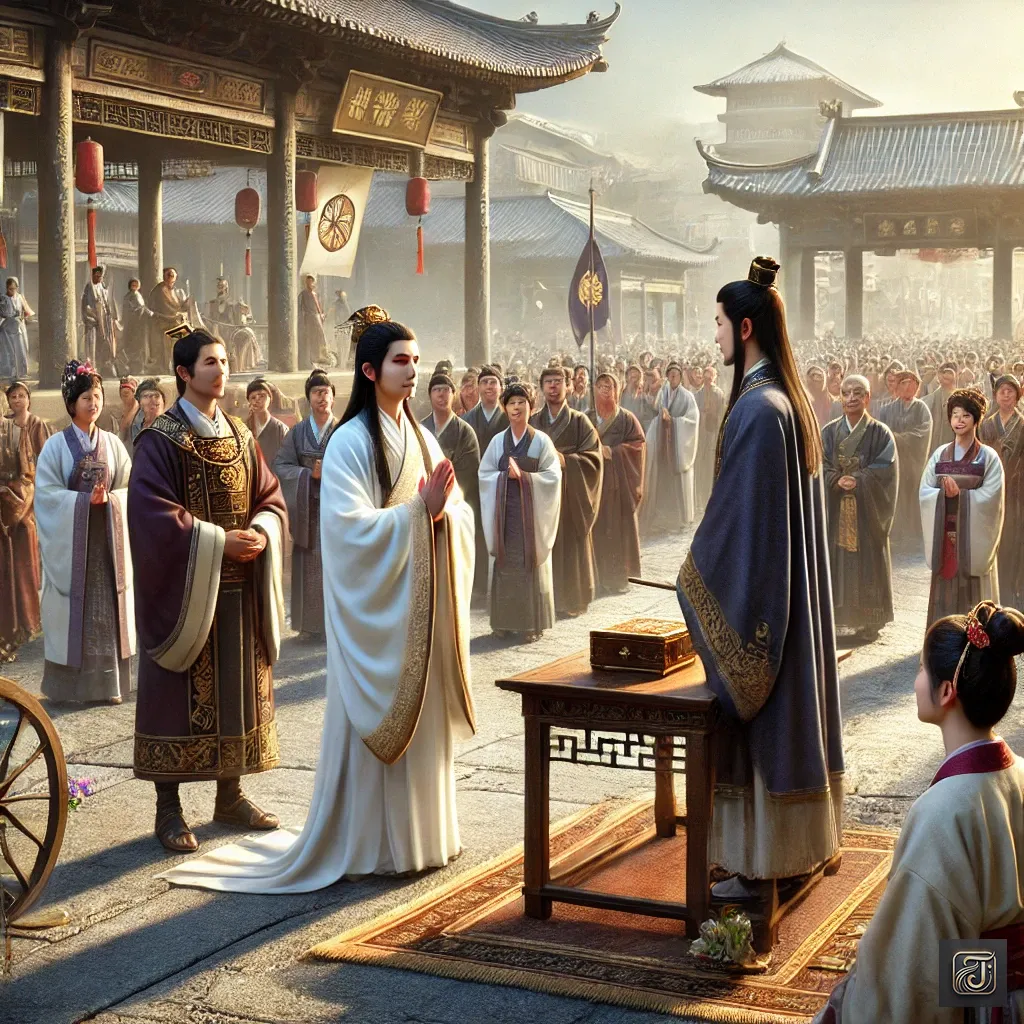
The envoy:
“I have heard that the nation ruled by Lady Himiko has gained the support of the great power, Wei.”
“We have no intention of continuing futile conflicts.”
“We seek reconciliation.”
Ata:
“Lady Himiko hears the voice of the gods and wishes to bring peace to this land.”
“We welcome discussions to put an end to the conflicts.”
Thus, negotiations between Yamatai and its neighboring states began, gradually bringing an end to the long-standing conflicts.
The golden seal and bronze mirrors bestowed by Wei played a symbolic role in Yamatai’s diplomacy.
More than mere gifts, they represented the prestige and authority of Wei.
Seeing these items, envoys from other nations softened their hostility toward Yamatai and instead began to offer cooperation.
Although Himiko did not appear in public, she continued to interpret the gods’ will and guided the peace negotiations through her brother.
When her brother came to report on the progress, Himiko quietly spoke to him.
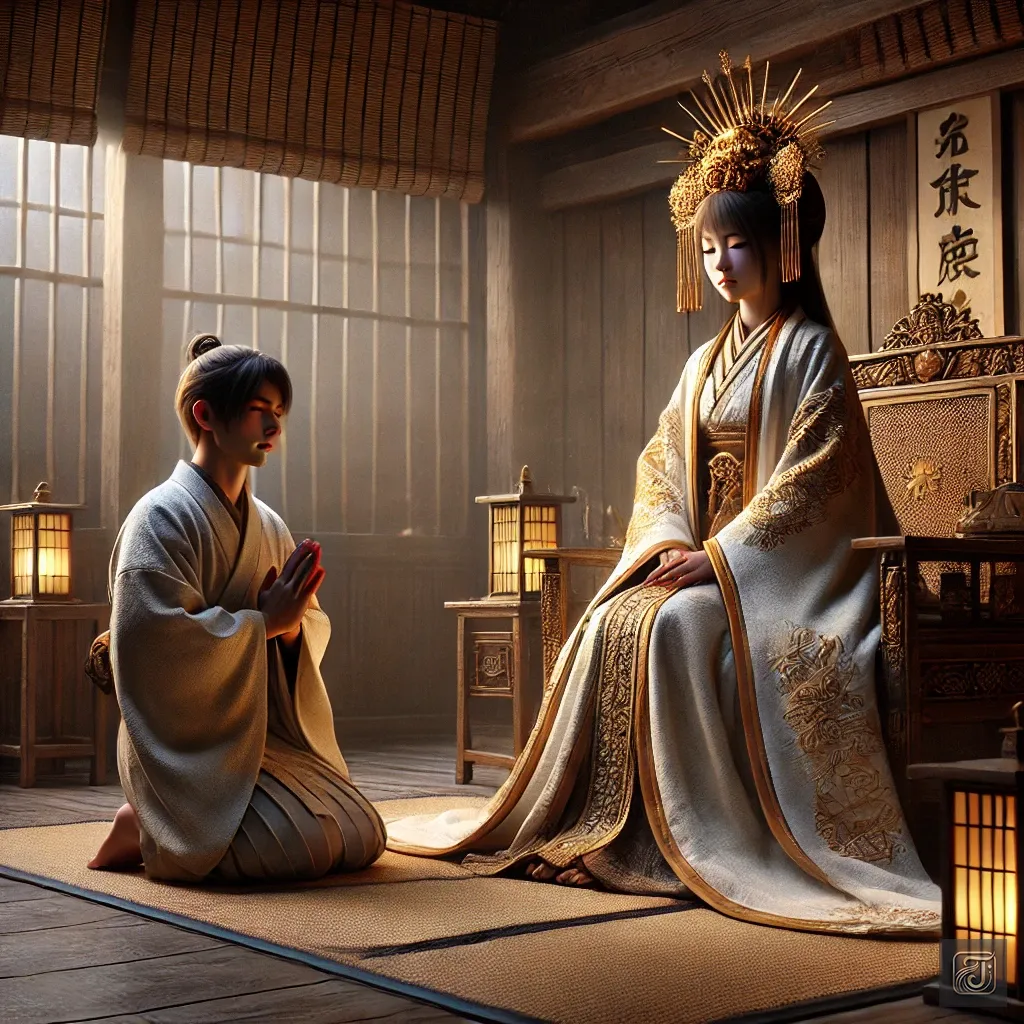
Himiko:
“The gods desire peace to come to this land.”
Ata:
“We must choose coexistence, not conflict.”
The greatest impact of Yamatai’s alliance with Wei was its role as a deterrent against conflicts with neighboring states.
Other nations, wary of Yamatai’s backing by Wei, refrained from initiating hostilities.
As a result, Yamatai successfully established peaceful relationships with its surrounding nations, and the once-chaotic land gradually returned to a state of tranquility, as if the past turmoil had been nothing but a distant memory.

Among the villagers, respect for Himiko deepened even further.
Villagers:
“Thanks to the queen, we no longer have to lose our families to war.”
“It is because Lady Himiko conveyed the will of the gods and guided us so wisely.”
Himiko’s reign heralded the dawn of a new era free from conflict.
The peace built upon the foundation of Yamatai’s alliance with Wei brought hope and stability to its people, and Himiko’s name would be passed down through generations, spoken of as if she were divine.
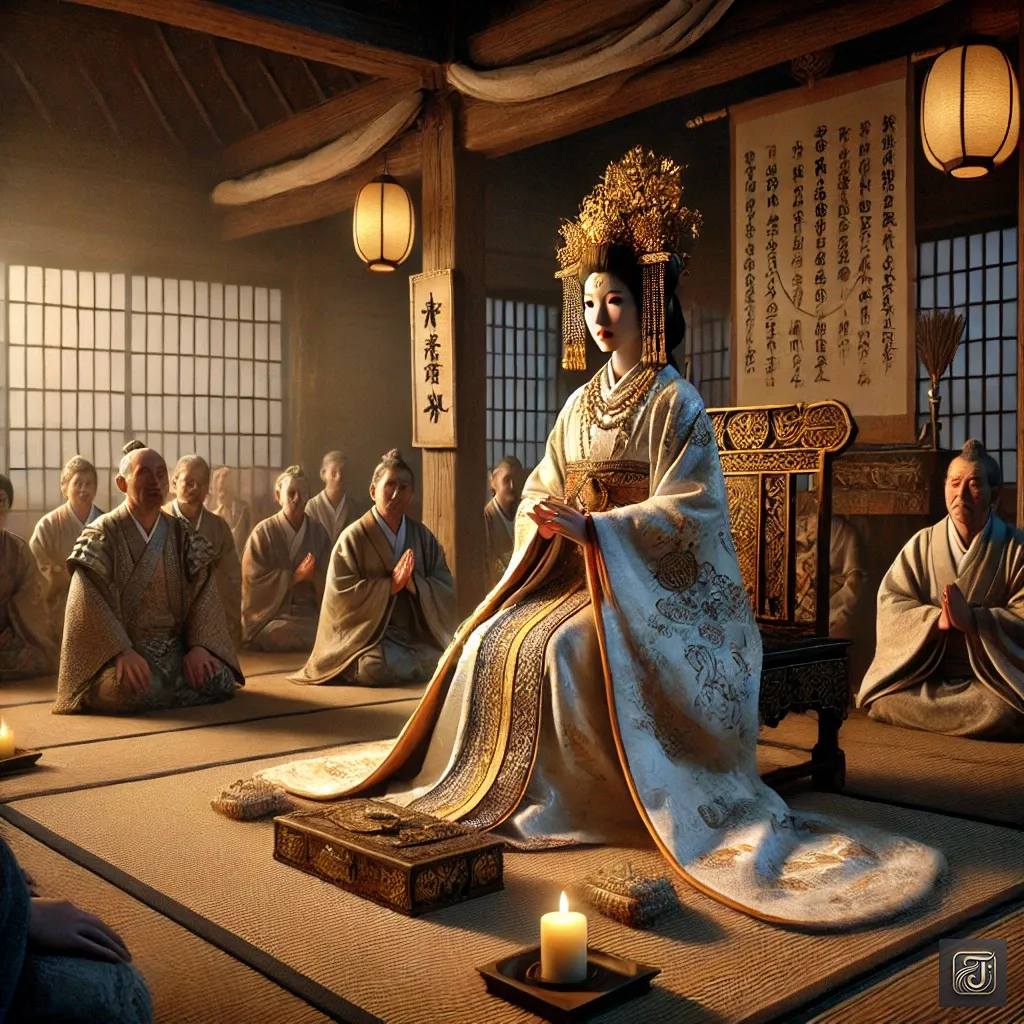
Himiko continued to lead Yamatai quietly, interpreting the will of the gods.
To the people, her presence was nothing less than a beacon of light in an age of turmoil.
Impact of the Alliance with Wei
・Diplomatic Advantage
The alliance with Wei enabled Yamatai to deter invasions from neighboring states, establishing its position as a dominant and respected power in the region.
・Economic and Cultural Development
The introduction of iron tools and pottery-making techniques from Wei significantly boosted domestic productivity and fostered cultural advancement.
・Domestic Stability
Wei’s recognition strengthened Himiko’s authority, allowing her to suppress dissent from smaller states and maintain a unified and stable governance within Yamatai.
This relationship not only safeguarded Yamatai’s sovereignty but also laid the groundwork for long-lasting peace and prosperity.
Summary
Thanks to the alliance with Wei, Yamatai was able to prevent attacks from neighboring states and establish a foundation for lasting peace.
Among the people, respect for Himiko grew even stronger.
Chapter 18: Conflict with Neighboring States and Peace Negotiations
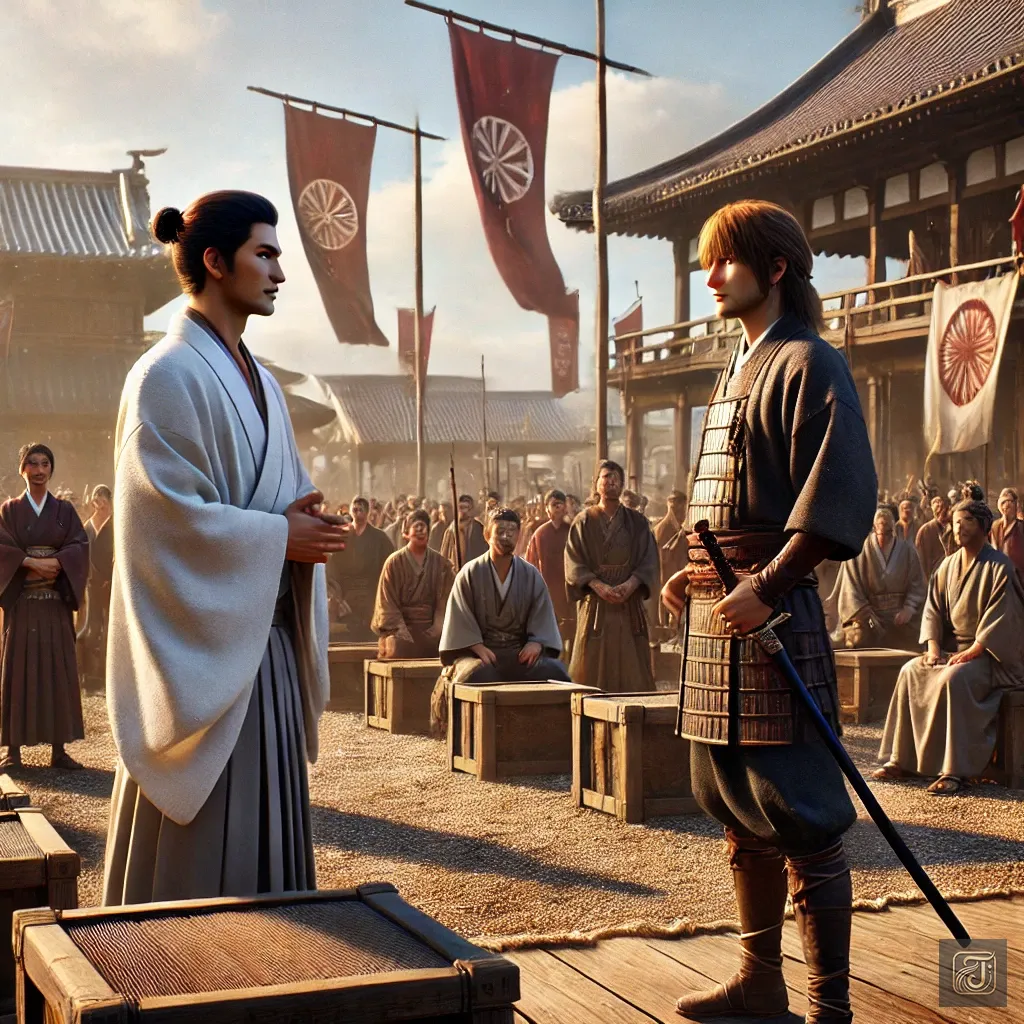
Although the alliance with Wei had been established, not all neighboring states were compliant with Yamatai’s growing influence.
A small state in the eastern Wa Kingdom, Katsukuni, openly harbored resentment toward Yamatai, emboldened by its newfound support from Wei.
Unwilling to accept Yamatai’s dominance, Katsukuni began planning an invasion.
One day, an envoy from Katsukuni, a man named Inaba, arrived in Yamatai.
Inaba, known for his sharp gaze and rough manner of speech, carried a deep sense of duty to protect his people.
Inaba:
“Isn’t Yamatai trying to use Wei’s power to dominate the entire Wa Kingdom?”
Ata:
“We have no such intention.”
“Our aim is to avoid conflict and seek coexistence based on the will of the gods.”
Inaba:
“Coexistence? Speaking of the ‘voice of the gods’ means nothing to us. Do not think mere words will make us withdraw our troops.”
Ata:
“We wish to build peace not with weapons, but through trust.”
“Please, I ask you to hear what Yamatai has to say.”
Summary
As tensions with the neighboring Katsukuni escalated, Ata, guided by Himiko’s divine will, engaged in peace negotiations to find a path toward ending the conflict.
Chapter 19: Katsukuni’s Invasion and Yamatai’s Retaliation
A few days later, Katsukuni’s army launched an attack on the border village of Yamatai.
Leading the army was Inaba, a man torn by the deep conflict between his duty to fight and his desire to protect his people.
Inaba had grown up in harsh conditions.
He lost his father to war at a young age, and when his mother fell ill, he was overwhelmed by his helplessness.
He poured all his efforts into raising his younger sister, but she, too, became a casualty of war.
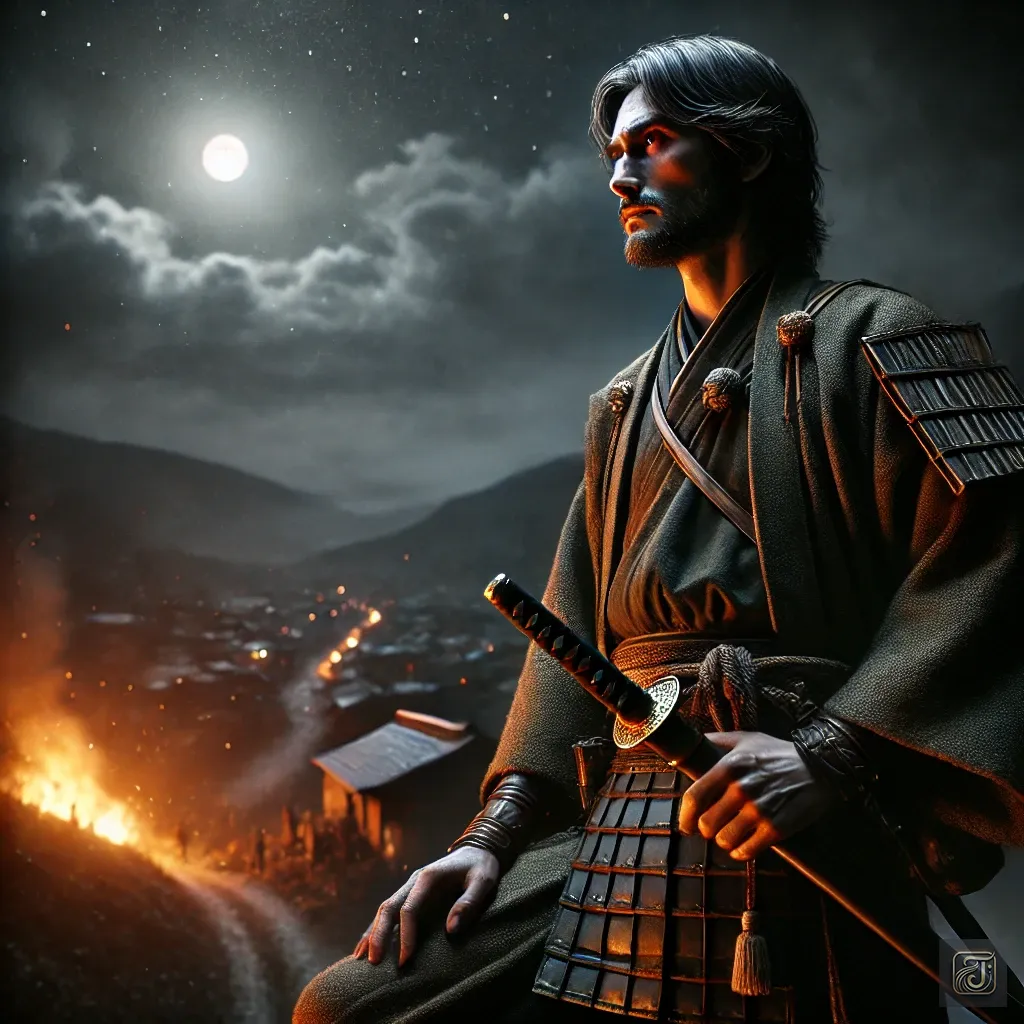
Inaba:
“I couldn’t protect my sister…”
Inaba murmured to himself, gazing up at the night sky.
His eyes were filled with a mix of anger and sorrow.
Inaba:
“I will not lose anyone else.”
“If it means protecting them, I must take up arms.”
His act of invasion was not driven by mere ambition.
Rather, it was a desperate means to shield the vulnerable.
As flames engulfed the village, the terrified villagers fled into the mountains, seeking safety.
The piercing sounds of arrows and the cries of anguish tore through the night sky.
The following morning, Himiko’s brother, Ata, received an urgent report.
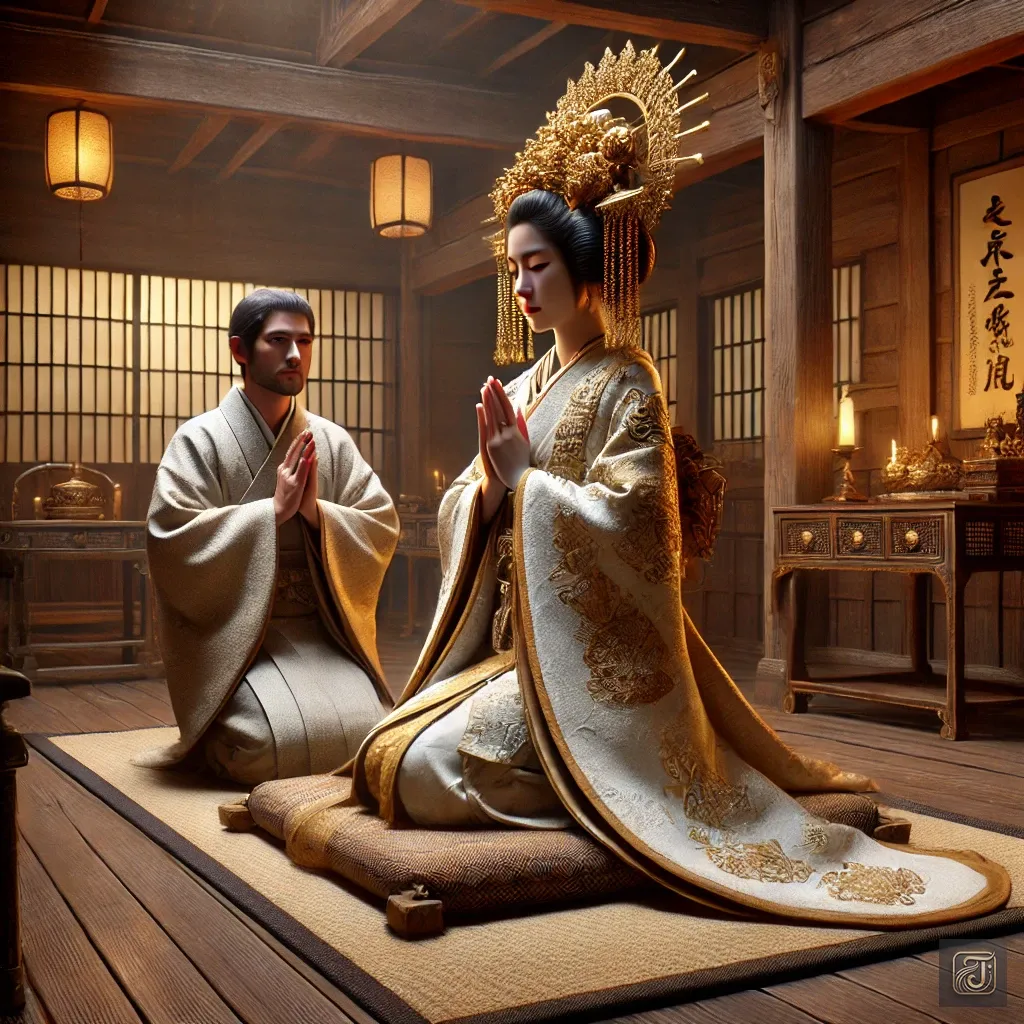
Ata:
“Sister, a border village has been attacked.”
“There are many casualties.”
“What do the gods say about this?”
Himiko:
“We must bring an end to this conflict.”
“Let us lay down our weapons first and persuade them with the will of the gods.”
Ata:
“Understood.”
“I will go to negotiate peace myself.”
As flames consumed the village, Ata led his troops and rushed to the scene.
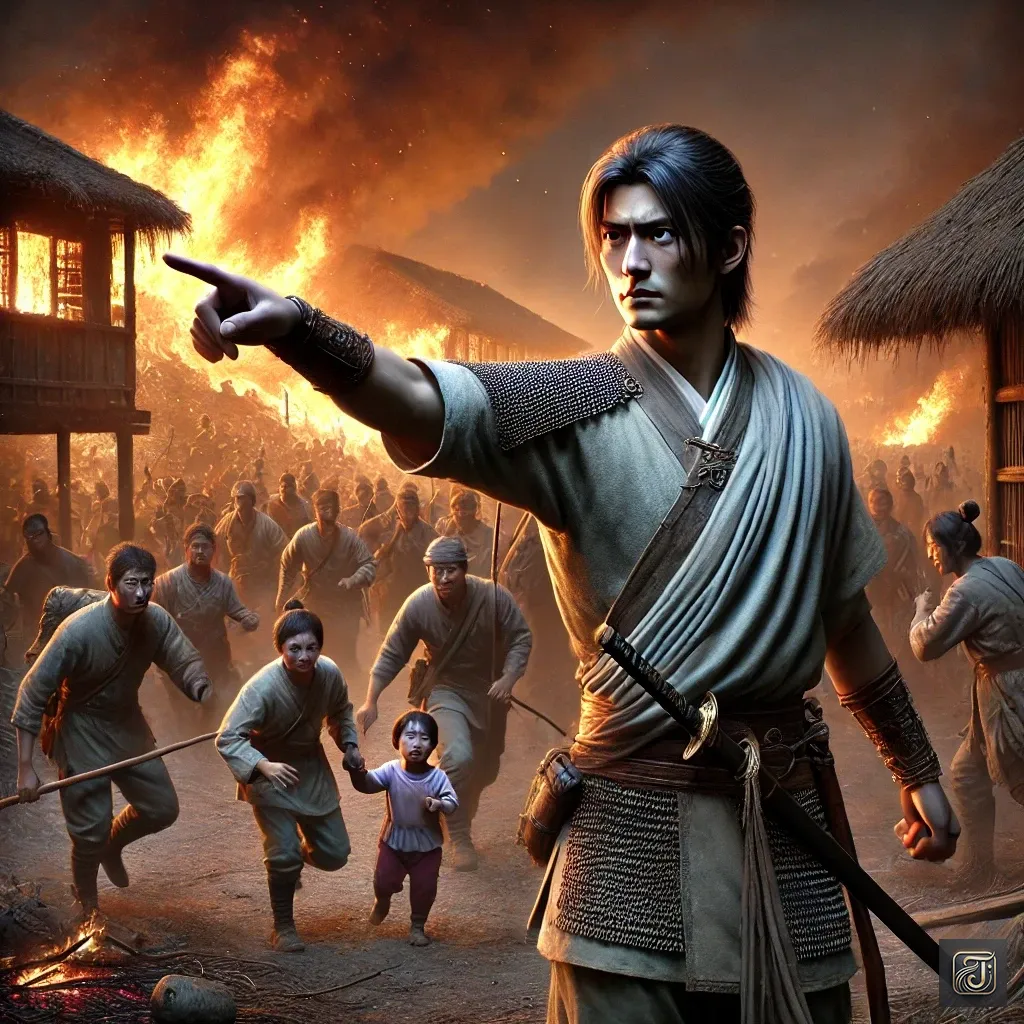
Ata:
“We must not strike first.”
“Focus on protecting the villagers and finding a way to halt the enemy’s advance.”
The Katsukuni army was led by Inaba himself.
Standing on a hill overlooking Ata’s forces, he muttered with a grim expression.
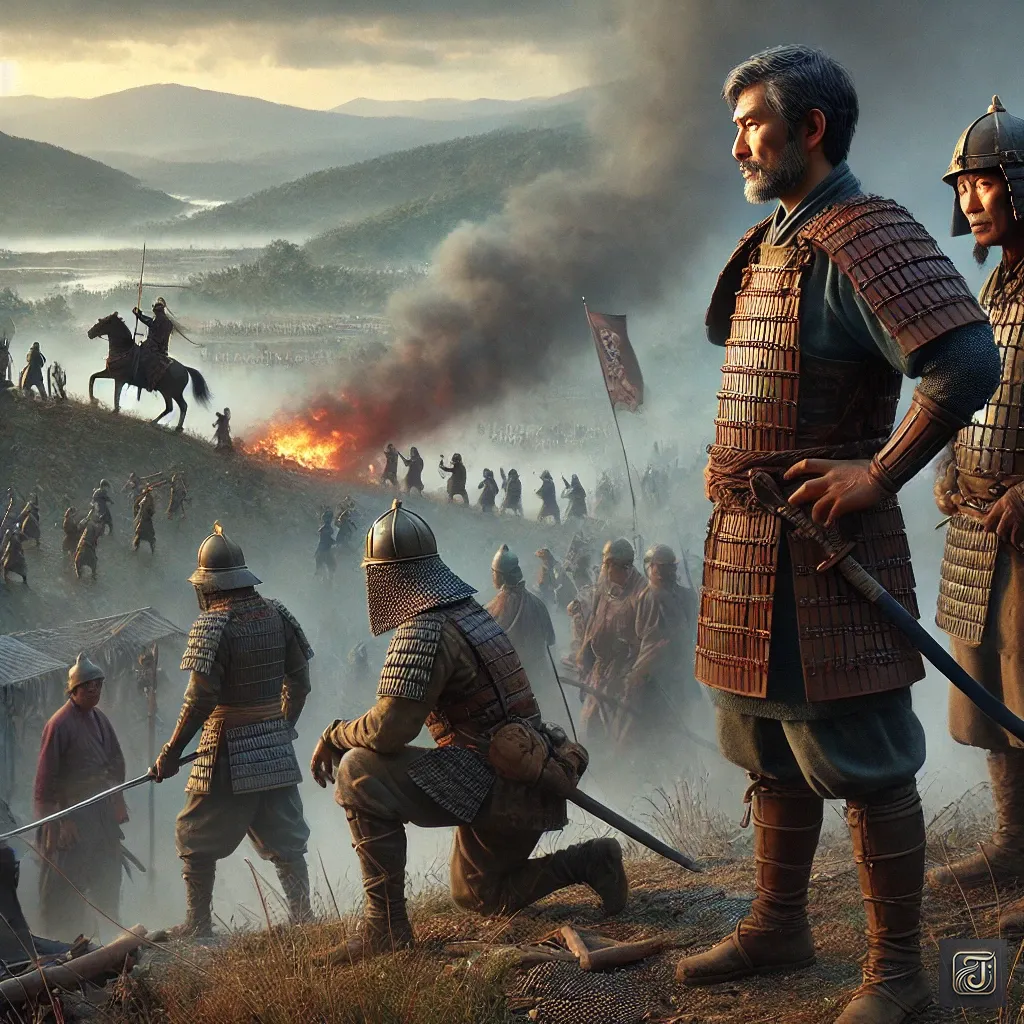
Inaba:
“Let’s see what kind of talent this so-called brother of Himiko possesses.”
While ensuring the villagers were evacuated to safety, Ata skillfully deployed traps to stall Inaba’s advancing forces.
Summary
Despite facing an invasion from Katsukuni, Yamatai, under Ata’s leadership and guided by Himiko’s divine will, responded calmly and effectively, managing to suppress the conflict.
Chapter 20: Negotiations for Peace
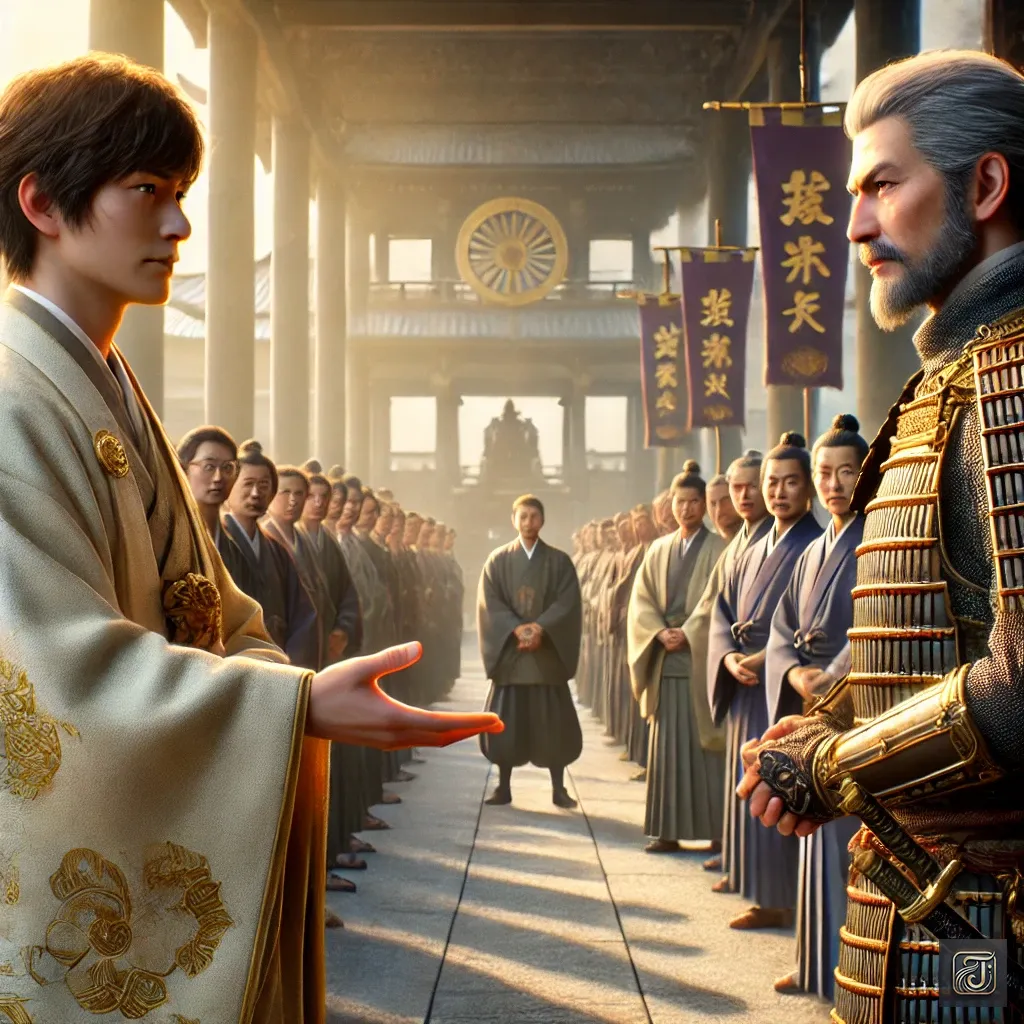
Following Himiko’s orders, Ata once again approached Inaba to negotiate peace.
The square where the representatives of both nations faced each other was thick with tension.
Delegates from both sides stood in rows, their faces grim. Inaba, glaring at Ata with evident displeasure, spoke sharply.
Inaba:
“Tell me why you’re here. If this is just more pointless chatter, it’s not worth my time.”
Ata:
“Lord Inaba, I understand the reasons for your hostility toward us.”
“But the desire to protect our people is something we share.”
For a moment, Inaba’s stern expression faltered.
He was still grieving the loss of his sister in the recent conflict.
Inaba:
“Words mean nothing to someone who has lost a sister.”
Ata:
“I cannot ease the pain of that loss.”
“But continuing this conflict will only lead to more lives lost, more families broken.”
“I do not wish to see any more of my people perish.”
“And I believe, deep down, you feel the same way.”
Inaba let out a deep sigh, his voice strained as he forced out his words.
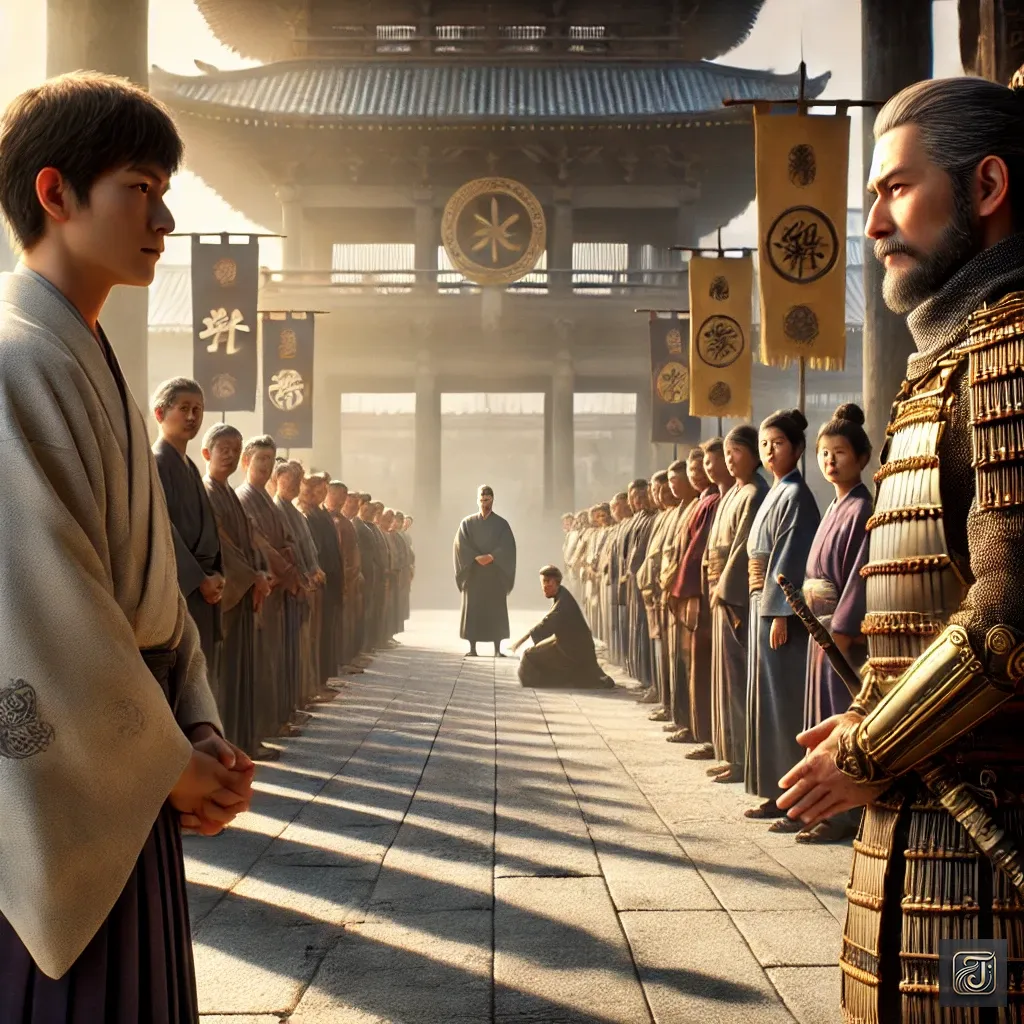
Inaba:
“Now that Yamatai has gained Wei’s backing, are you planning to dominate even our nation?”
Ata:
“We have no such intentions.”
“We desire peace.”
“The gods themselves admonish against conflict.”
Inaba:
“How can anyone believe in the will of the gods?”
“If the gods truly exist, why didn’t they save my sister?”
“Why did she have to die?”
Inaba’s anguish was the very embodiment of a heart scorched by the flames of war.
Inaba:
“If we don’t strike first, you’ll eventually seek to destroy us!”
“And when that happens, my people will be the ones to suffer and die all over again!”
Ata took a step forward, his voice steady and filled with compassion as he spoke.
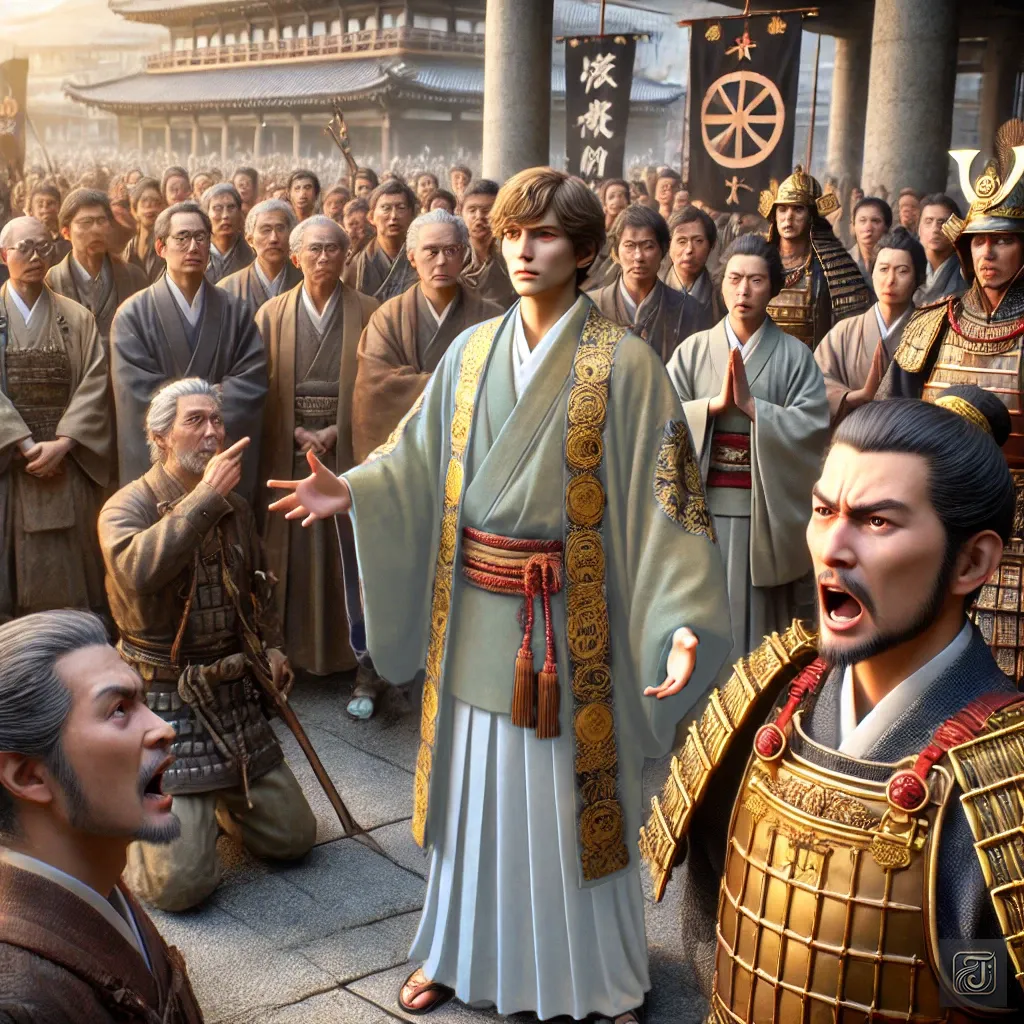
Ata:
“Then we will be the first to lay down our weapons.”
His words sent a ripple of murmurs through the gathered crowd.
Inaba:
“Lay down your weapons?”
“I never expected to hear such words from you.”
Ata:
“We follow the guidance of Lady Himiko.”
“We wish to build peace, not through conflict, but by choosing the path of coexistence.”
Summary
Through his negotiations with Katsukuni’s Inaba,
Ata demonstrated Yamatai’s sincerity by offering to lay down their weapons.
This act of goodwill stirred Inaba’s heart, paving the way for the pursuit of peace.
Chapter 21: The Establishment of Peace
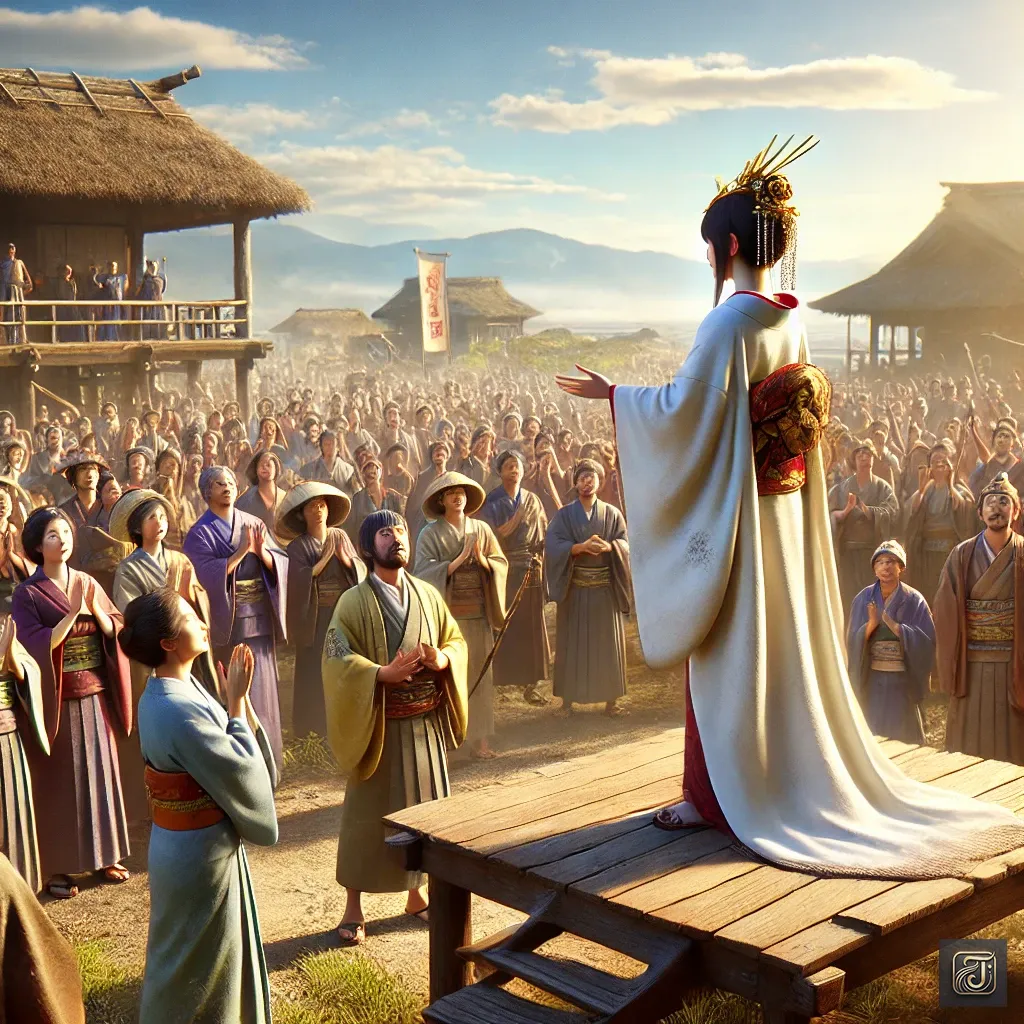
Under Himiko’s decision, Yamatai declared its intention to lay down arms.
This sincere gesture moved Inaba’s heart, and at long last, peace was achieved.
As Inaba prepared to leave, he turned to face Ata.
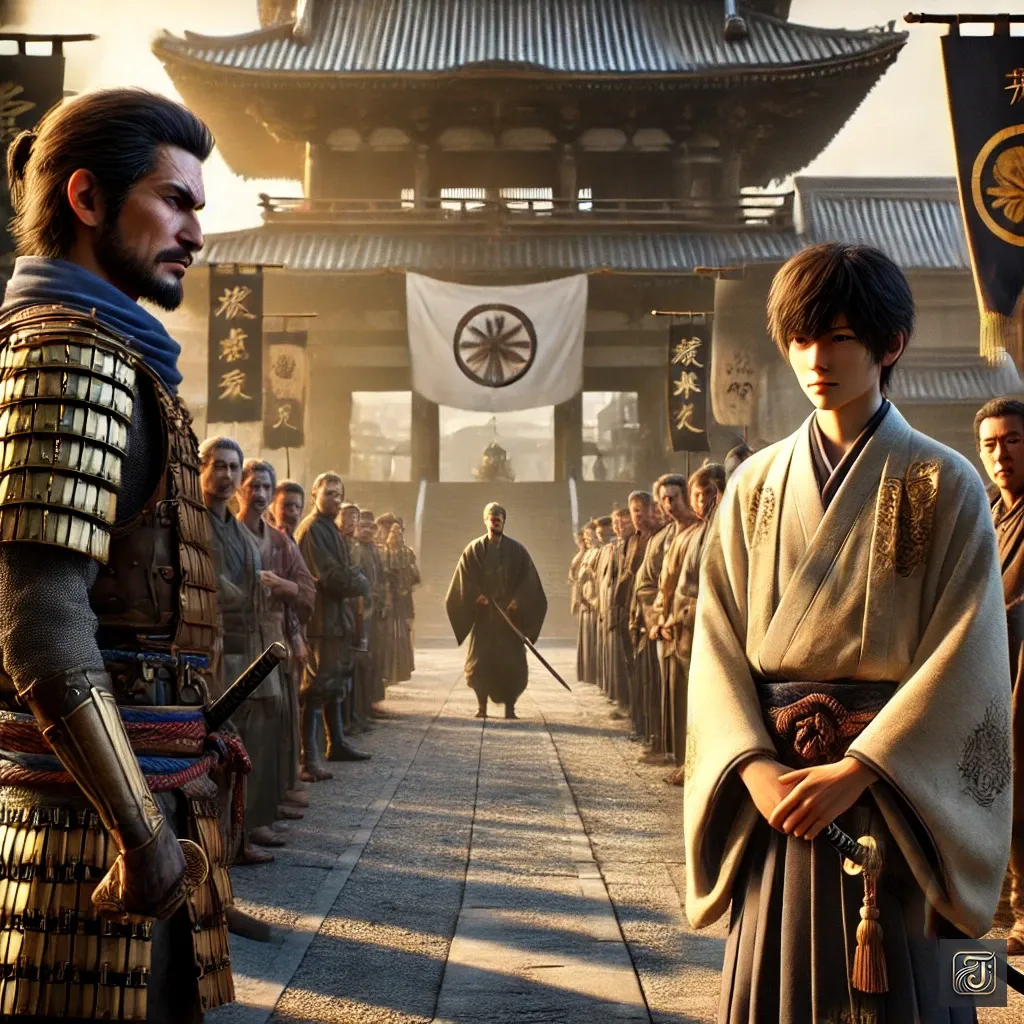
Inaba:
“Very well.”
“I will see for myself if your words are true.”
“I won’t judge you by who you are now, but by who you become in the days ahead.”
“However, don’t think I fully trust you yet.”
“If I find that your words were a lie, I will not hesitate. Next time, I will come for what you hold most dear.”
Leaving those words behind, Inaba departed from Yamatai.
Ata went to report to Himiko.

Ata:
“Sister, peace has been established.”
Himiko smiled gently and offered a prayer of gratitude to the gods.
Himiko:
“My brother, your dedication has saved our people.”
“Let us continue to follow the will of the gods and guide this nation together.”
Ata bowed deeply, his loyalty to his sister and their mission etched firmly into his heart.
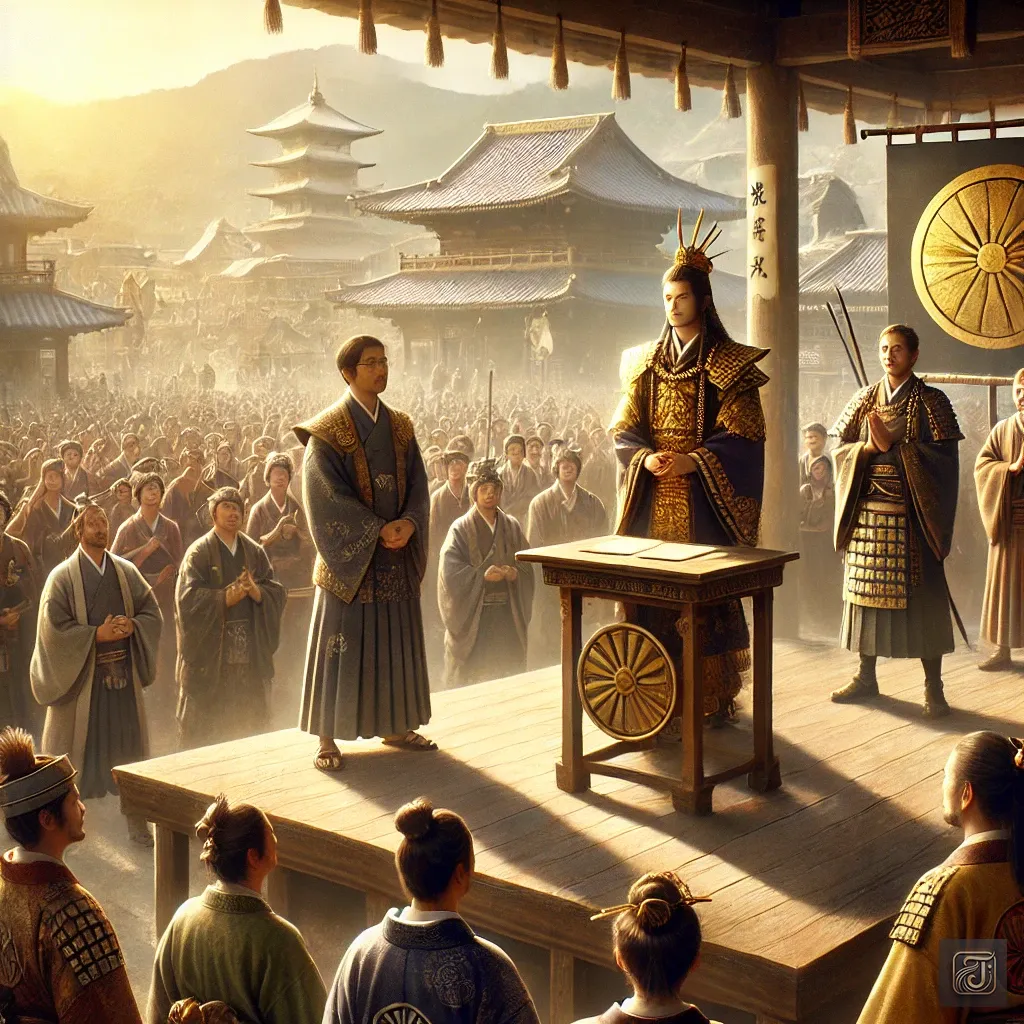
After the peace negotiations, Yamatai and its neighboring state established an agreement to respect each other’s territories, bringing the conflict to a temporary halt.
The golden seal and bronze mirrors bestowed by Wei were raised as symbols of this newfound peace.
The villagers felt a deep sense of relief and once again began to enjoy the blessings of tranquility.
In the village square, expressions of gratitude toward Himiko were unending.
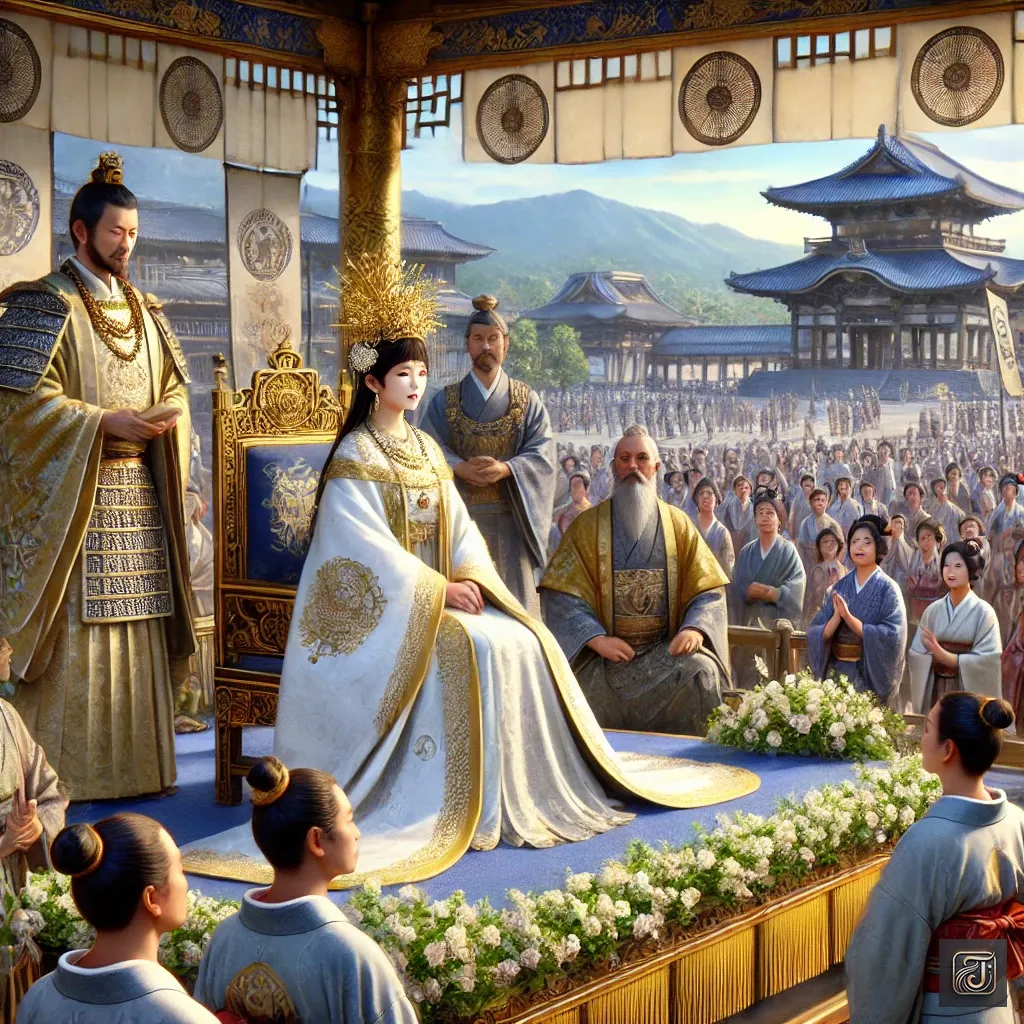
Villagers:
“Thanks to Queen Himiko’s power, the conflict has been stopped!”
“A nation with someone who can convey the gods’ will is strong.”
Upon receiving such reports, Himiko quietly offered prayers to the gods.
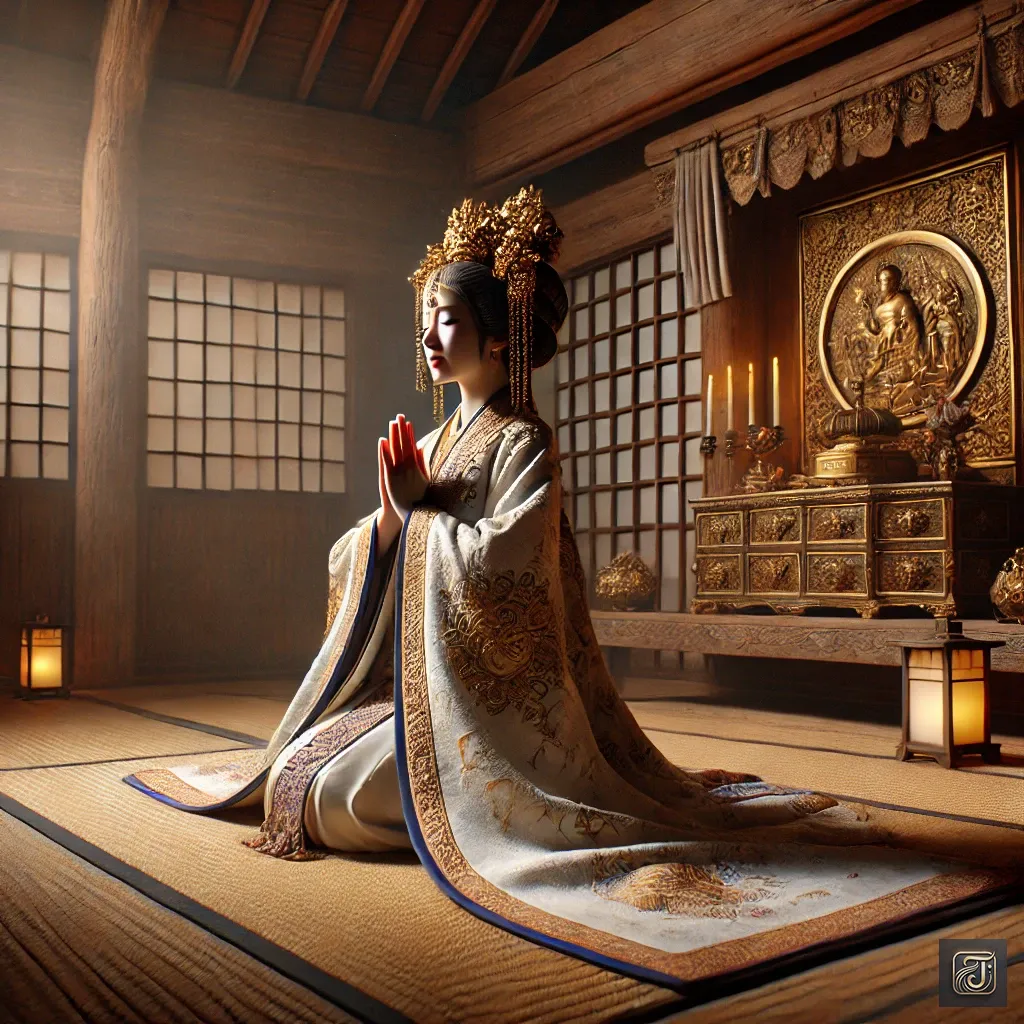
Himiko:
“Even if the seeds of conflict cannot be completely eradicated,
May this land be blessed with lasting days of peace.”
This successful peace negotiation marked a turning point, solidifying Yamatai’s position as a nation both respected and feared by other states in the Wa Kingdom.
Himiko’s efforts toward peace during her reign became even more steadfast, further strengthening the stability and prosperity of Yamatai.
Summary
Through the tireless efforts of Himiko and Ata, peace was established with Katsukuni.
The war came to an end, paving the way for lasting harmony between Yamatai and its neighboring states.
Chapter 22: Inaba’s Change of Heart After the Peace
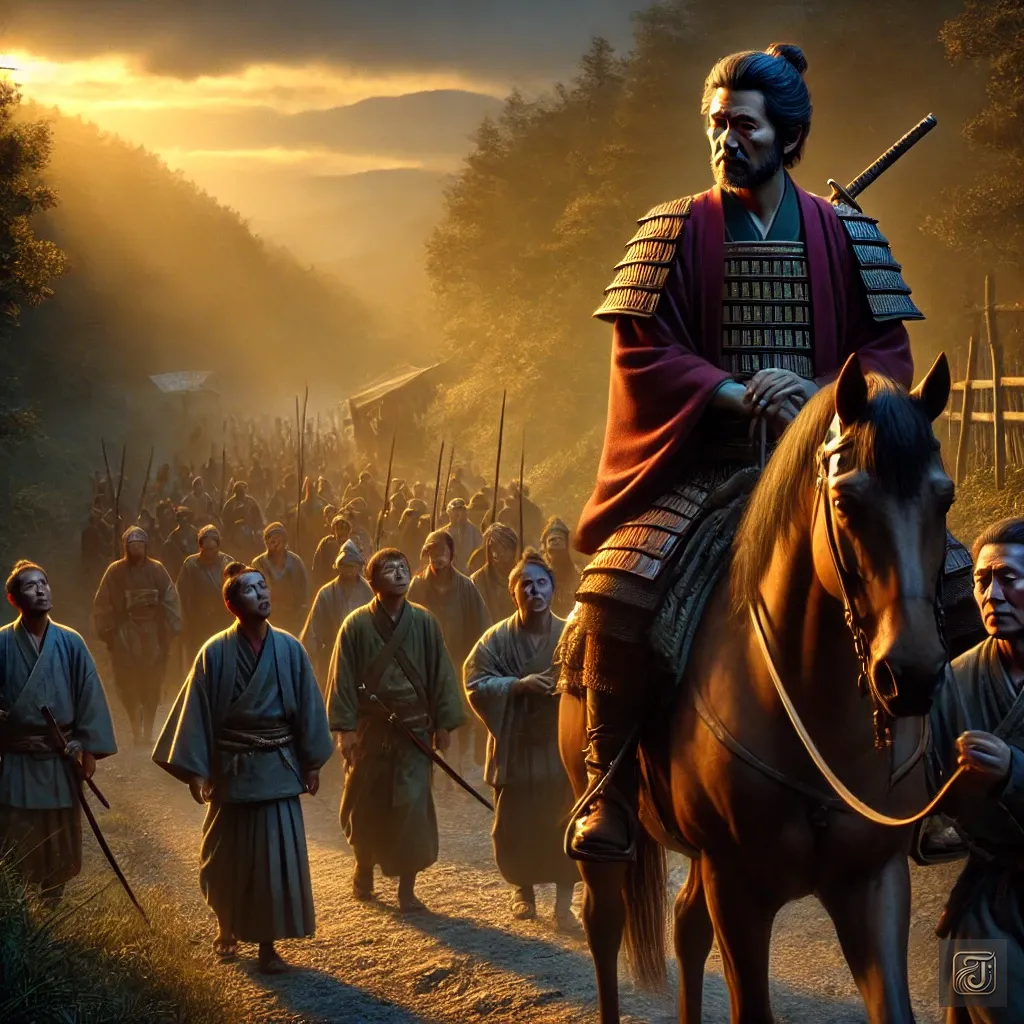
The day after peace was established with Yamatai, Inaba led his army back to Katsukuni.
However, his expression was far from cheerful.
From atop his horse, Inaba gazed at his soldiers.
They all bore weary faces, yet a glimmer of relief could be seen in their eyes.
On the journey home, one of Inaba’s subordinates muttered.
subordinates:
“Lady Himiko’s brother, Lord Ata, truly seemed like an honorable man.”
“I was shocked when he said they would lay down their weapons, even as our enemy.”
Hearing this, Inaba furrowed his brow slightly.
Inaba:
“Whether their sincerity is genuine remains to be seen.”
“But… I can’t deny that the man’s words felt genuine.”
It was something Inaba himself had sensed.
Ata’s calm and steadfast demeanor, coupled with his heartfelt desire to protect his people,
had shaken something deep within Inaba’s heart.

Inaba muttered silently to himself.
Inaba:
“They might be satisfied that the fighting has ended.”
“But I still can’t come to terms with it.”
“They killed my sister.”
That night, as he sat alone by the campfire, staring into the flickering flames, images of his lost sister and the people he had sworn to protect filled his mind.
Inaba:
“Peace has come to our land.”
“As he said, there will be no more victims like my sister…”
“Yet, why do I feel so hollow inside?”
Within his heart, conflicting emotions raged—his yearning for revenge and the guilt of having accepted peace.
That same night, Inaba dreamed of his sister.
She appeared, walking through the fields with a gentle smile, her expression peaceful and serene despite her life having been claimed by war.
In the dream, she spoke softly to him.

Inaba’s sister:
“You don’t have to fight anymore, big brother.”
“No one else has to die.”
“So please, don’t let yourself be hurt anymore.”
When Inaba awoke, he sat motionless by the flickering firelight, staring blankly into the night, his sister’s words echoing in his heart.
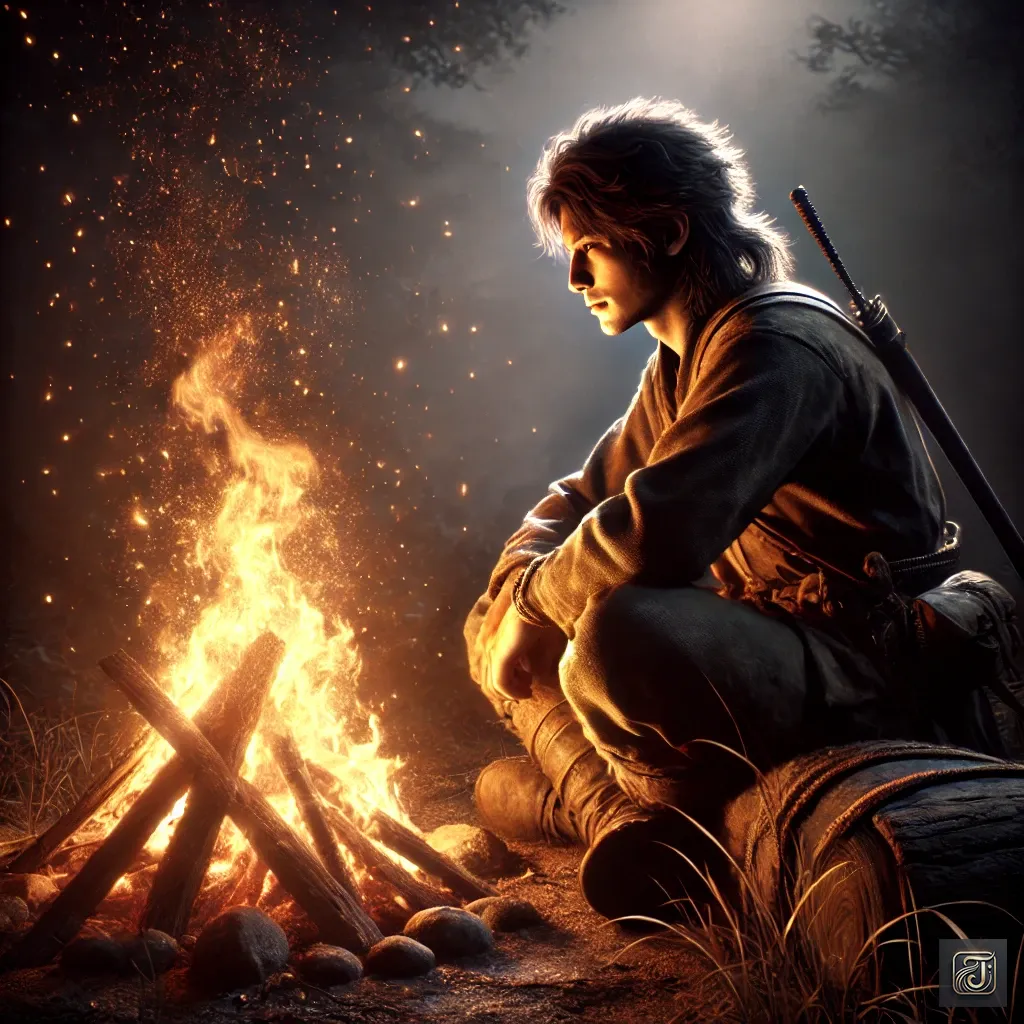
Inaba:
“Was fighting truly the right path…?”
“Have I been forgiven by my sister?”
Inaba’s thoughts swirled as he questioned himself, his heart heavy with doubt and longing for peace.
Upon returning to Katsukuni, Inaba gathered his people and spoke with determination.
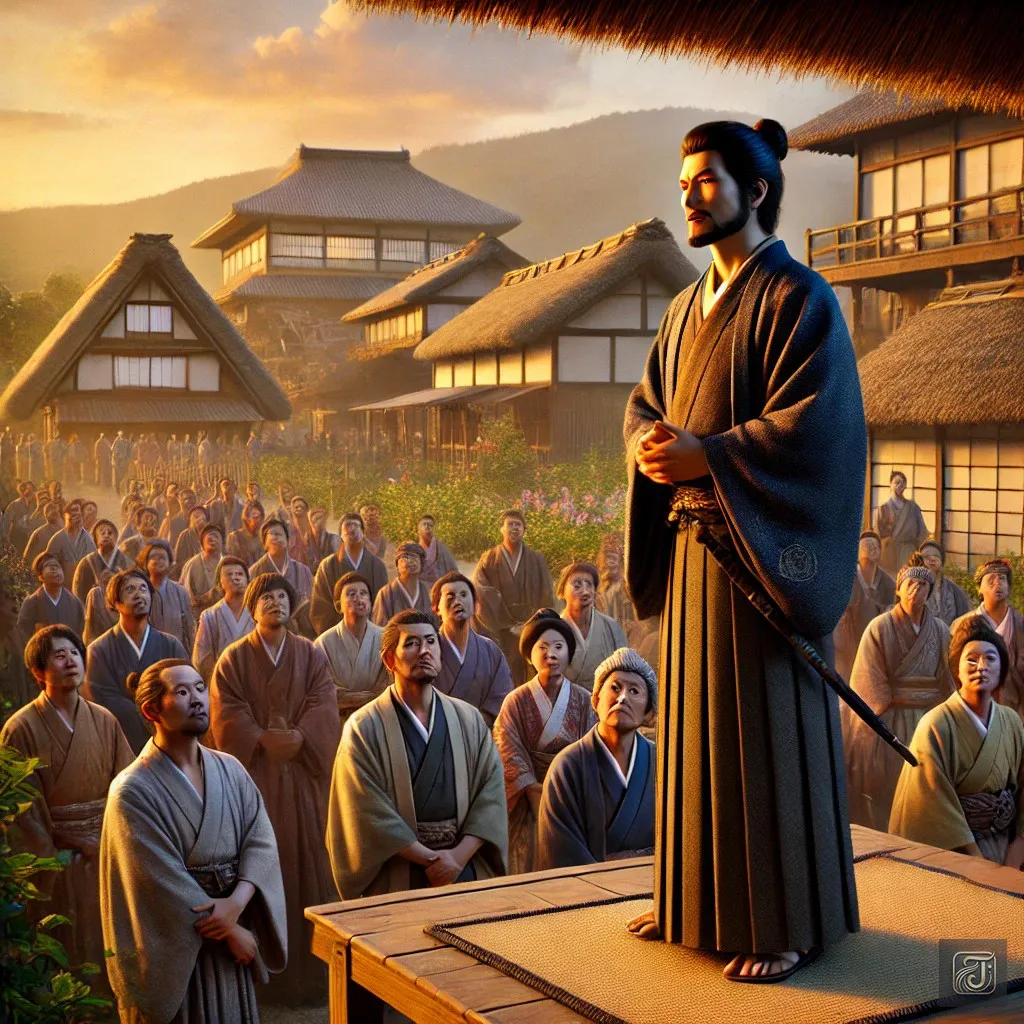
Inaba:
“We have lived within the shadow of war for far too long.”
“But I have decided to place my trust in the path of peace that Yamatai has shown us.”
“For the sake of ensuring that no more lives are sacrificed.”
There was an unprecedented weight in his words, a sincerity that resonated deeply.
Slowly, the people of Katsukuni began to feel a glimmer of hope for peace, a light spreading gradually through their weary hearts.
Summary
Even after the establishment of peace, Inaba continued to grapple with inner conflict.
However, the sincere actions of Himiko and Ata deeply moved him, leading him to firmly resolve to accept peace and embrace a path toward coexistence.
Chapter 23: Days of Living with the Gods

Yamatai reigned as a queenly kingdom, uniting over 30 smaller states under its influence.
Yet, Queen Himiko never appeared before the public.
Instead, she devoted herself to divining the gods’ will, guiding the nation with spiritual authority.
While her younger brother managed the practical affairs of governance,
Himiko remained focused on her sacred role as a shaman.
With the end of the war, the peace that followed brought profound changes to the land.
Homes that had once been reduced to ashes were rebuilt, and the farmlands regained their vitality.
The villagers, wearing expressions of relief, gathered and spoke among themselves with newfound hope for the future.
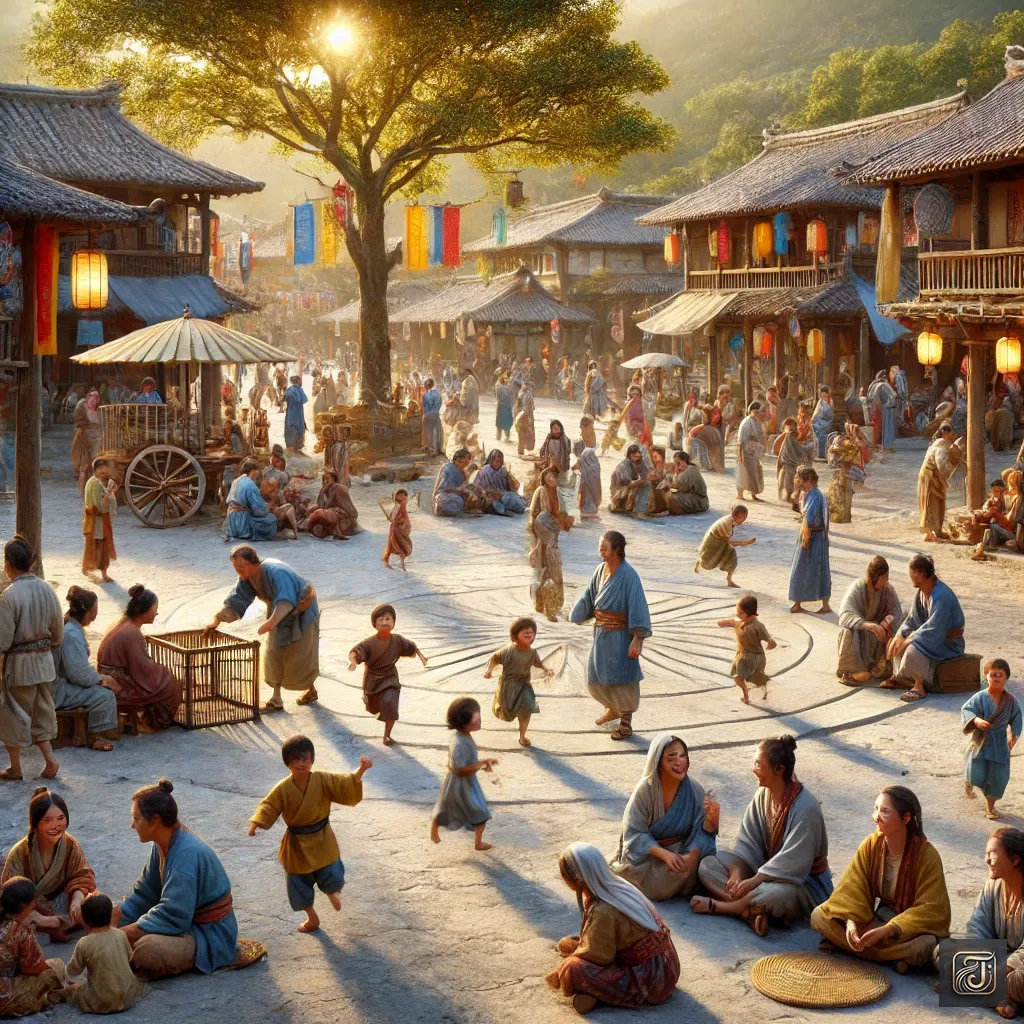
Villagers:
“We’ll no longer hear the terrifying sounds of war, will we?”
“I never thought the day would come when we could spend nights in peace with our families.”
In the village square, children laughed and ran around, while elderly farmers shared their joy over a bountiful harvest.
Villagers:
“It’s thanks to Queen Himiko, who has guided this nation alongside the gods.”
“Her brother, too, has worked tirelessly. With them, our country is surely secure.”
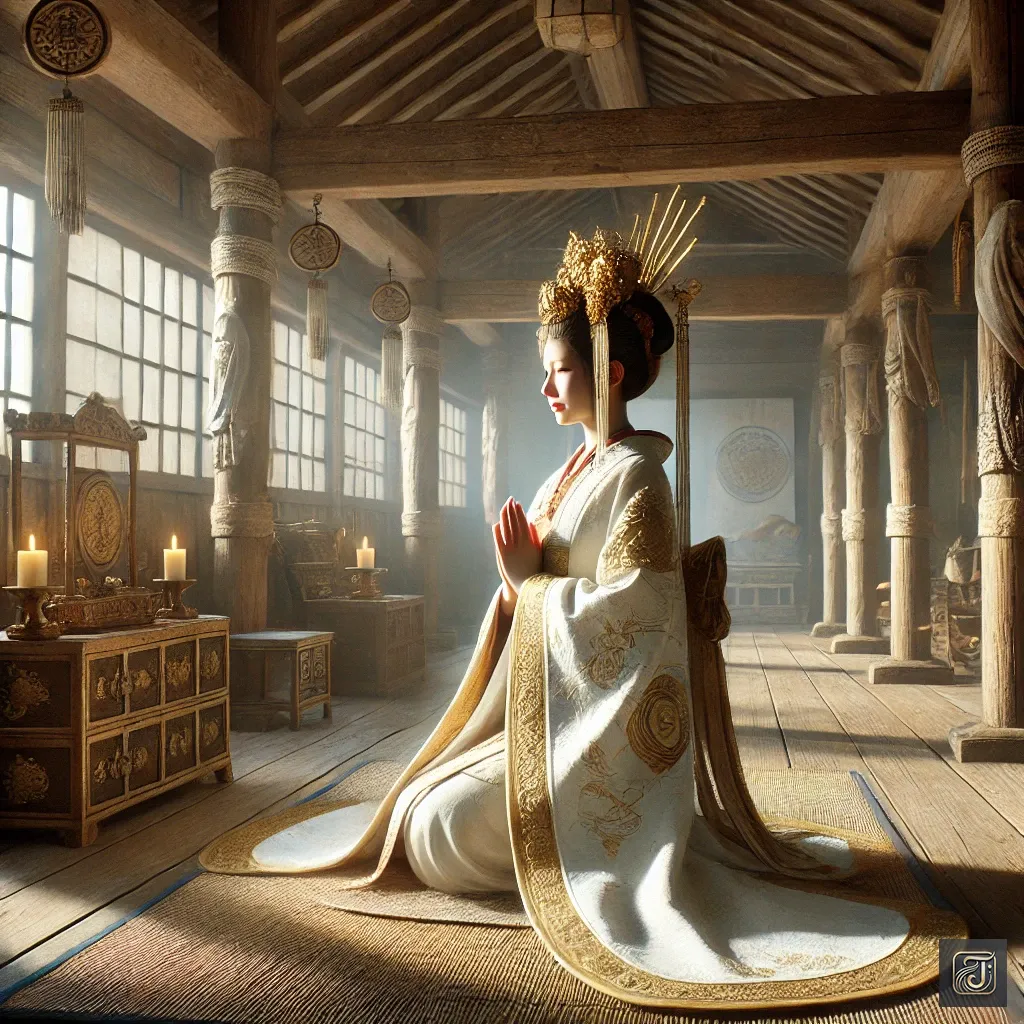
Himiko listened quietly to the reports, offering a silent prayer of gratitude to the gods in her heart.
Himiko:
“May this peace last for a long time.”
Her brother, observing her serene figure, spoke softly.
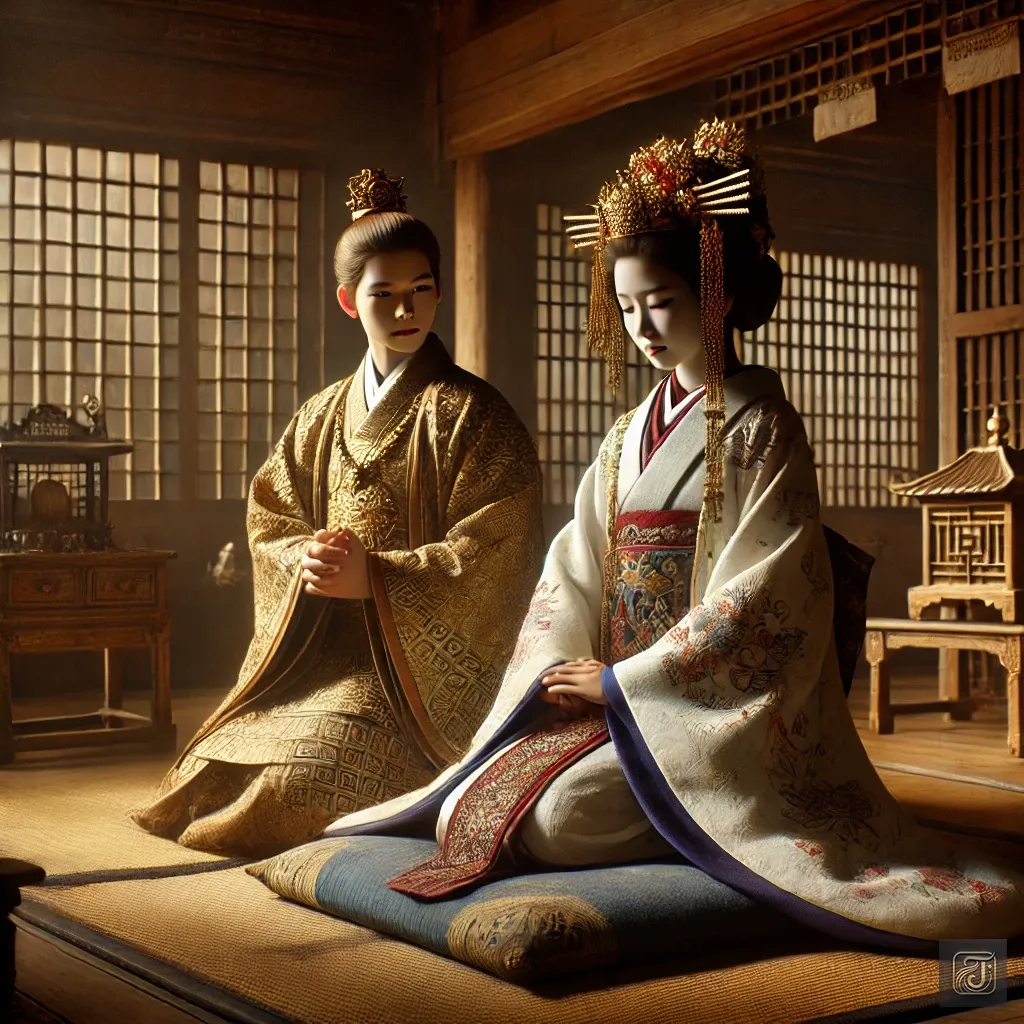
Ata:
“Sister, the people of this nation are all grateful to you.”
Himiko smiled, though there was a trace of loneliness in her expression.
Himiko:
“The peace of this land is my greatest joy.”
Understanding her solitude, Ata silently watched over her, vowing to continue supporting her unwaveringly.
Summary
Yamatai basked in peace, guided by Himiko’s spiritual leadership and Ata’s practical governance,
which together brought stability to the nation.
The people reclaimed their tranquil days, free from the shadow of conflict.
Chapter 24: A Reunion with Inaba
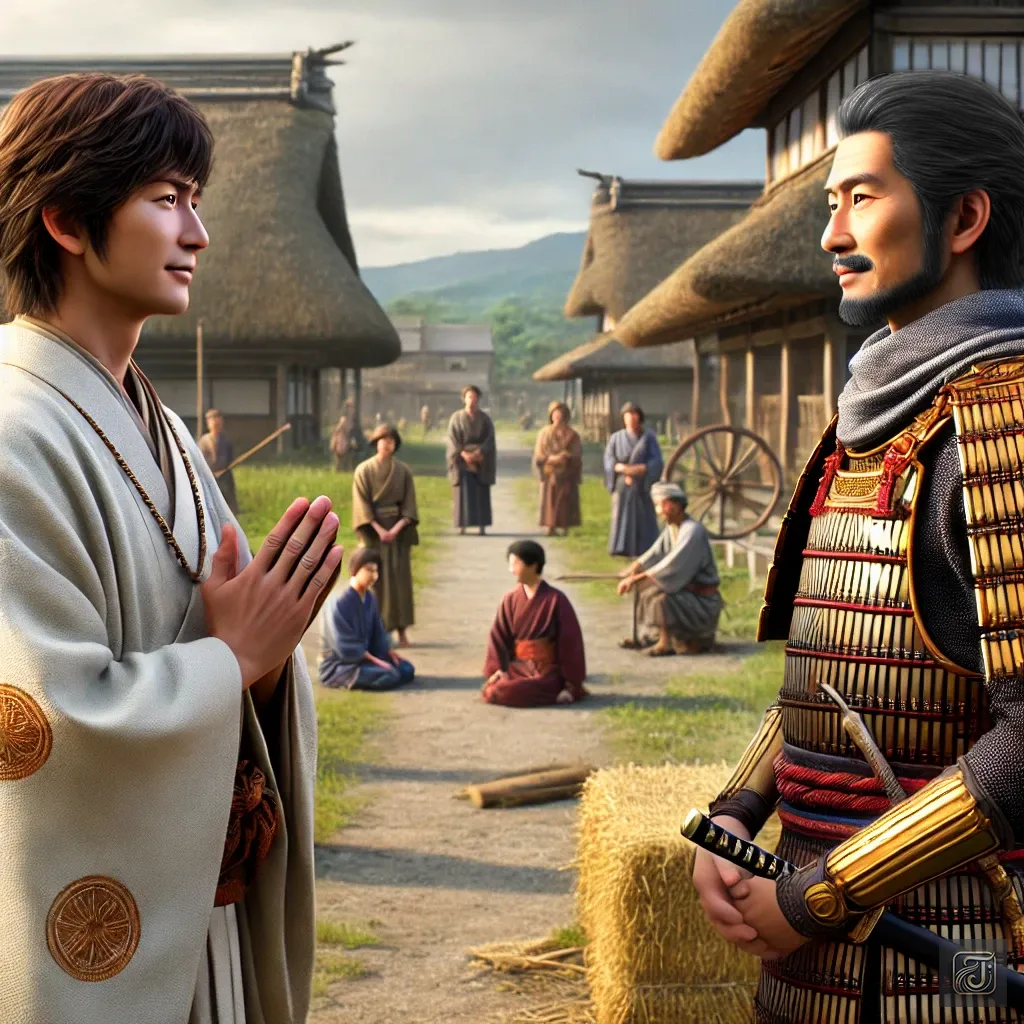
When Ata visited Katsukuni, Inaba greeted him cautiously but with a hint of warmth.
Inaba:
“I didn’t think we’d meet again… but you’ve come a long way.”
Ata:
“Lord Inaba, I am glad to see that the peace we forged still holds.”
“Yamatai now spends its days tending to fields rather than preparing for battle.”
Inaba:
“If your words are true, then perhaps I can start to believe. But doubt still lingers in my heart.”
Ata met Inaba’s gaze with earnest determination.
“It is to dispel those doubts that I’ve come here. I believe we can build peace together.”
Summary
As Ata and Katsukuni’s Inaba reunited to assess the continuation of peace, Inaba gradually began to feel a sense of trust toward Ata.
Chapter 25: The Death of Himiko
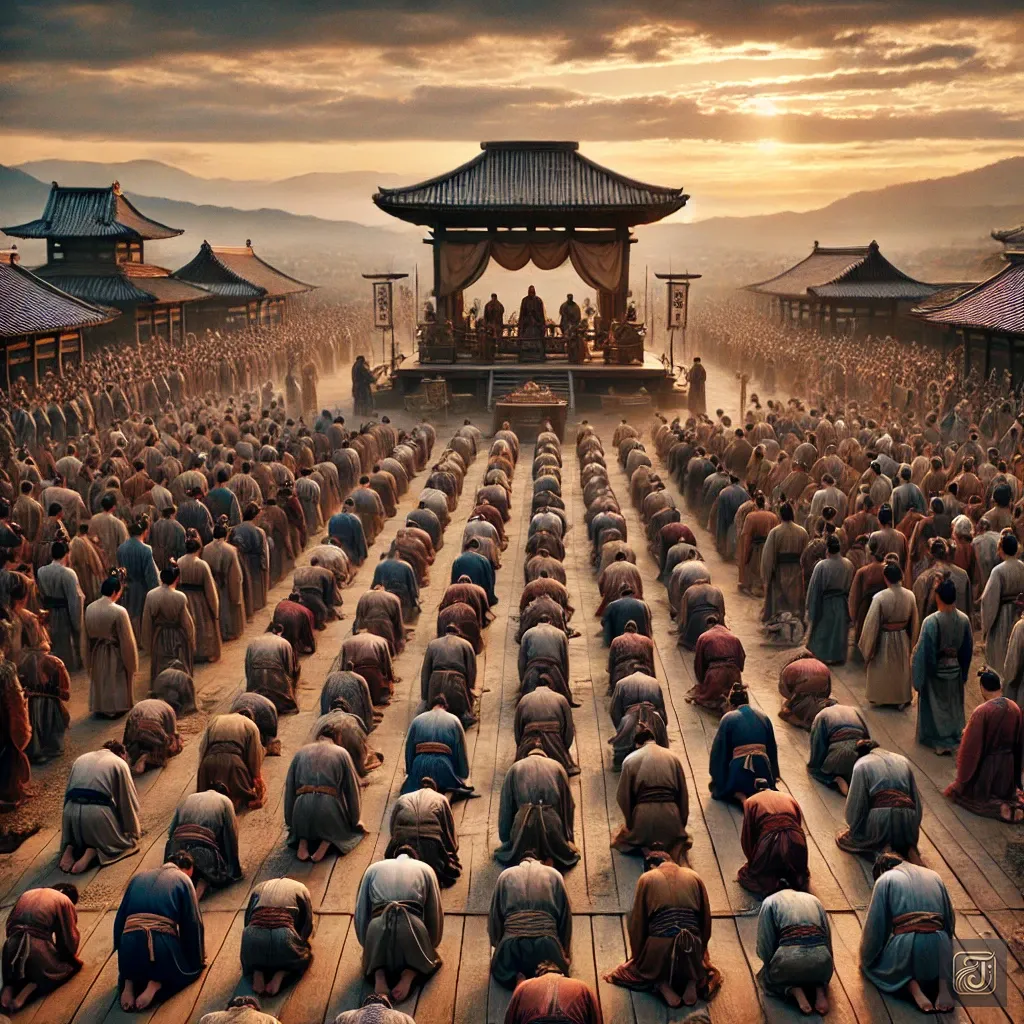
Time passed, and Himiko quietly departed this life.
The news sent shockwaves throughout Yamatai, plunging the people into deep sorrow and uncertainty.
In the village square, crowds gathered, weeping as they called out her name.
Villagers:
“What will happen to the peace that Lady Himiko built?”
“I can’t believe we’ll no longer hear her guidance…”
It was said that her final moments came while she was in communion with the gods.
As always, she was offering prayers, immersed in her time with the divine.
Then, in a gentle voice, she summoned her brother to her side.
Himiko:
“My brother… the time has come.”
“I will return to the gods.”
Ata:
“Sister, what will become of the people?”
“What am I to do without you?”
With a serene smile, Himiko gently took his hand in hers.
Ata:
“You have always been my support, and now you will continue to be the support that guides our people.”
“I will keep praying to the gods, always.”
“Please, protect the peace of this land.”
Her voice gradually grew quieter until only a sacred silence remained.
As Ata, struggling to hold back his tears, stayed by her side, Himiko peacefully took her final breath.
Her body was treated with the utmost care and laid to rest in a solemn and sacred ceremony.
The people knelt at the burial site, offering prayers to her spirit, honoring the queen who had guided them with wisdom and divine grace.
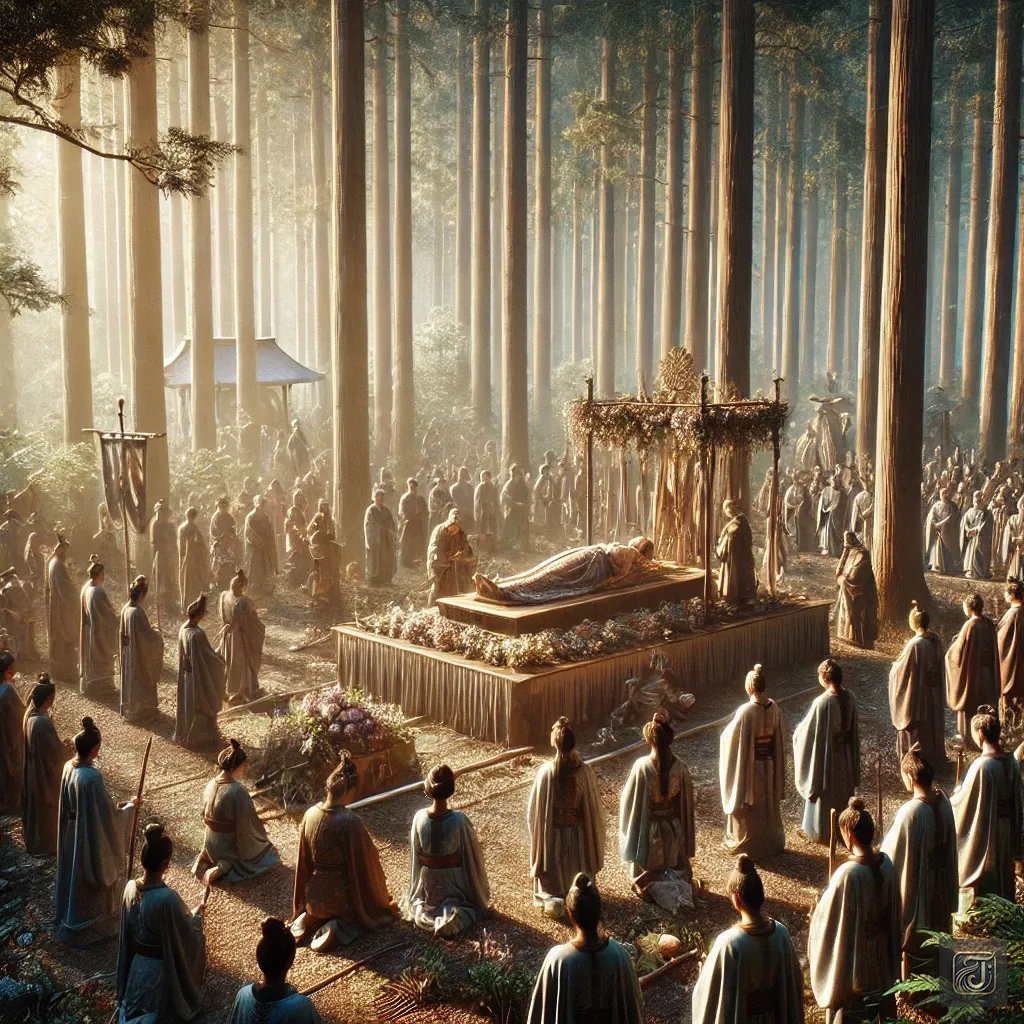
Villagers:
“Lady Himiko… may you rest in peace.”
This solemn scene was etched forever into the memory of the people across the nation.
However, the sorrow soon gave way to chaos.
After Himiko’s passing, a struggle for the throne erupted once more, plunging Yamatai into turmoil yet again.
Why Did Himiko Die?
There are several theories surrounding the cause of Himiko’s death:
1. Natural Death
Himiko is believed to have been of advanced age, making natural death the most widely accepted explanation.
2. Illness or Epidemic
In ancient Japan, where medical knowledge was limited, epidemics and diseases were common causes of death.
It’s possible that Himiko succumbed to an illness or a widespread infection.
3. Assassination or Political Causes
Records indicate that chaos re-emerged in the Wa Kingdom following Himiko’s death.
This has led some to speculate that she may have been targeted by internal factions or individuals vying for the throne.
Given that Yamatai ruled over a collection of smaller states, dissatisfaction among rival factions may have led to her being assassinated.
Each of these theories highlights the complexity of Himiko’s time, reflecting not only her mysterious life but also the political and social instability of the era.
Summary
When Himiko’s life came to an end, the entire nation was engulfed in profound grief.
However, her passing also marked the beginning of renewed conflict, as disputes over succession and power erupted, putting the hard-won peace at grave risk.
Chapter 26: The Struggle for Succession
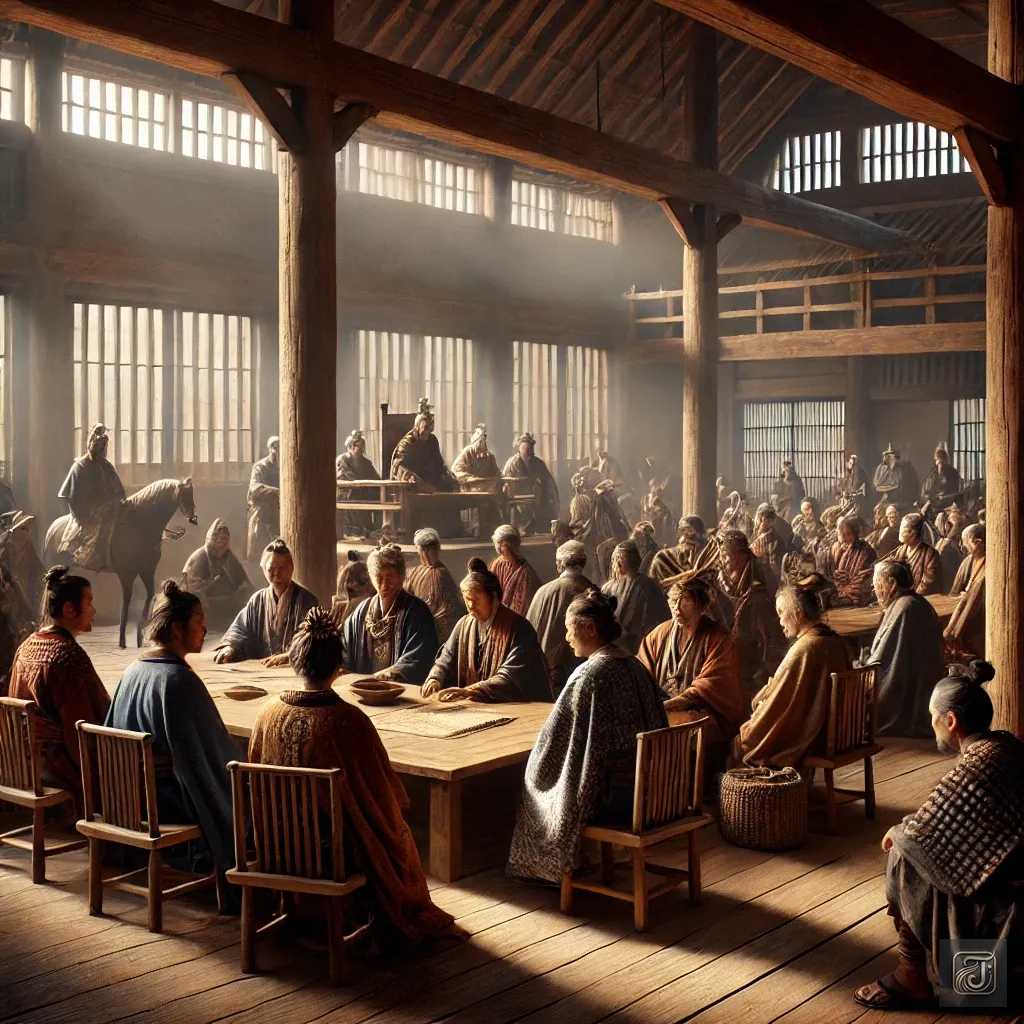
In the council chamber, regional chieftains clashed in heated arguments.
Elder:
“The throne should be ours to inherit!”
Another elder:
“Don’t be ridiculous!”
“You lack the ability to govern this nation!”
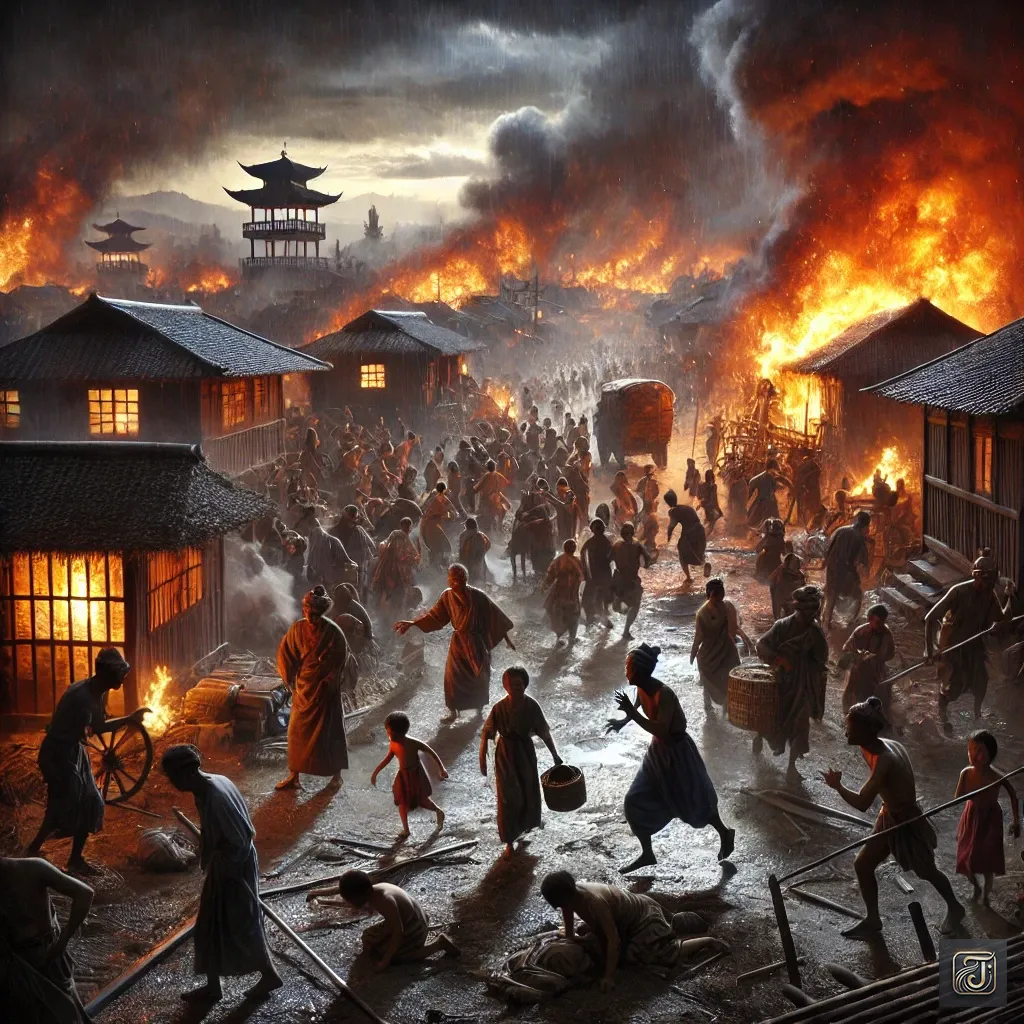
The conflict spread across the land, leading to frequent armed clashes.
Villages were set ablaze, families were torn apart, and once again, the people found themselves living in fear and uncertainty.
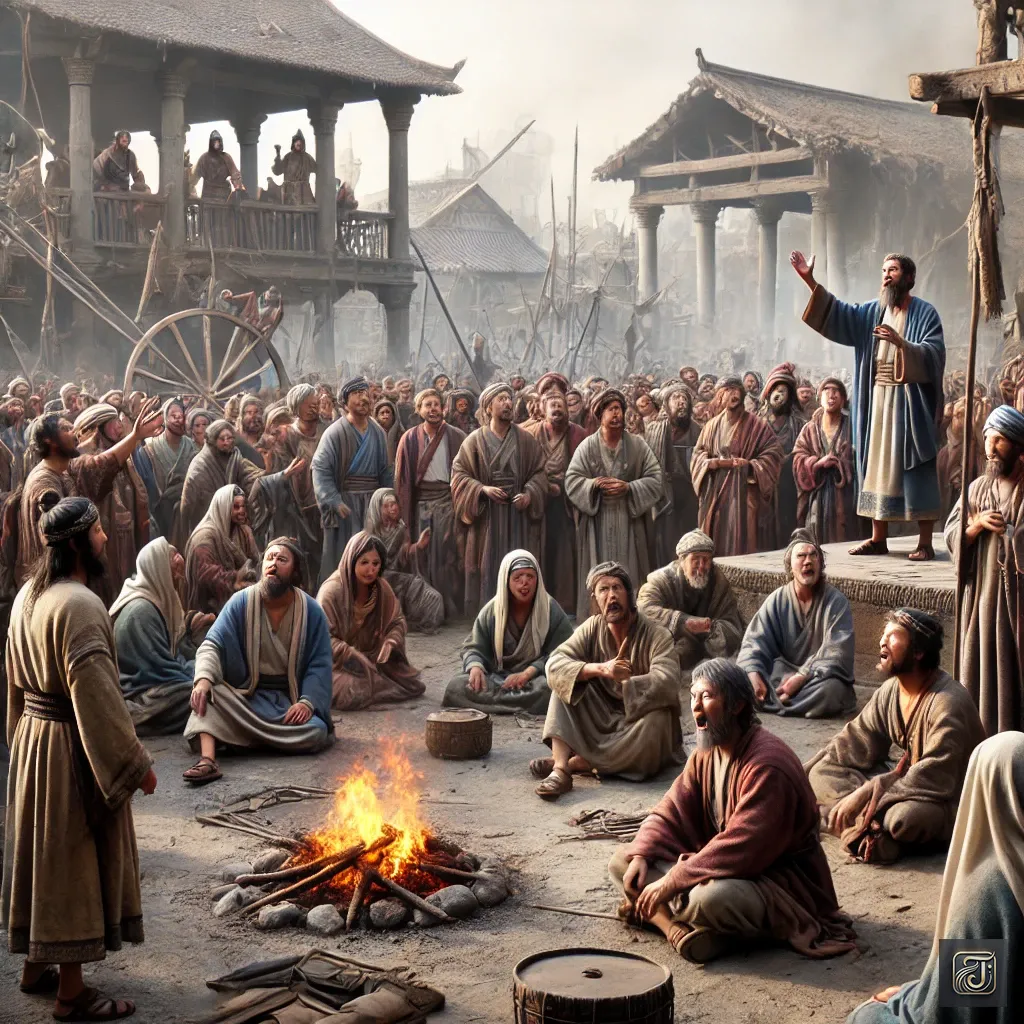
Villagers:
“This is ruining the peace that Lady Himiko worked so hard to establish!”
“If we don’t choose a new ruler soon, this nation will fall into ruin!”
In an effort to quell the chaos, a new male ruler was appointed.
However, he lacked both the spiritual authority and the widespread support that Himiko had commanded.
As a result, instability only worsened, and conflicts escalated further.
The peace that Himiko had built during her lifetime was threatened within mere weeks of her passing.
Fear spread among the people, while powerful clans across the land vied for control, igniting the flames of war once more.
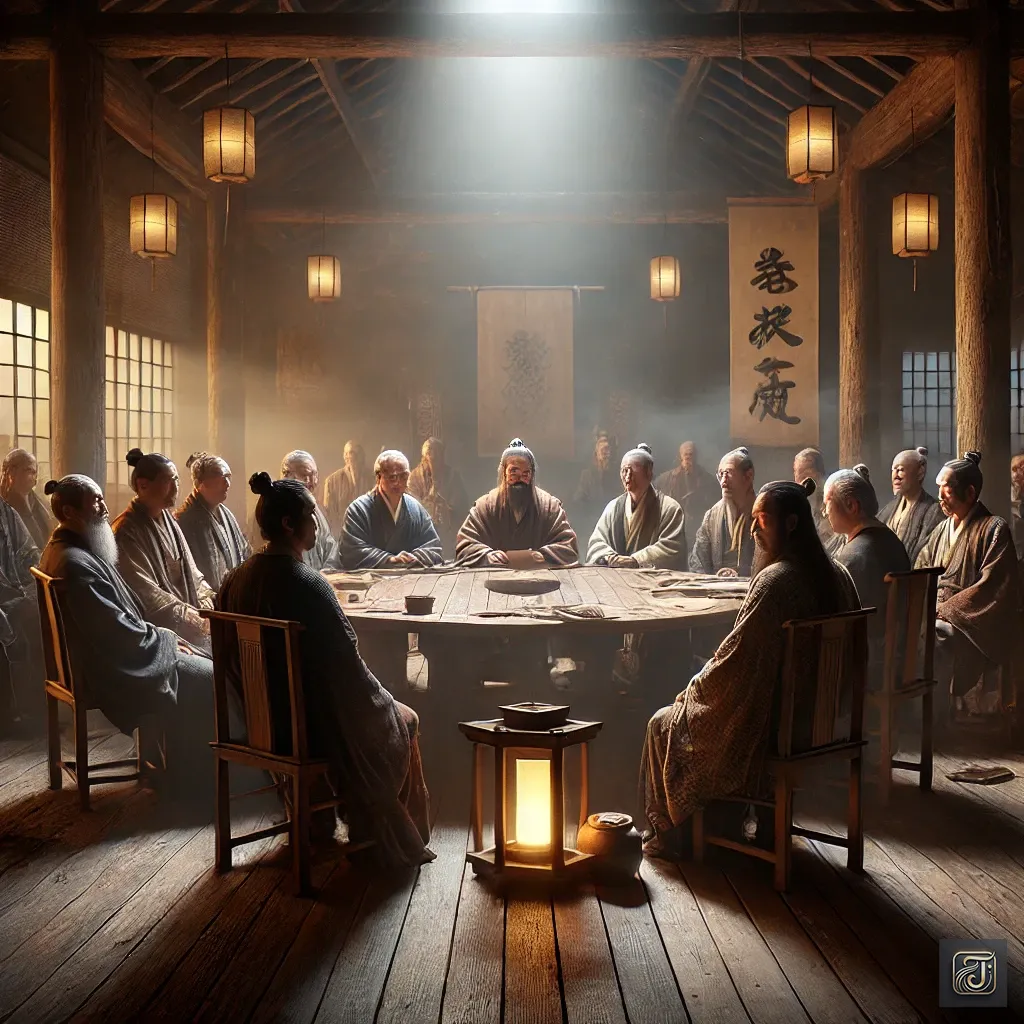
While the chieftains of smaller states sought a new leader, they began to assert their own interests and vie for greater power.
The spiritual authority once derived from the belief that Himiko could hear the voice of the gods no longer held sway after her death.
One night, in a tense council meeting in Yamatai, the chieftains from various regions engaged in fierce arguments.
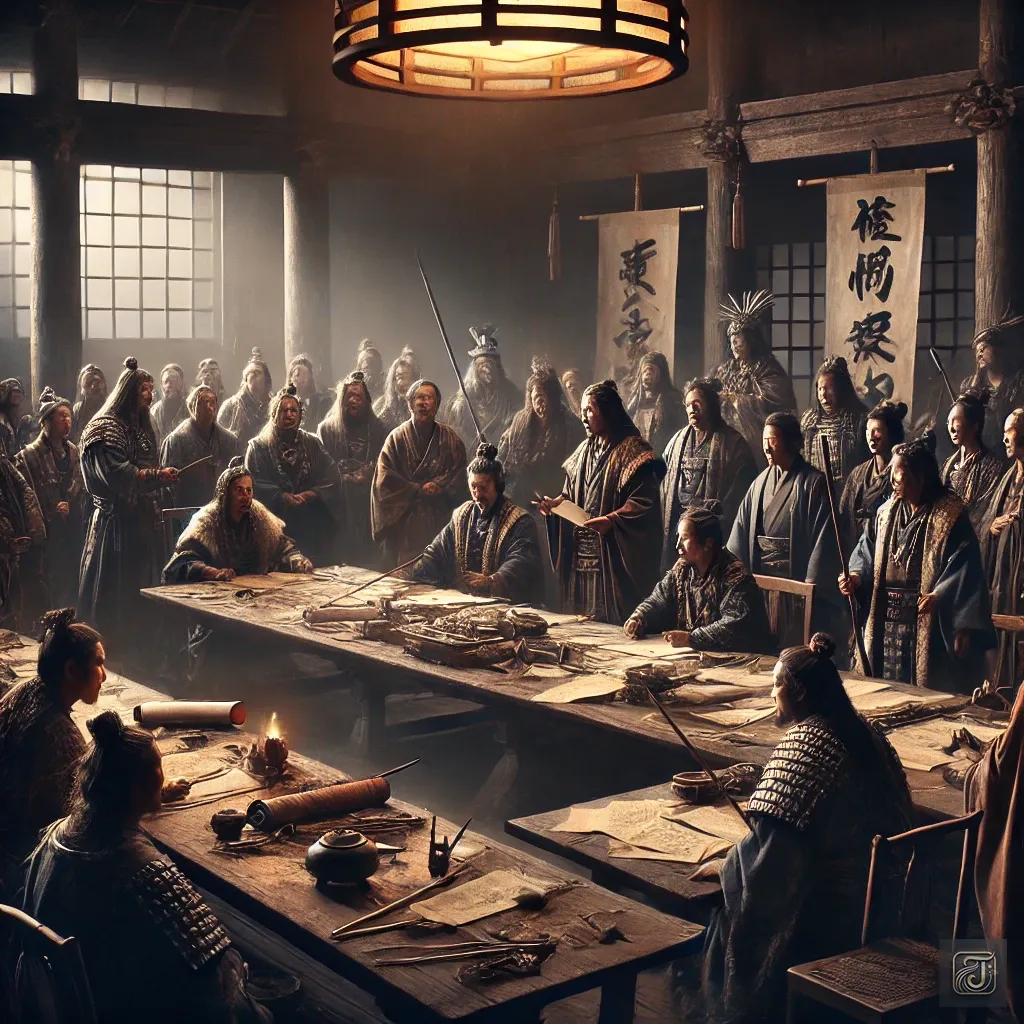
Elder:
“We need a new king!”
“I will be the next ruler!”
Another elder:
“Don’t be ridiculous!”
“Another male king will only bring more chaos!”
“Besides, you just want power for yourself!”
Elder:
“And are you saying you’re more suited for the throne?”
“Aren’t you the one driven by ambition?”
The meeting devolved into chaos, with no resolution reached that night.
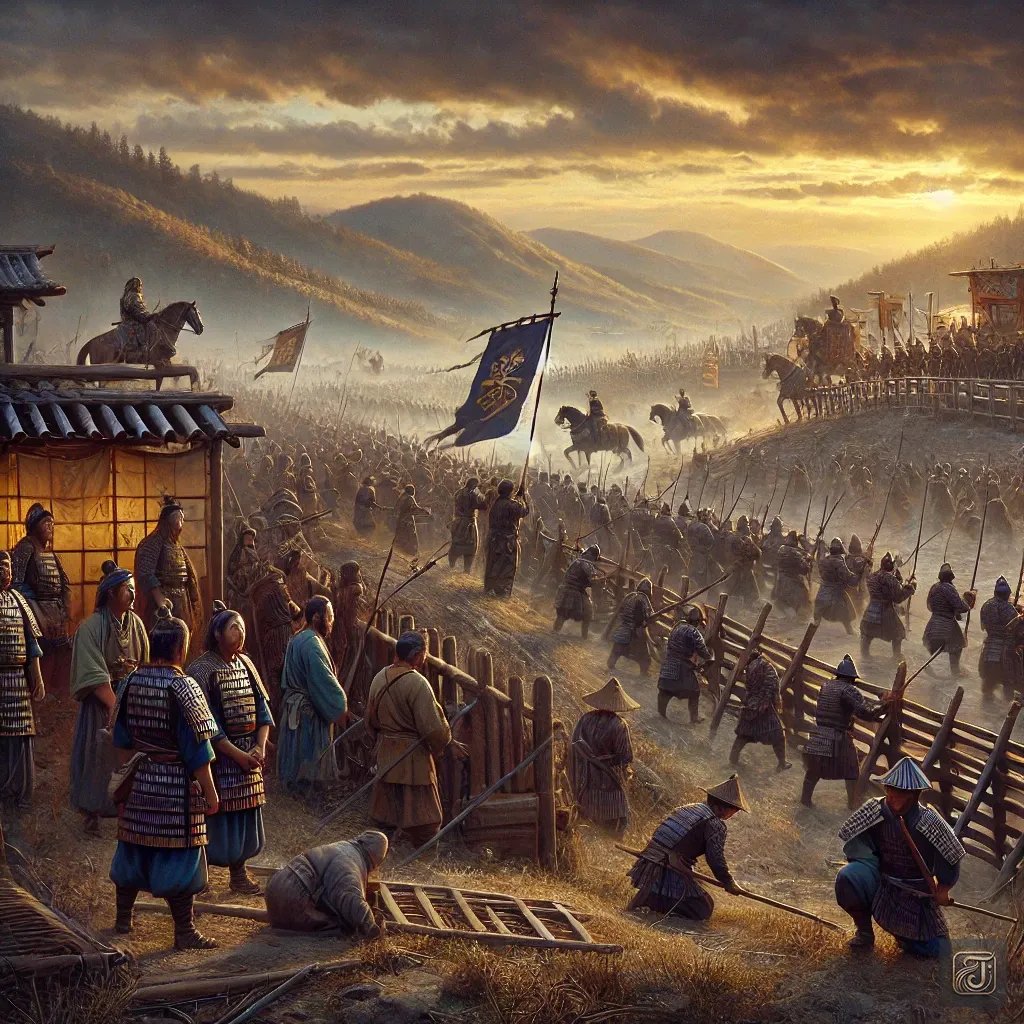
Amidst the turmoil, unsettling movements were observed near Yamatai’s borders.
Taking advantage of the kingdom’s disorder, neighboring states began to plot invasions.
To counter these threats, smaller states independently mobilized their own armies, sparking the embers of civil war across the land.
Summary
After Himiko’s death, a power struggle erupted over her succession.
The newly appointed ruler failed to quell the chaos, plunging the nation into civil war.
Chapter 27: The Resurgence of Civil War
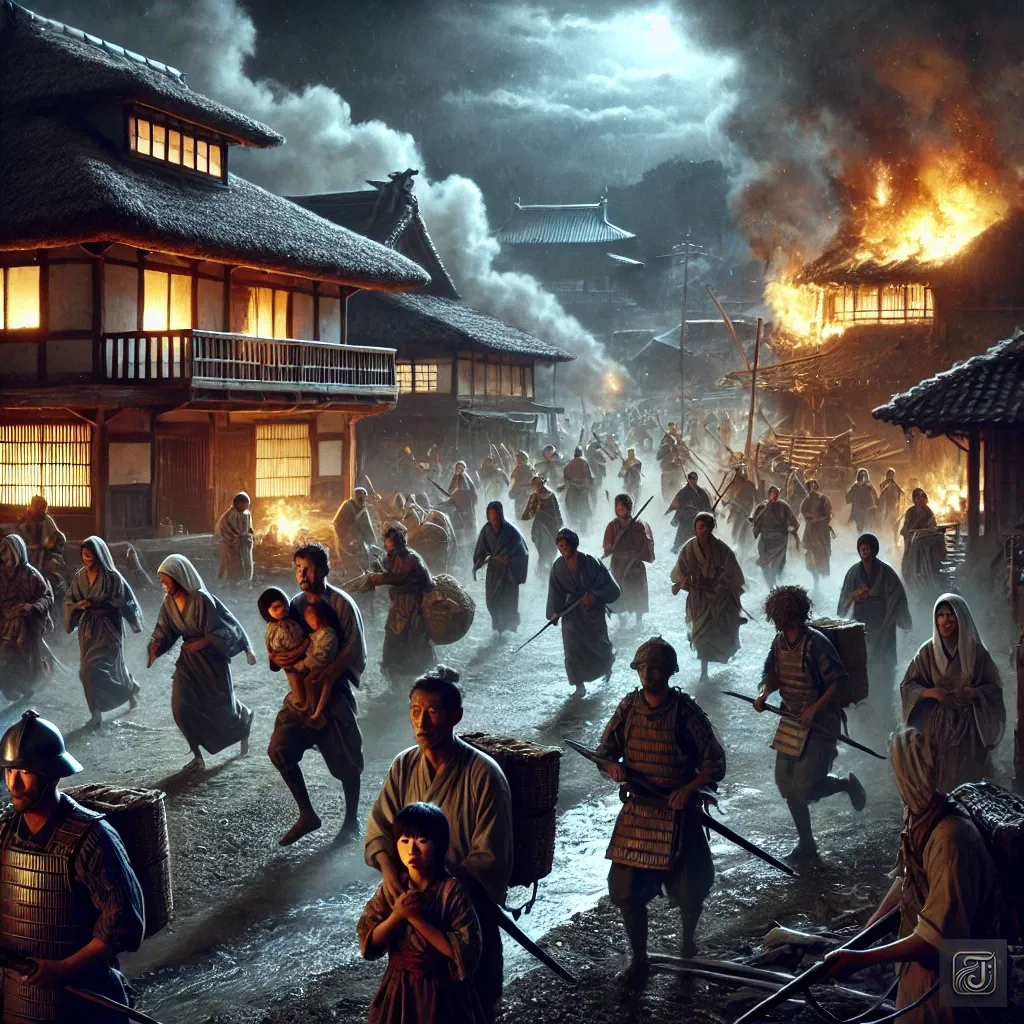
A few weeks later, the civil war escalated into full-blown chaos.
Across the land, smaller states clashed in violent skirmishes, leaving villages burned and their people fleeing in desperation.
Just before dawn, the silence was shattered as the flames of war crept toward a village.
Armed soldiers stormed in, setting homes ablaze one after another, and the anguished cries of villagers echoed throughout the night.
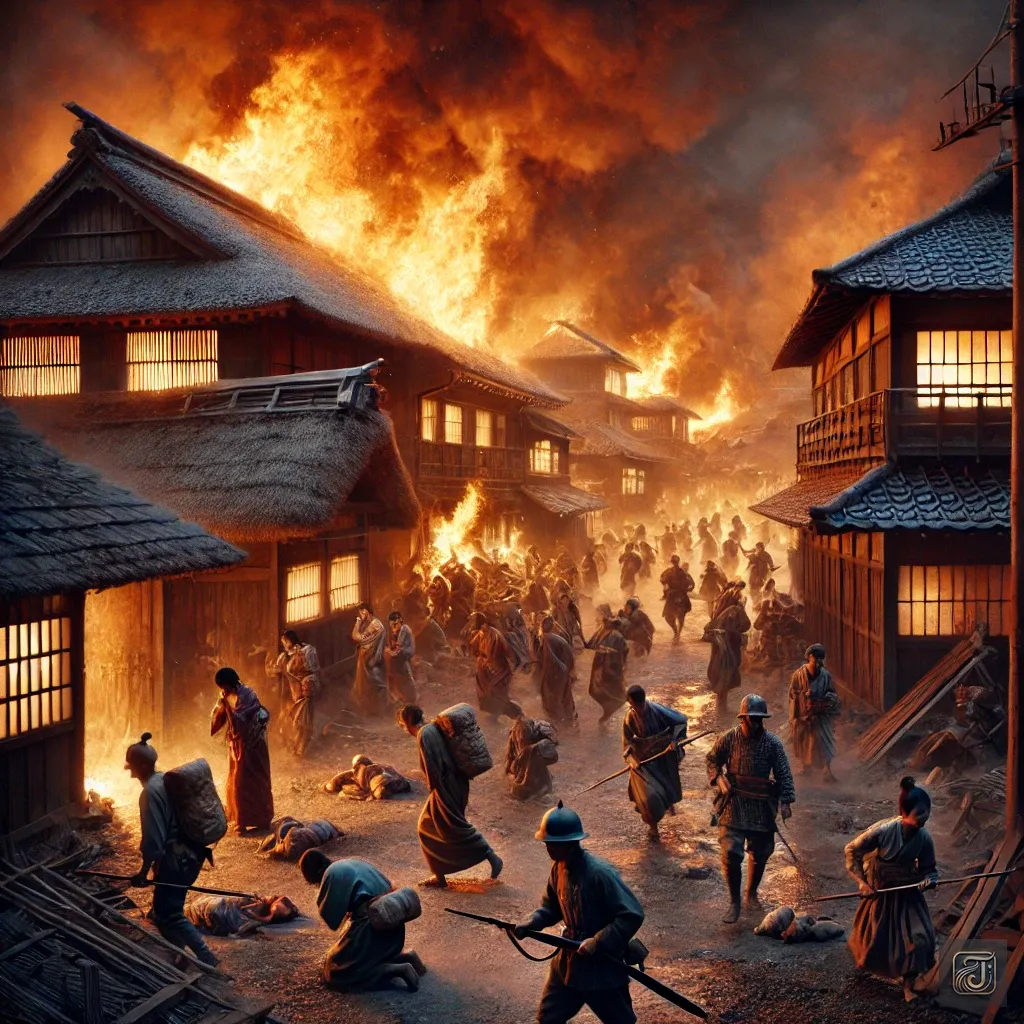
cried a young boy:
“Mom! Where are you?”
cried a young boy as he frantically searched through the burning village.
The sound of collapsing homes drowned out his voice, carrying it away into the chaos.
Meanwhile, in a corner of the village, an elderly woman lay on the ground, shielding her son with her body. Despite her pain, she whispered prayers, her trembling hands clasped tightly together.
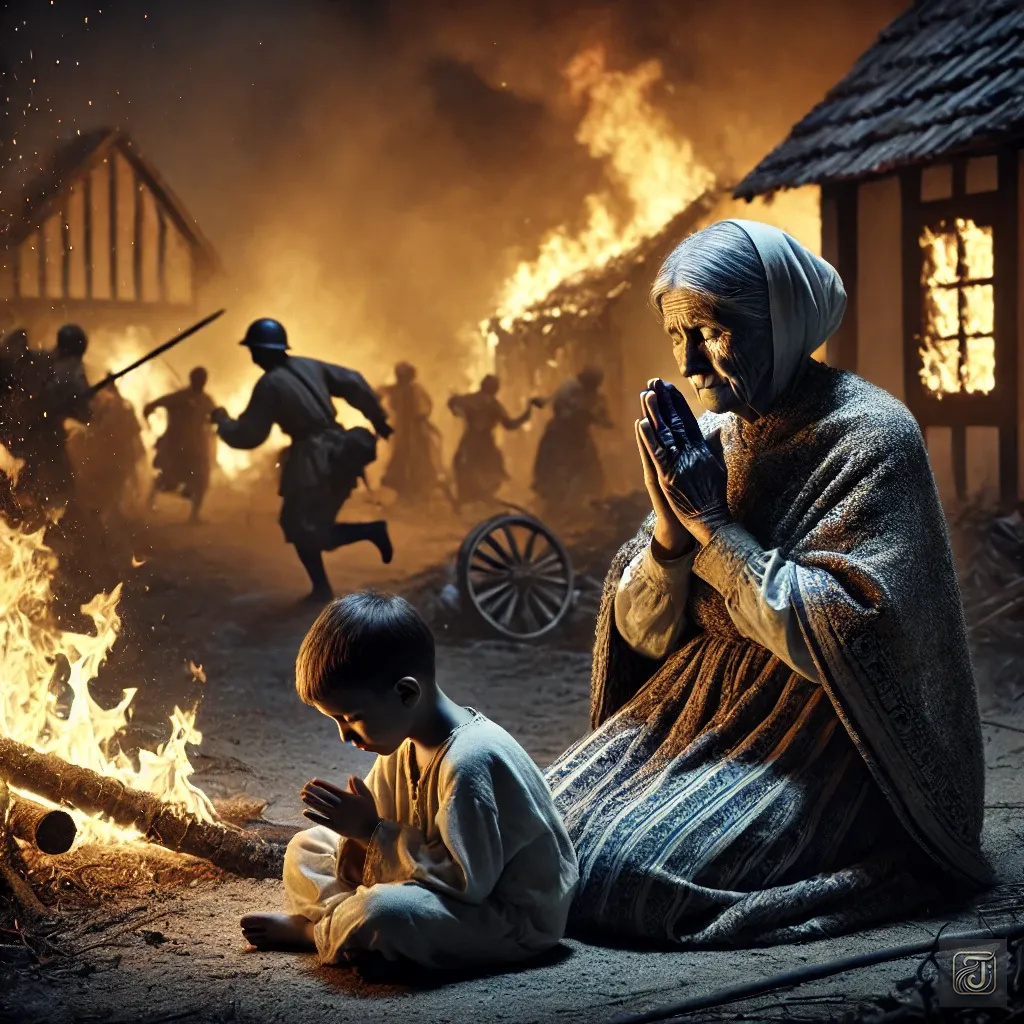
The elderly woman lay:
“Lady Himiko… please, save us…”
Her frail voice wavered, yet she continued her prayer to the very end.
The elderly woman lay:
“Is this the future Lady Himiko wished for…?”
The elderly woman’s tearful words echoed in the stillness of the night, a haunting lament amidst the ashes of a shattered village.
Meanwhile, among the youth, voices of admiration and longing for Himiko steadily began to grow.
Villagers:
“If Queen Himiko were still alive, this would have never happened…”
“We must choose a ruler like her once more!”
With her passing, the people were reminded once again of how truly great her presence had been.
Summary
After Himiko’s death, the civil war intensified.
As the people once again longed for peace, they came to deeply realize the importance of her presence and the stability she had brought to their lives.
Chapter 28: A New Light
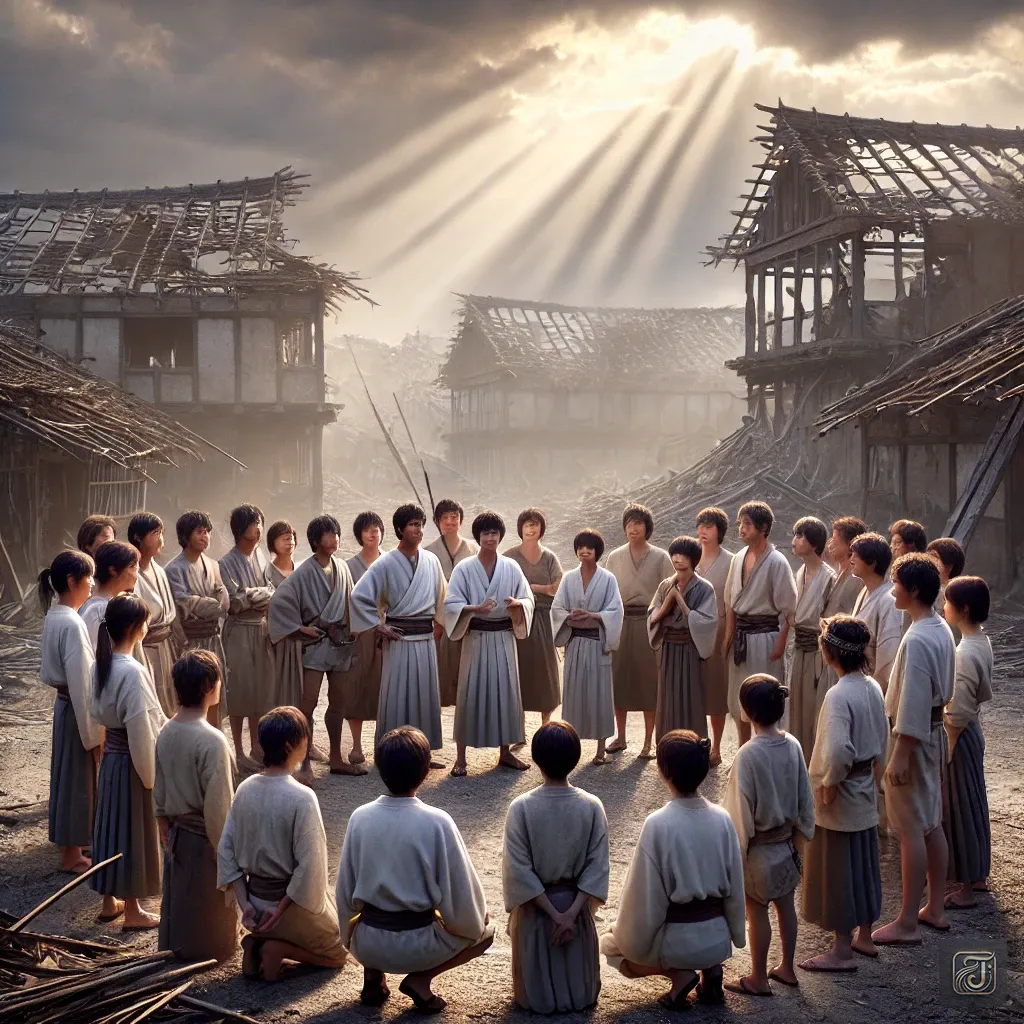
As the civil war raged on, the people desperately sought to find hope once more.
With the continuing strife after Himiko’s death, the voices lamenting the state of the nation grew louder with each passing day.
One day, a large gathering of villagers filled the square, their passionate debates echoing through the air.
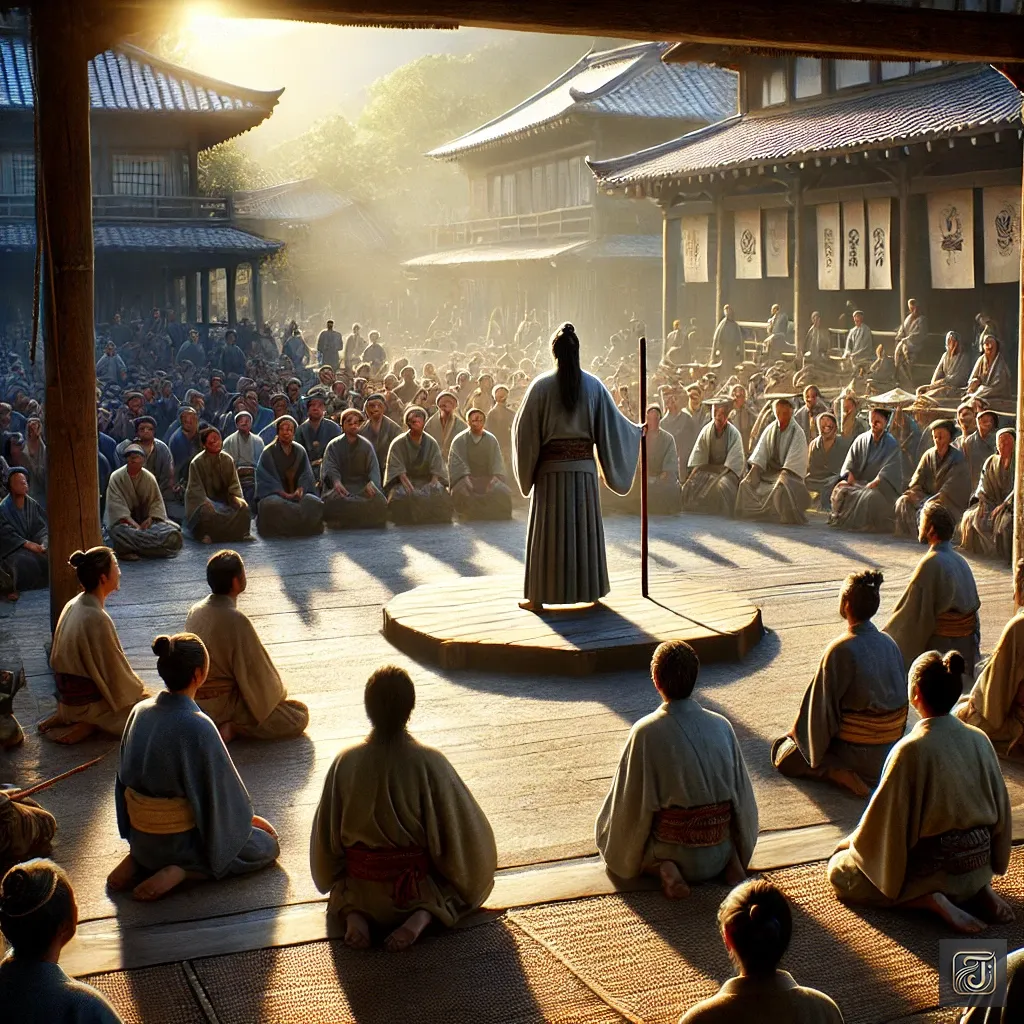
Elder:
“If we continue fighting like this, the entire nation will collapse!”
“But who will bring an end to this chaos?”
At that moment, an elderly chieftain rose quietly to his feet and made a proposal.
Elderly chieftain:
“This nation needs someone like Lady Himiko once more!”
The crowd fell silent at his words.
Then, she continued.
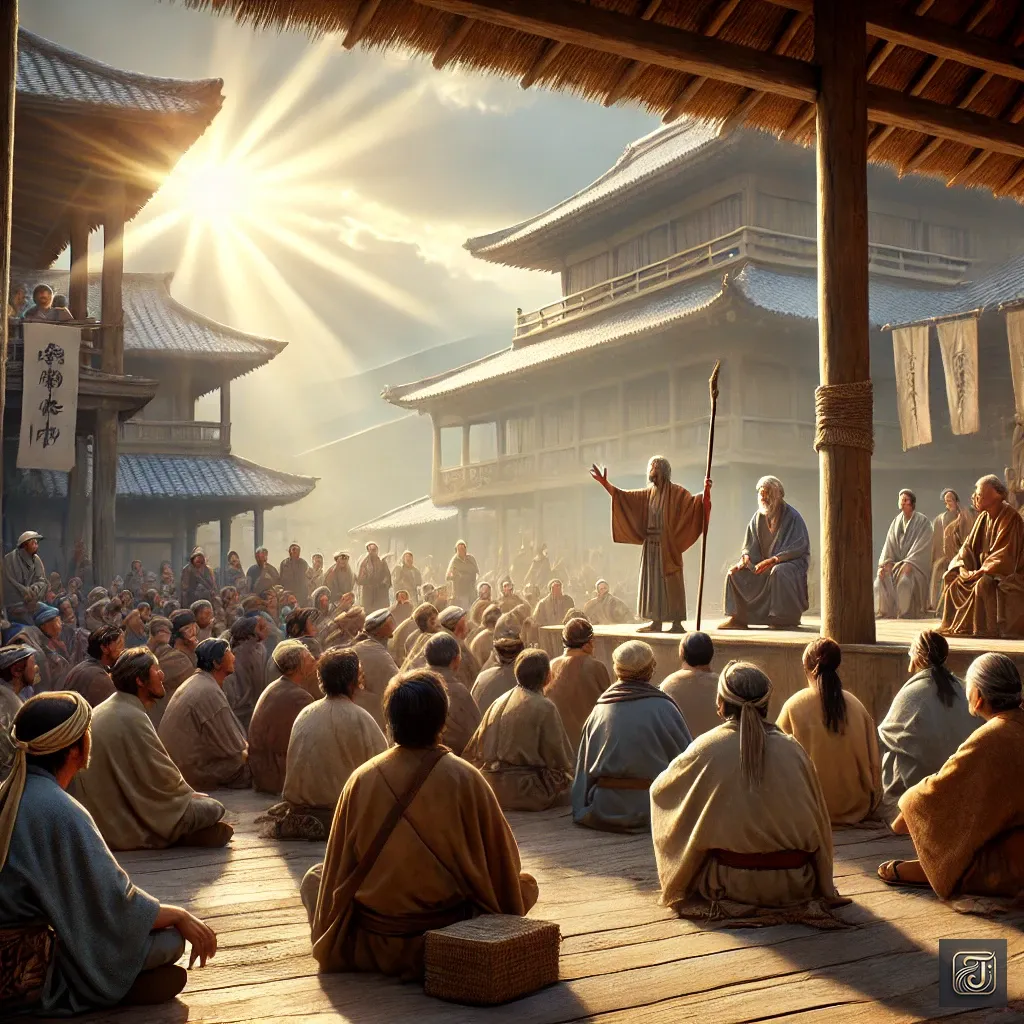
Elderly chieftain:
“There is someone who carries Lady Himiko’s bloodline—a young girl named Iyo.”
“She should be made queen.”
The proposal stirred ripples of debate among the crowd, but gradually, a glimmer of hope began to emerge within the hearts of the people.
Amid the escalating civil war, the people found a new beacon of light to guide them.
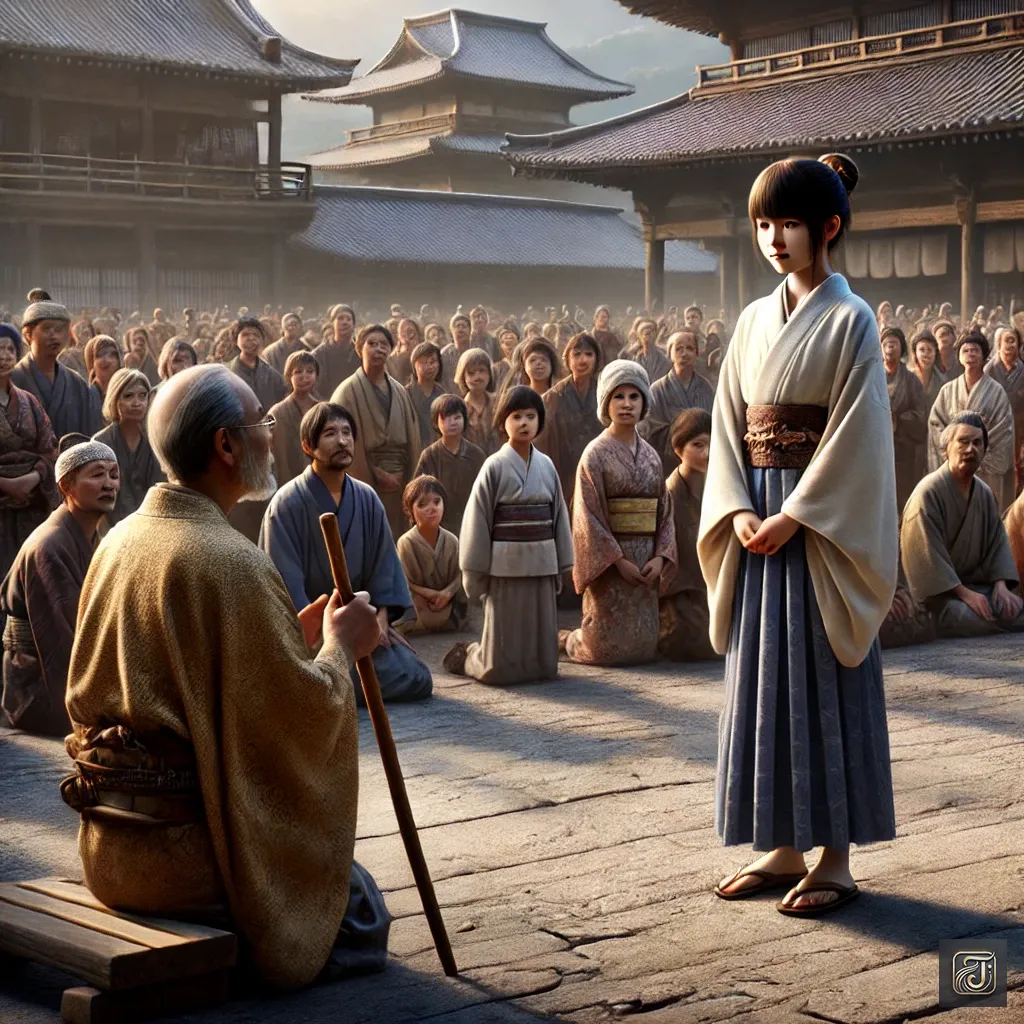
Thus, the one chosen was Iyo, a young girl from Himiko’s lineage.
Despite her youth, Iyo was known for her wisdom and spiritual sensitivity.
The villagers, convinced that she was worthy of carrying on Himiko’s legacy, began preparations to welcome her as their new queen.
Summary
Iyo, a young girl from Himiko’s lineage, emerged as a new beacon of hope.
The people placed their faith in her, hoping she would carry on Himiko’s will as their queen.
Chapter 29: Iyo’s Solitude and Resolve
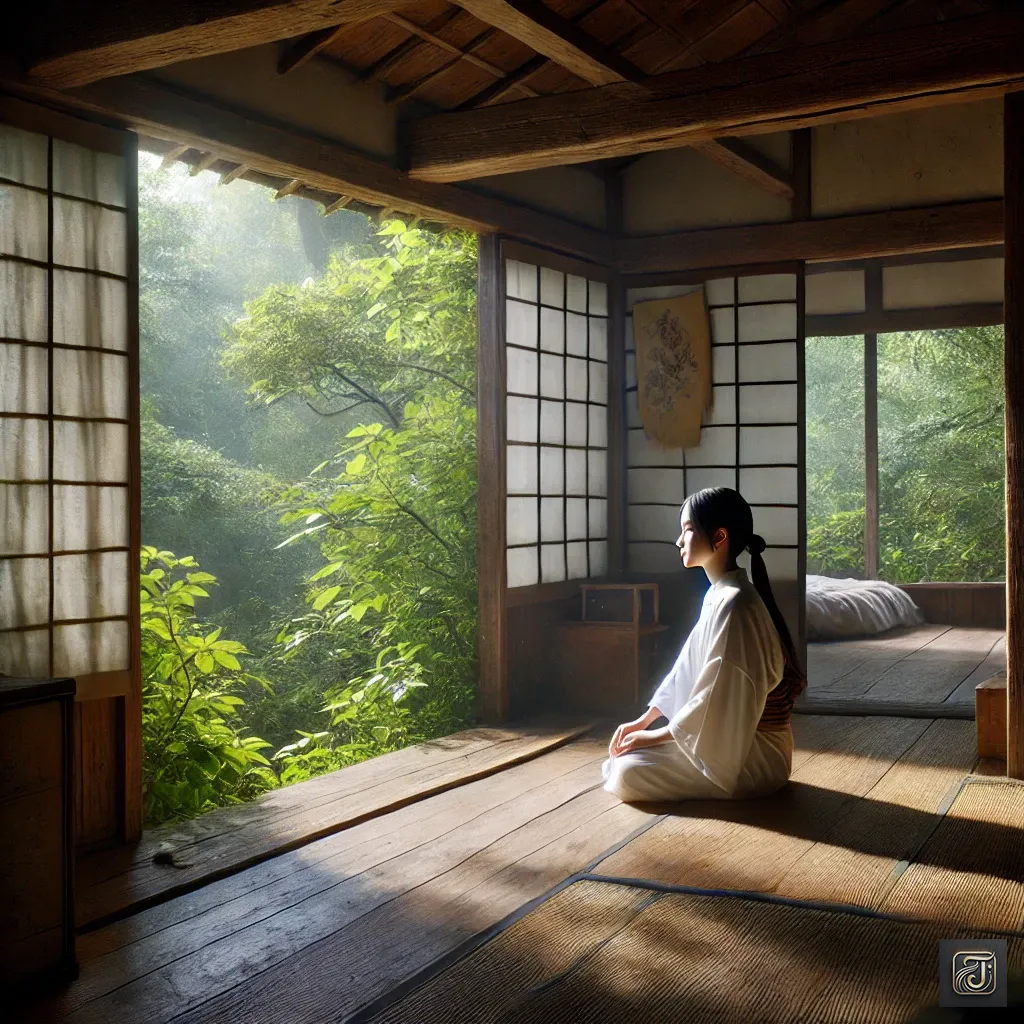
Iyo, as a girl descended from Himiko’s bloodline, lived in a secluded village far from others.
She lost her mother at a young age, and her father perished in a conflict with another state.
While the villagers revered her as “a being close to the gods,”
They also feared her mysterious powers, keeping their distance.
In this environment, Iyo grew up in solitude, yet she admired Himiko deeply and dreamed of one day becoming someone who could save the people, just as Himiko had.
One day, an elderly woman from the village shared a story with her.
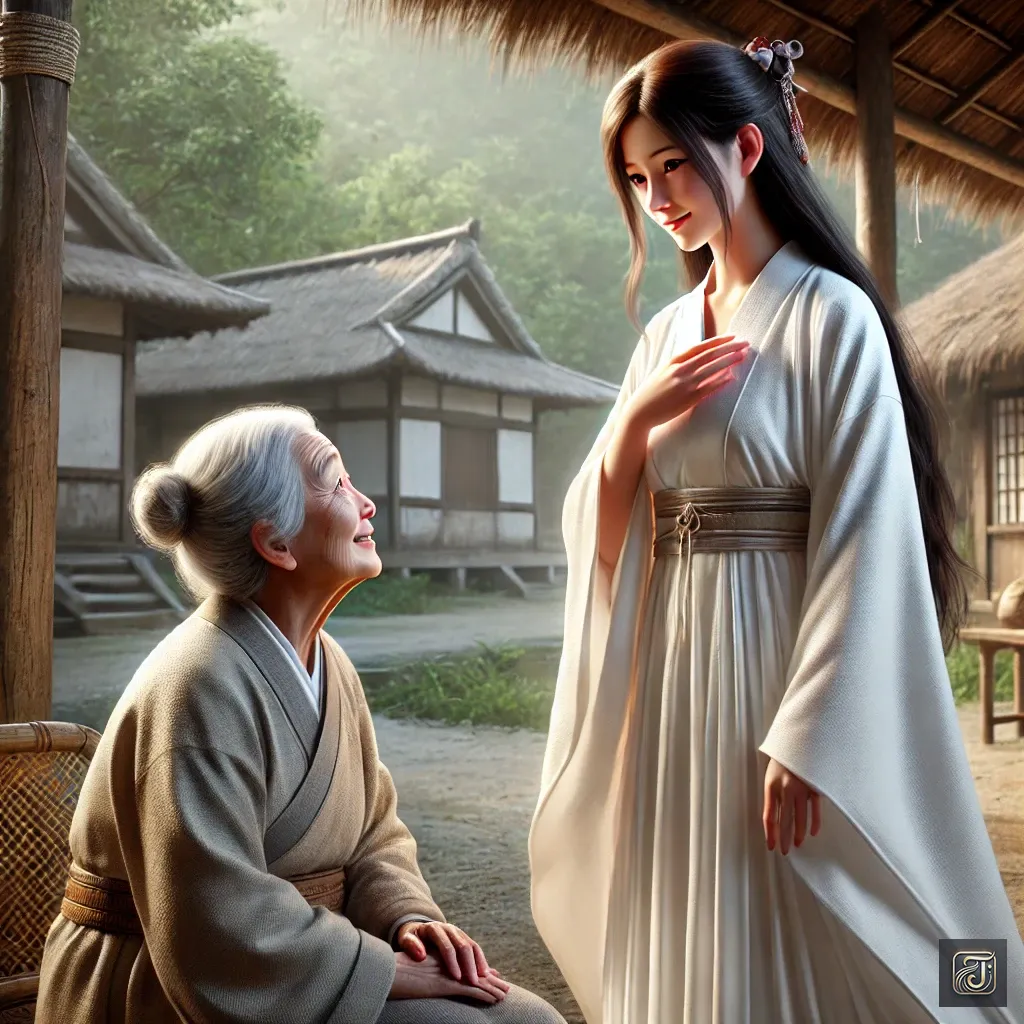
Elderly woman:
“You are a special child.”
“The same blood that flowed through Lady Himiko flows within you.”
“The gods are watching over you.”
Iyo, though initially unsure of how to respond, felt a growing sense of purpose within those words.
Iyo:
“I’m not alone.”
“If the gods are watching over me, then there must be something I can do…”
At just 13 years old, Iyo carried a profound resolve within her heart.
Under the vast night sky, she looked up and offered a quiet prayer.

Iyo:
“Can I really save this nation?”
“Can I guide the people like Lady Himiko did?”
Iyo felt as though her fears might overwhelm her.
Just then, an elderly farmer visiting from a neighboring village approached her and spoke.
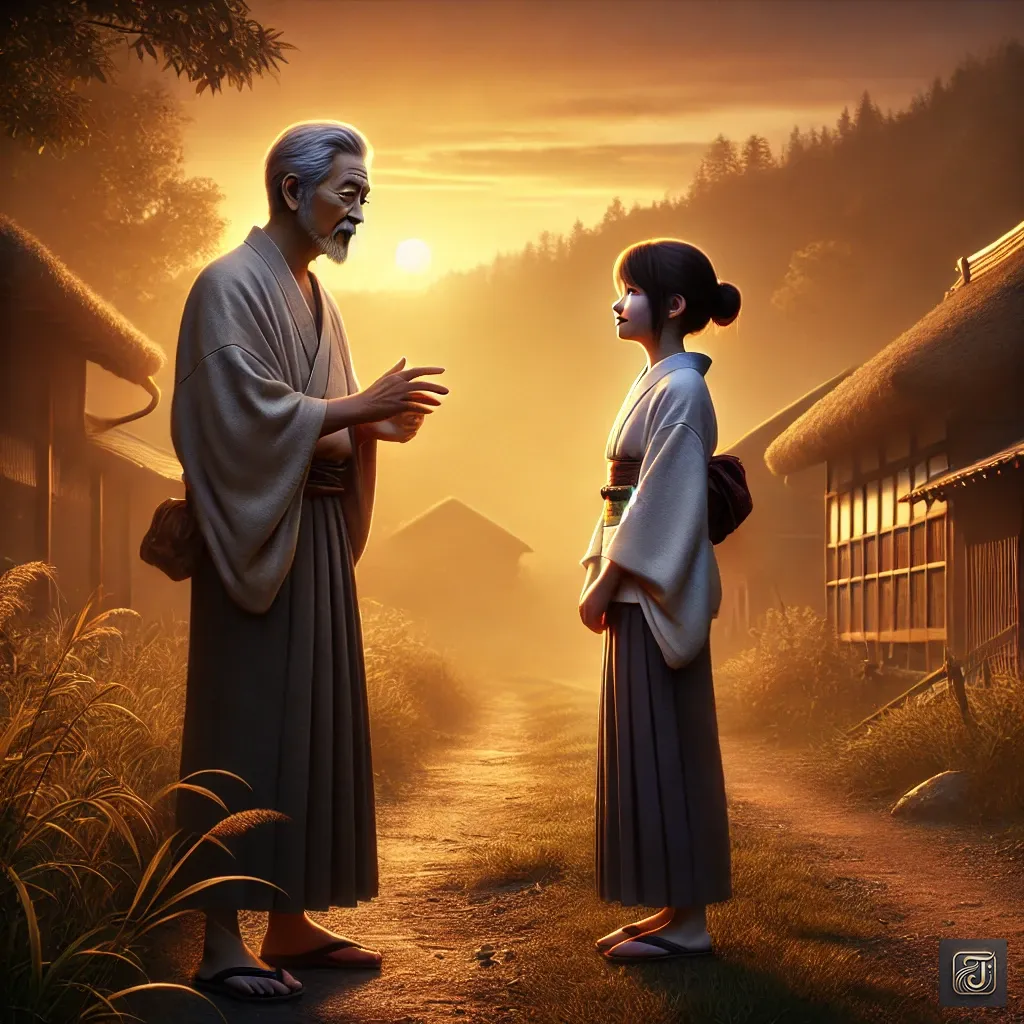
Elderly farmer:
“Lady Iyo, when I heard that you were to ascend the throne, my heart was filled with hope.”
“You will restore the peace that Lady Himiko once protected, won’t you?”
Iyo:
“I haven’t done anything yet.”
“But if you believe in me… I feel like I can do it.”
Quietly, she clenched her fists, summoning her courage and determination.
Summary
Iyo, a girl descended from Himiko’s bloodline, found her sense of purpose amid solitude and resolved to embrace her role as the new queen with unwavering determination.
Chapter 30: The Resolve to Ascend the Throne
One day, Iyo approached a young boy crying in the village square.
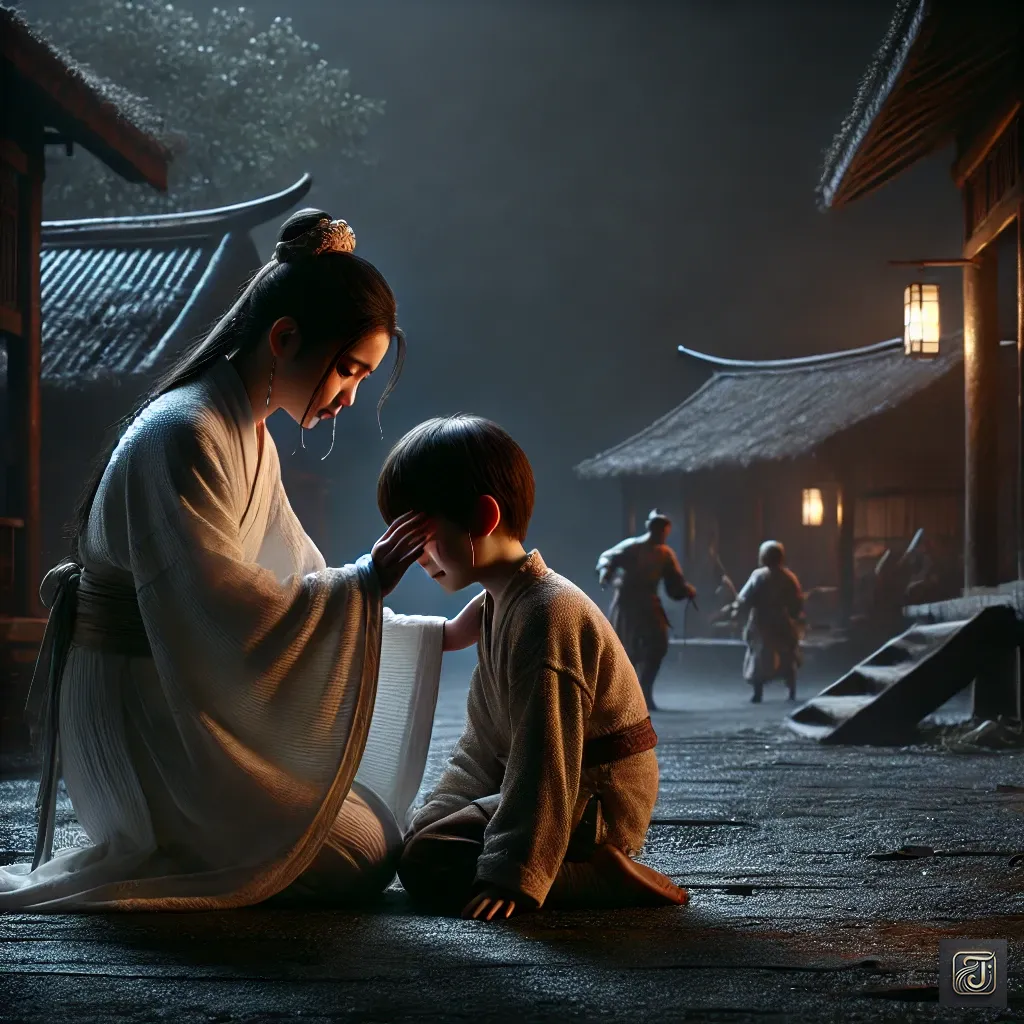
Iyo:
“What’s wrong?”
Young boy:
“My father… he died in the war. There’s no one left to protect me…”
Iyo:
“I will protect you. Everyone chose me for a reason—there must be something I can do.”
The boy looked up at her, his tear-filled eyes meeting hers, and quietly nodded.
In his gaze, Iyo found a spark of courage.
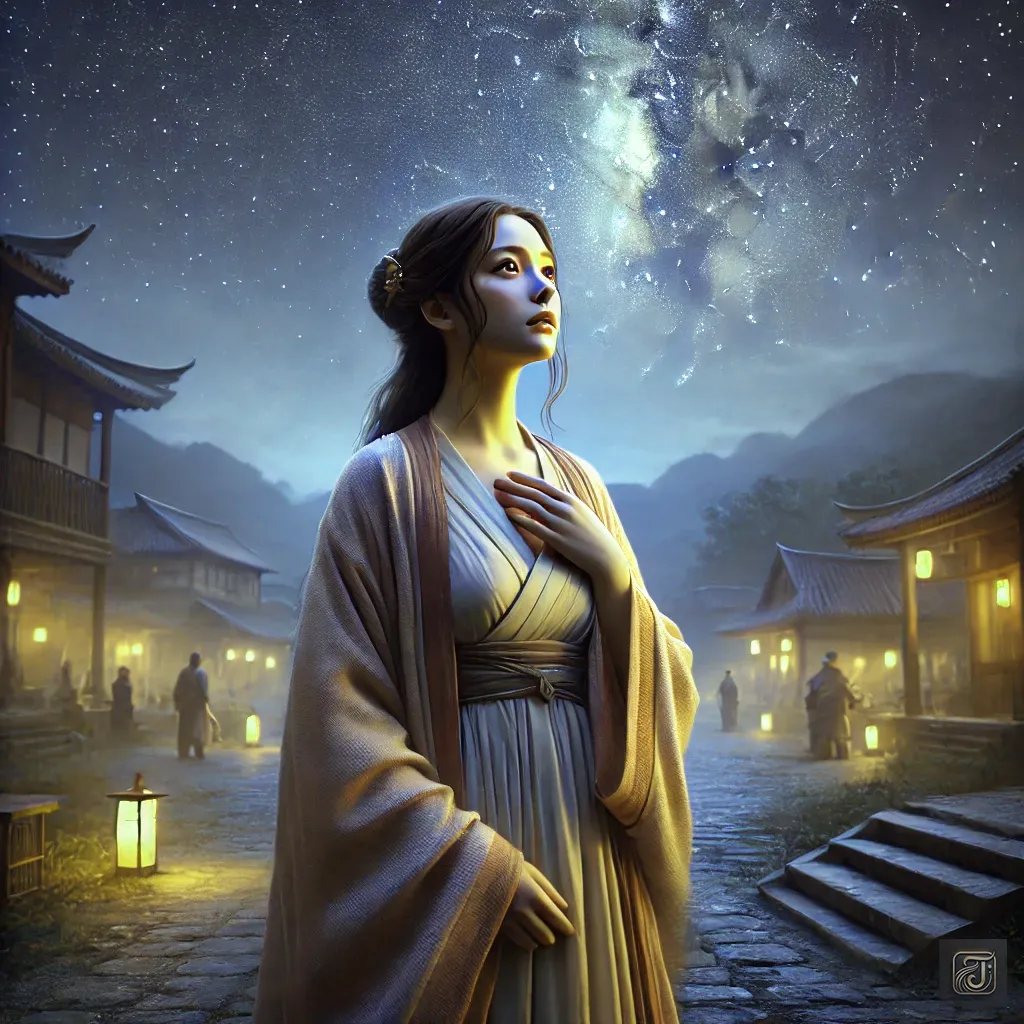
Iyo:
“To protect these people… is that my mission?”
“Have I been chosen to change the future of this nation?” she thought, her resolve growing stronger.
With the bustle of the square behind her, Iyo stood alone, quietly offering her prayers.
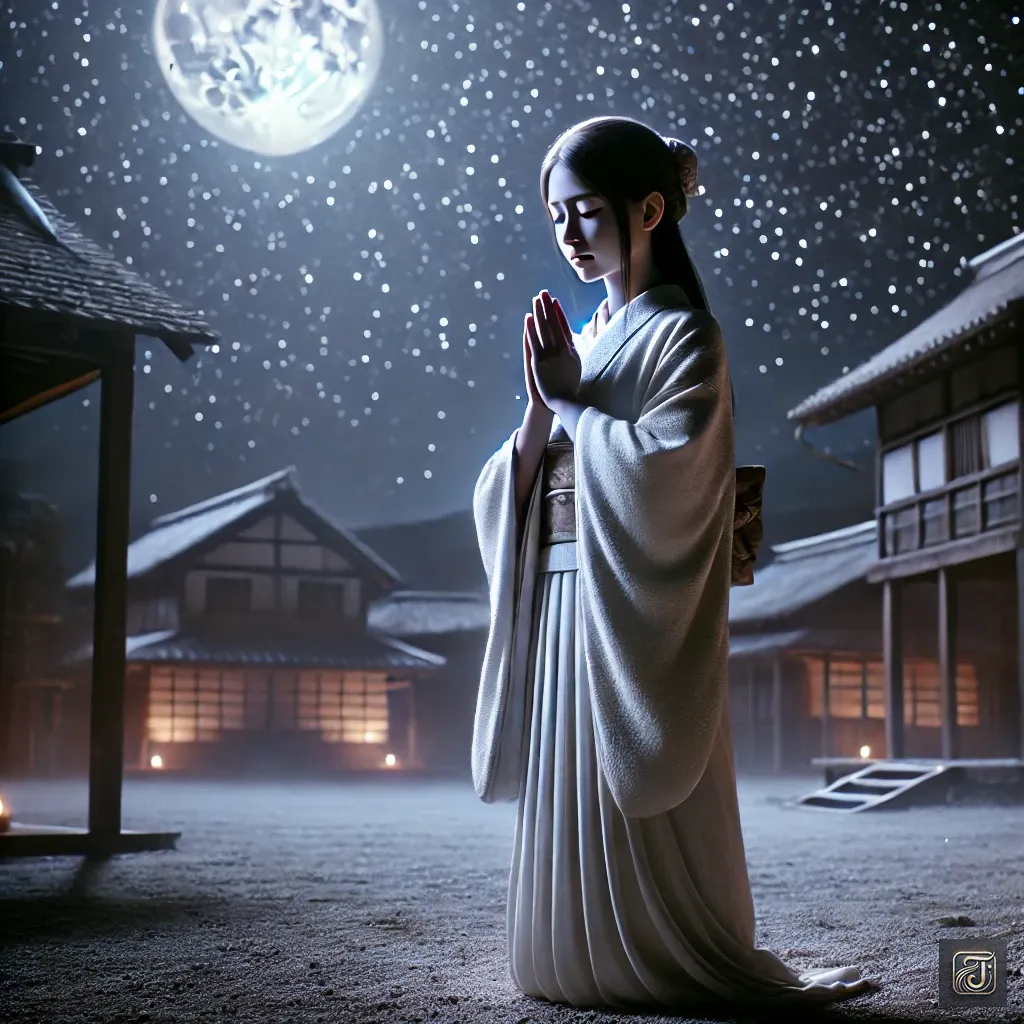
Iyo:
“Lady Himiko, please guide me.”
Her prayer carried on the wind, dissolving into the night sky.
Iyo:
“This responsibility feels too heavy.”
“But if I run away… will the fighting start all over again?”
As she opened her eyes, they shone with newfound resolve.
Iyo:
“I will lead this nation. If that is the future everyone wishes for.”
Summary
Though burdened with loneliness and uncertainty, Iyo resolved to carry on Himiko’s will.
Her ascension would become a beacon of hope for the people.
Chapter 31: The Day of Ascension
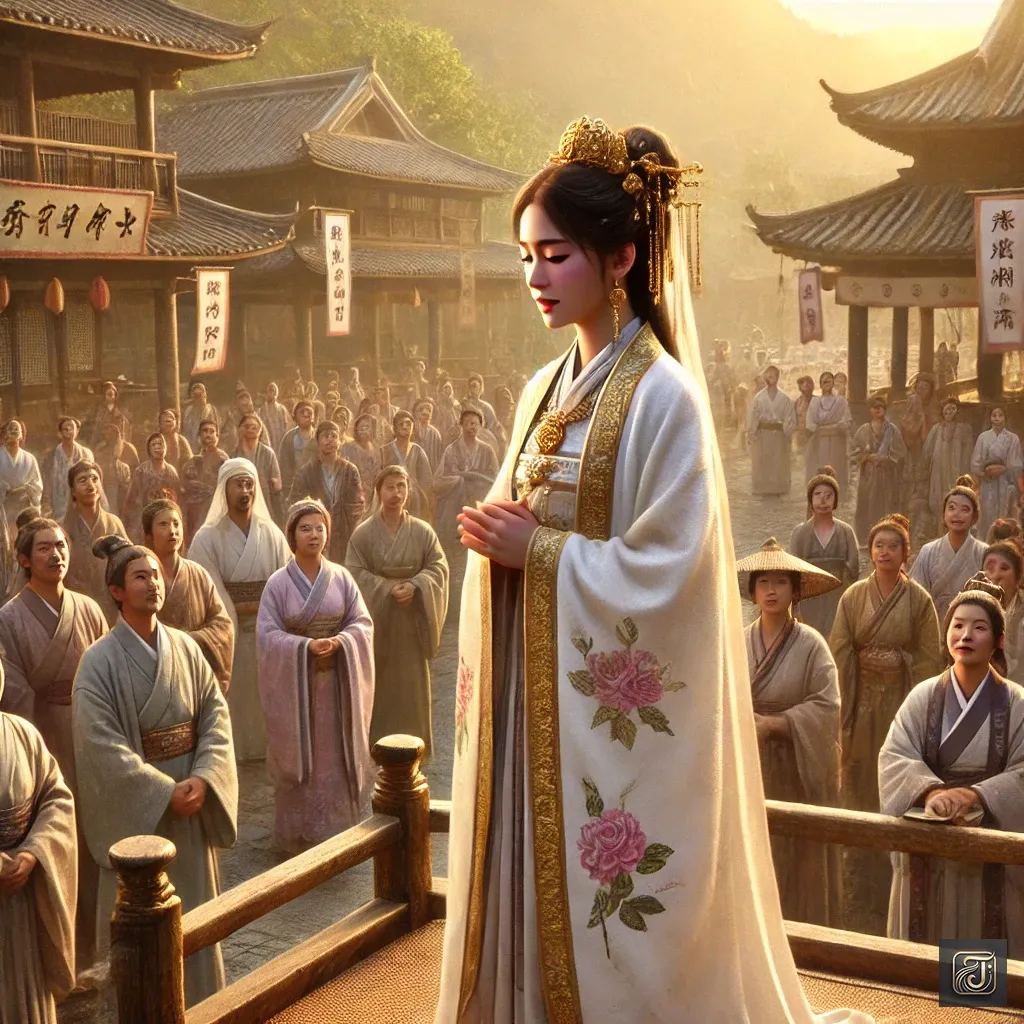
Standing atop the ceremonial platform, Iyo’s figure evoked memories of the late Himiko.
Silently, she raised the sacred mirror before her and gazed out over the assembled people.
Iyo:
“I will carry on Lady Himiko’s will and protect this nation alongside the gods.”
“I vow to never again let this peace be lost.”
Though her voice trembled, it resonated deeply within the hearts of the people.
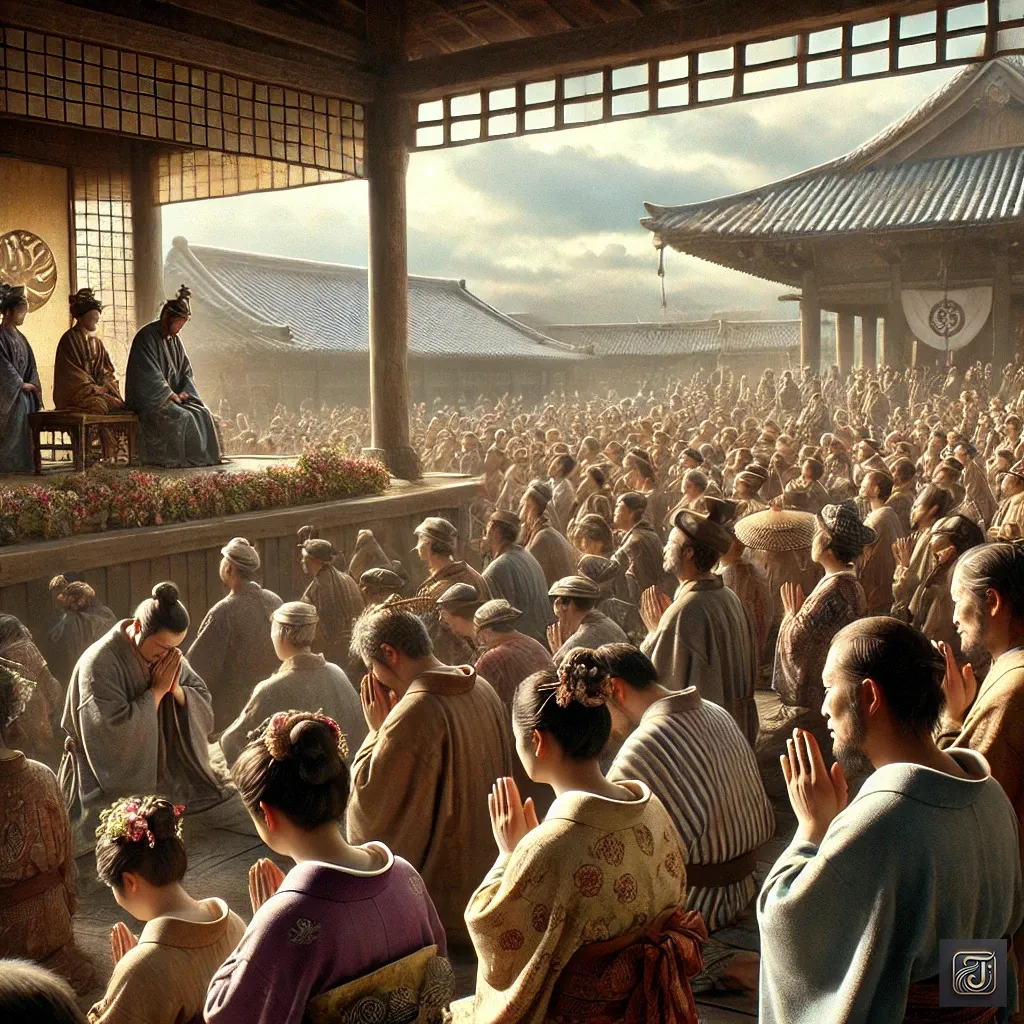
Many shed tears, feeling that Iyo had become a new beacon of hope for the nation.
In that moment, Iyo thought she could hear Himiko’s voice.

Himiko:
“Iyo, you can do it. The gods are watching over you.”
Iyo responded in her heart.
Iyo:
“Thank you, Lady Himiko.”
“I will protect this nation.”
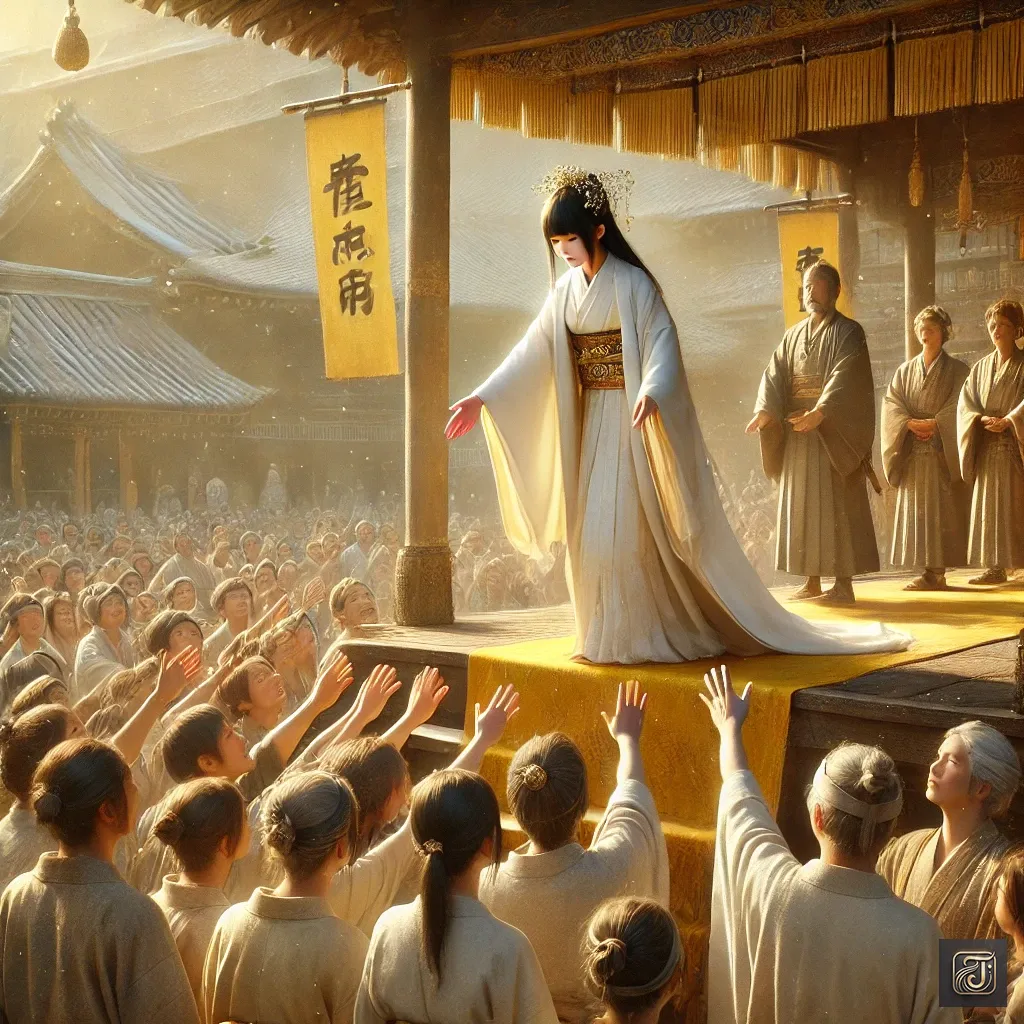
As Iyo descended from the platform, many people reached out their hands to her.
Feeling the warmth of their touch, she was reminded once again that she was not alone.
The Background of Iyo’s Ascension
1. Bloodline Ties to Himiko
As a member of Himiko’s lineage, Iyo naturally garnered support from the people, who saw her as a continuation of Himiko’s legacy.
2. Expectations for a Female Leader
Himiko’s reign had brought peace and stability, leading to a renewed desire for a spiritual female leader who could replicate that success.
3. Youth and Flexibility
At just 13 years old, Iyo’s youth positioned her as a neutral figure, untainted by prior power struggles. This neutrality likely made her an agreeable choice among competing factions as a symbol of compromise and unity.
Summary
Iyo officially ascended to the throne, becoming a beacon of hope for the people.
Her resolve laid the foundation for guiding the nation toward peace and stability.
Final Chapter: Iyo, Keeper of the Legacy
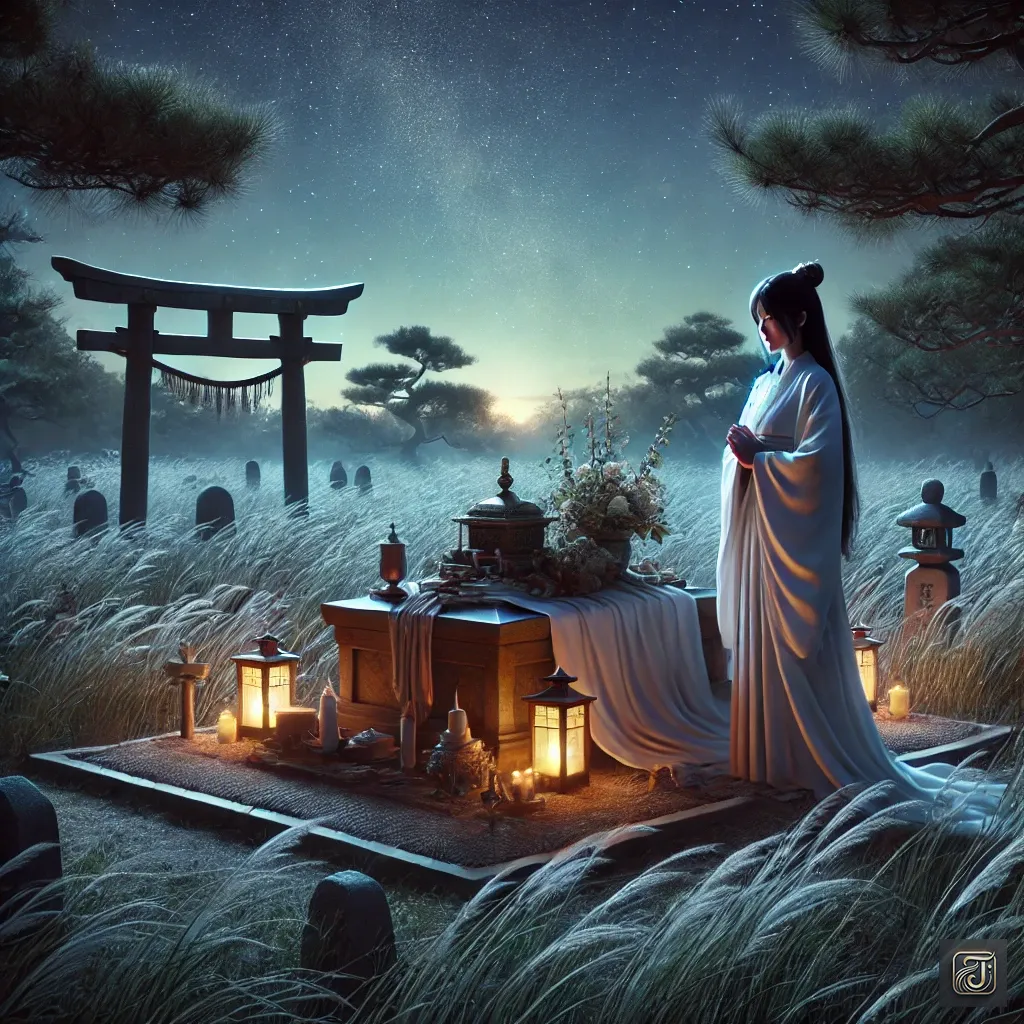
On a quiet evening, under a night sky filled with countless stars, Iyo stood before Himiko’s grave.
The grass swayed gently in the breeze, and the distant murmur of a stream could be heard.
Kneeling down, Iyo bowed deeply and clasped her hands in prayer.

Iyo:
“The peace and smiles you brought to the people… I will now be the one to carry that forward.”
Iyo said softly, her voice filled with gentle resolve.
Iyo:
“To be honest, I am still inexperienced, and I don’t have the confidence to lead the nation as you did.”
“Even so, I will carry your legacy in my heart and take each step forward, little by little.”
“I will strive to make this land a place where everyone can be happy again, just as it was during your time.”
Iyo lifted her head and gazed quietly at the grave.
The moonlight gently illuminated the site, its soft glow wrapping around her like a comforting embrace.

Iyo:
“Please, watch over me.”
“With your guidance, I can face any challenge that comes my way.”
“And I will do everything in my power to ensure this nation is never consumed by conflict again.”
A single tear traced down her cheek.
Yet her expression was serene, filled with hope and determination.
Iyo rose to her feet and stretched her arms toward the night sky, embracing the vast expanse above her.

Iyo:
“Lady Himiko, please rest assured.”
“I will carry on your legacy and guide this nation into the future.”
A gentle breeze swept through, stirring Iyo’s long hair.
In that breeze, she thought she could hear a tender voice—Himiko’s voice.
Iyo:
“Iyo, you will be fine. The gods are watching over you.”
Iyo smiled, her heart steady with newfound confidence, and once more, she brought her hands together in prayer before the grave.
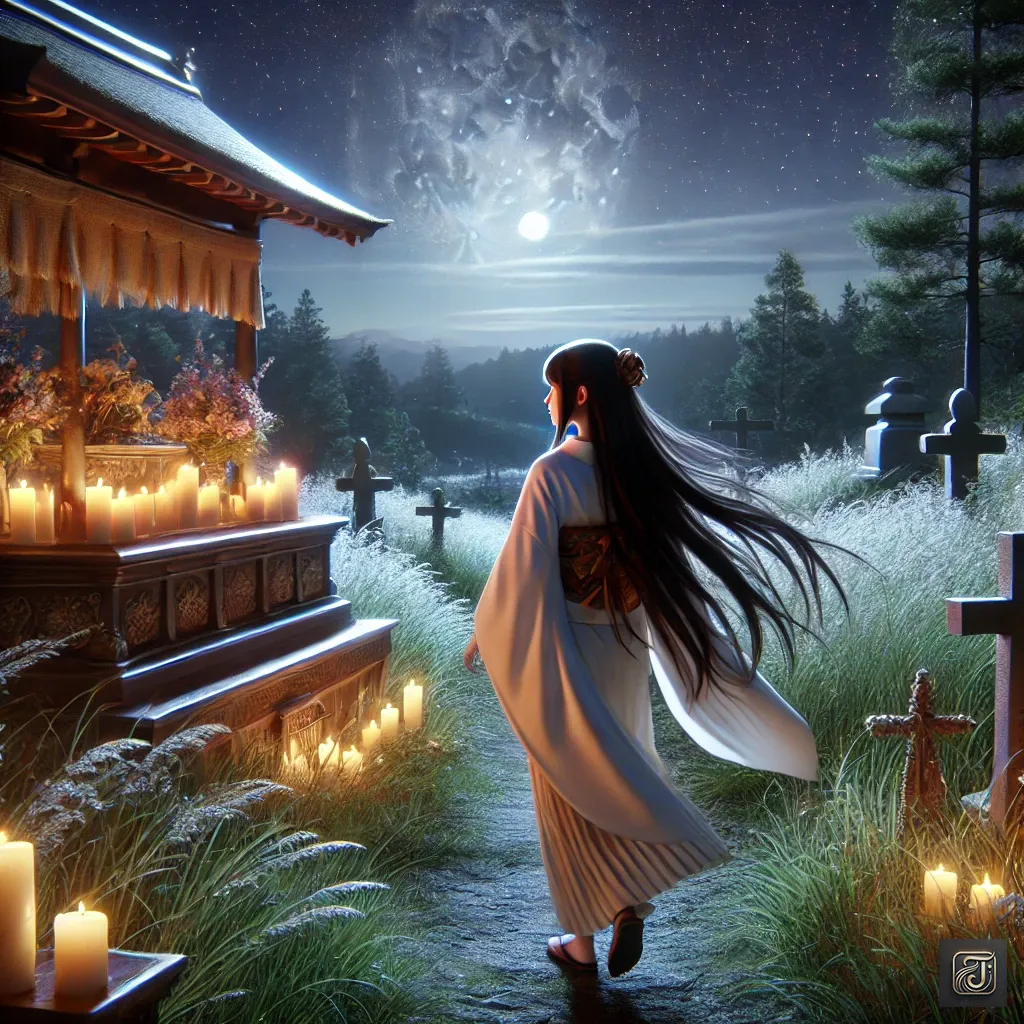
Iyo:
“Thank you, Lady Himiko.”
“I will never forget your legacy.”
“And I will make this nation the peaceful place you always wished it to be.”
She turned and began to walk away slowly.
Her back, illuminated by the soft moonlight, seemed to carry the very spirit of Himiko—strong, gentle, and radiant with hope.
Epilogue: A Fusion of History and Legend
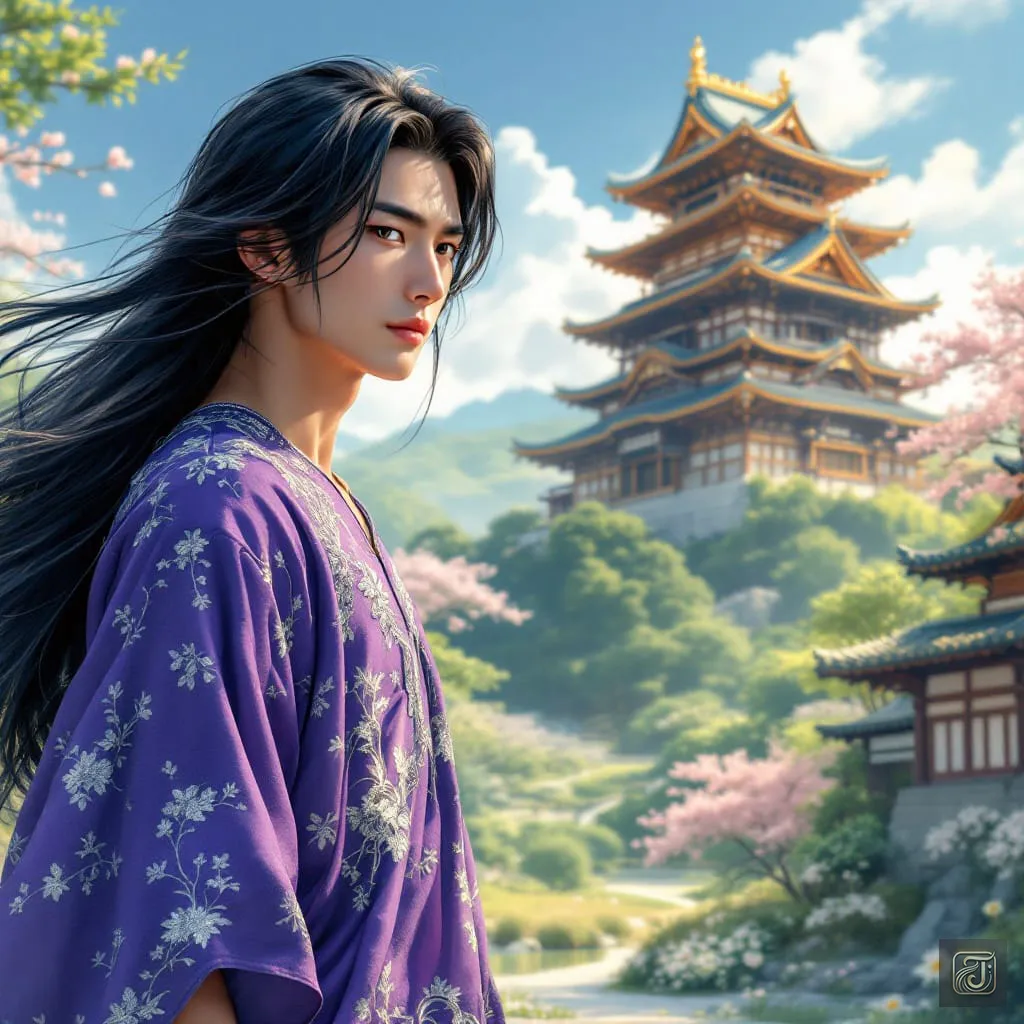
Afterword by the author Fuji
Himiko’s Story: A Blend of Actual History and Fiction
This tale of Himiko reaffirms her role as a spiritual leader in ancient Japan while blending historical facts with fictional elements.
The historical existence of Himiko is documented in the Wei Zhi Woren Zhuan (Records of Wei: Accounts of the Wa People),
a Chinese chronicle. It describes her as a shaman queen who ruled Yamatai,
conveyed the voice of the gods, and sent emissaries to Wei, earning the title Queen of Wa, Friendly to Wei.
However, specific details about her personal character, her relationship with her brother,
or other nuances of her reign remain shrouded in mystery.
In this narrative, Himiko’s reign is brought to life with imagined episodes of collaboration with her brother and her conflict and reconciliation with Inaba, a leader of a neighboring state.
While fictional, these elements aim to make her story more relatable and to highlight her spiritual leadership and diplomatic significance.
The internal strife following Himiko’s death and the ascension of Iyo as her successor are based on historical accounts.
Iyo’s existence is also recorded in the Wei Zhi Woren Zhuan, which states that after Himiko’s death, Iyo restored stability to Yamatai.
By merging fact with fiction, this story seeks to offer readers a deeper understanding of ancient Japanese history.
It is my hope that this work contributes to a greater appreciation of Himiko as a remarkable female leader.
As this narrative suggests, history often becomes more vivid when interwoven with fictional interpretations.
Himiko’s spiritual power and diplomatic acumen left an indelible impact on the Wa Kingdom.
Her legacy continues to inspire, carried forward as a timeless wish for peace and unity.
If you found this article helpful or enjoyable, please consider supporting me with a cup of coffee! 👈Click☕🙏
I’m a passionate blogger who loves diving deep into human history and sharing captivating stories about remarkable figures and events from the past.
My blog combines engaging storytelling with beautiful illustrations, making history accessible and enjoyable for everyone.
Currently, I write my blog while managing a full-time job.
Balancing both limits the time I can dedicate to research, writing, and illustrations.
With your support on Ko-fi, I can reduce the time spent on my main job and focus more on blogging, allowing me to increase the frequency of updates and bring you even more captivating stories.
Whether it’s a one-time coffee or a regular contribution, every bit goes directly into making history engaging and fun for my readers.
Thank you for joining me on this journey through time.
Let’s uncover the past together!
If you found this article insightful, please consider supporting me with a cup of coffee! 👈Click☕🙏

Author: Fuji
Human history is truly complex, isn’t it?
There are countless websites introducing historical figures and events,
But many of them are just plain explanations—not exactly exciting to read.
On the other hand, reading books takes a lot of time and effort.
That’s where I come in.
Through “stories that are more engaging than explanations and shorter than books,”
I aim to bring the world’s history and humanity’s records to you in a more accessible and interesting way.
If my stories inspire you to love history a little more, I’d be absolutely thrilled!



Comment